








GENERAL ENQUIRIES
T: +353 61 204300
W: www.mic.ie
ADMISSIONS ENQUIRIES
Mary Immaculate College south Circular road, Limerick, Ireland
T: +353 61 204348
E: taughtProgrammes@mic.ul.ie
MIC RESEARCH AND GRADUATE SCHOOL OFFICE
John Henry Newman Campus
T: +353 61 204318
E: rgso@mic ul ie
INTERNATIONAL OFFICE
T: +353 61 204988
E: International@mic.ul.ie
the university of Limerick accredits MIC's Ba, B ed, graduate diploma and postgraduate degree programmes.
MIC offers full-time, part-time, distance and blended learning taught and research postgraduate programmes
POSTGRADUATE STUDY INFORMATION SESSIONS
Please see the MIC website for an up-to-date schedule of postgraduate information sessions, which will be a mix of on-campus and virtual events
the MIC Limerick open day in January, will also be an opportunity to learn more about postgraduate study at MIC
NEWSLETTER
to stay up to date with all the latest news on postgraduate study at MIC subscribe to our newsletter at www mic ul ie/mic-postgraduatenewsletter
MIC Limerick MIC ThurlesMary Immaculate College, founded in 1898, is a university-level College of Education and the Liberal Arts, academically linked with the University of Limerick. The College is a multicampus institution, with a student population of over 5,000, enrolled in undergraduate programmes in Education, Liberal Arts, Theatre Studies and Early Childhood Care and Education, as well as a a range of postgraduate programmes at Diploma, MA and Doctoral (PhD) levels.
Is Coláiste tríú leibhéal Oideachais agus na nD án ag leibhéal ollscoile é Coláiste Mhuire Gan Smál, Luimneach, a bunaíodh in 1898, atá nascaithe go hacadúil le hOllscoil Luimnigh. Is institiúid ilchampais é an Coláiste, le daonra de bheagnach 5,000 mac léinn cláraithe ar chláir a phléann le Bun- oideachas, le hIar-bhunoideachas, leis na D ána agus le Cúram agus le hOideachas na Luath- Óige, mar aon le réimse de chláir iarchéime ag leibhéal an Dioplóma, na Máistreachta agus na Dochtúireachta
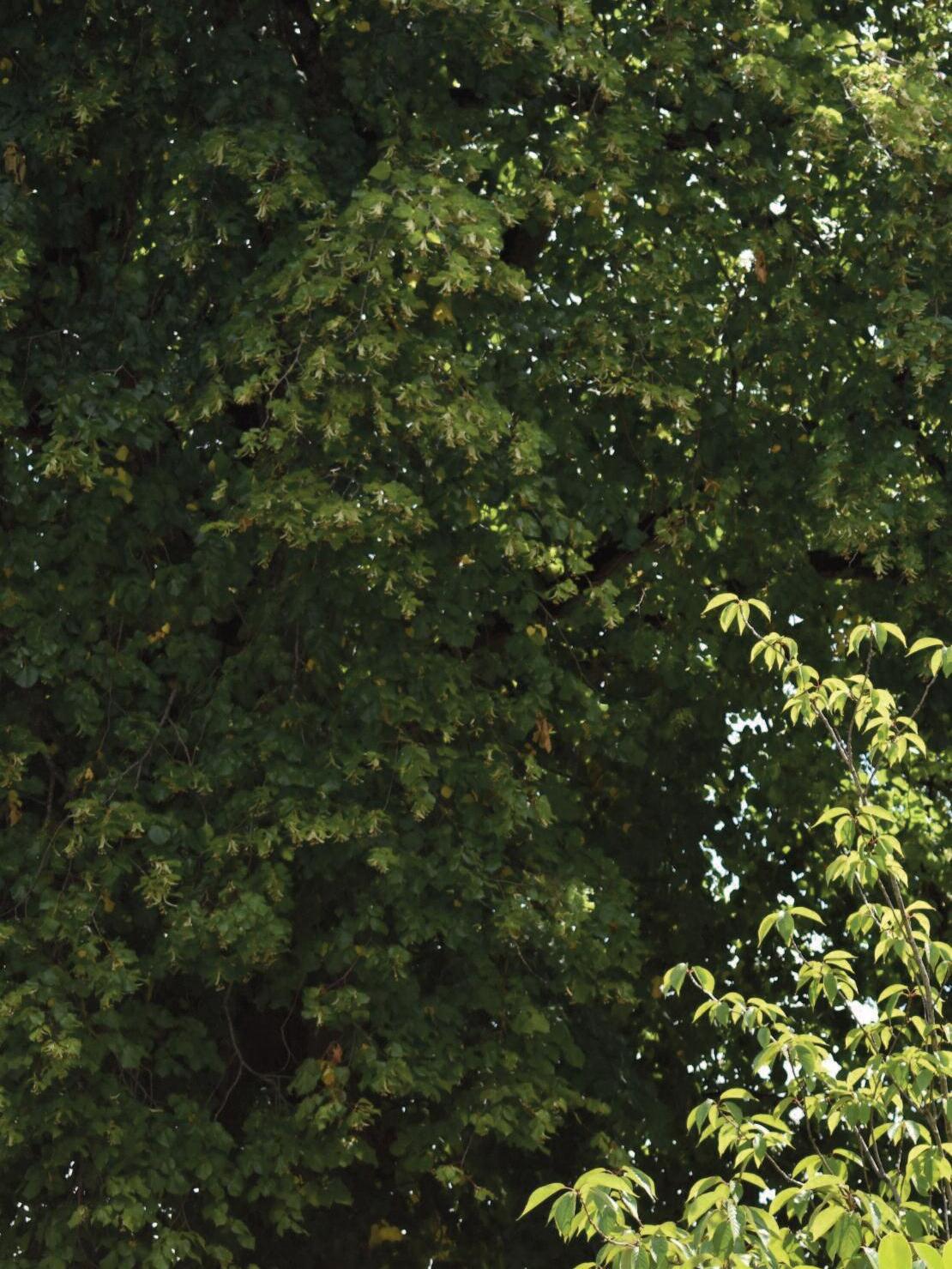
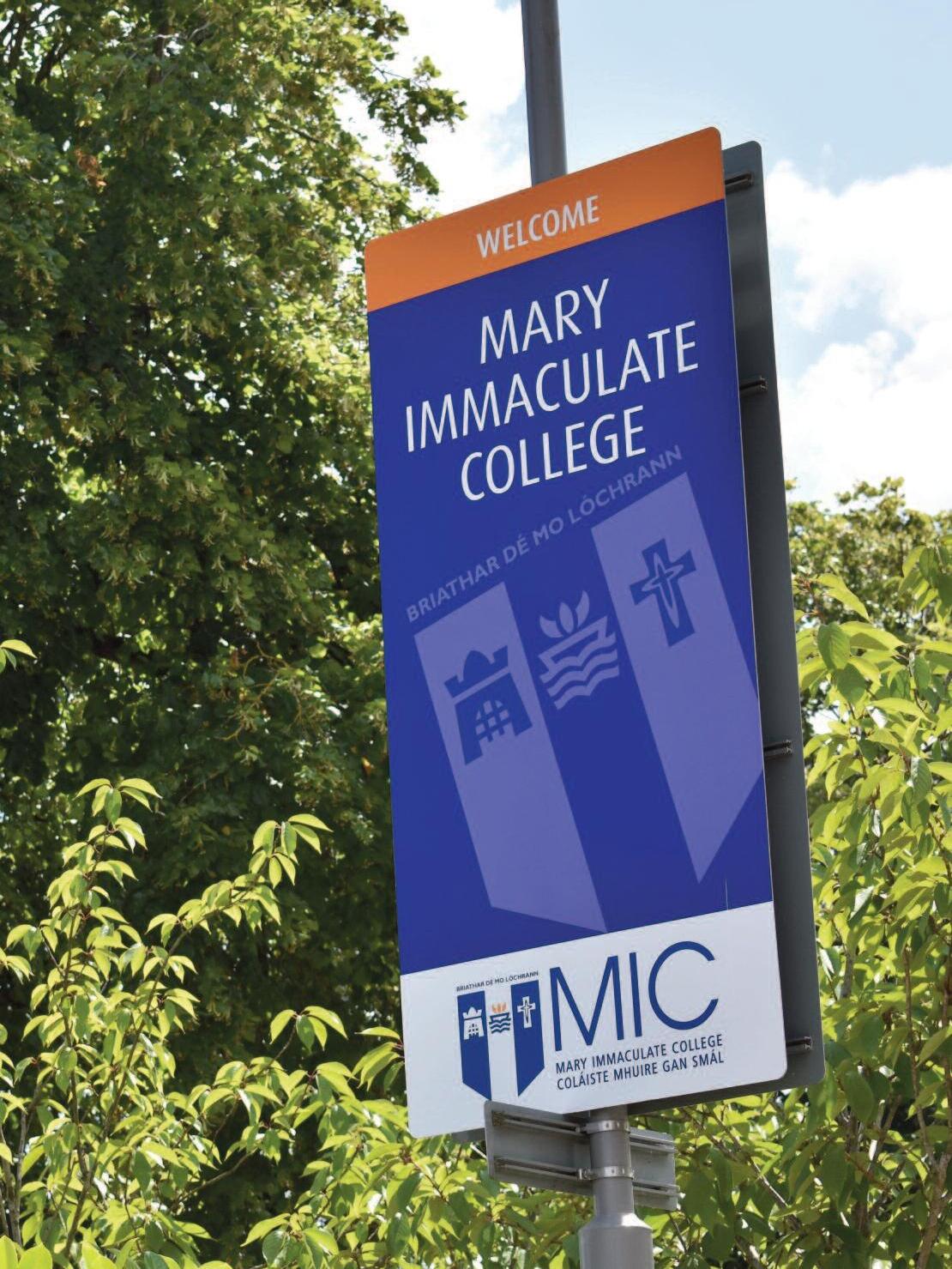

With a reputation for excellence in teaching, learning and research Mary Immaculate College (MIC) is a hub of academic distinction and is known for the high calibre of students it has attracted since its establishment over a century ago the most distinctive aspect of student life at MIC is the emphasis placed on providing students with a range of supports and opportunities that correspond to their individual and diverse needs, enabling them to enjoy a rich and rounded learning experience
the high standard of achievement of MIC graduates is maintained year on year, with our alumni being widely recognised as valuable contributors to all areas of social, cultural and professional life around the world, inspired by the College’s entreaty to ‘Make a difference ’
recent capital investment programmes have enabled the reshaping and development of the campus into an estate of great beauty with class-leading facilities that include tailteann, our award-winning multi-purpose sports complex, tara – a teaching and research building that includes a specially-designed students’ union hub, student medical facilities, purpose-built lecture theatres, extensive computer facilities and language laboratories. It also houses the 510-seat Lime tree theatre that welcomes an array of local, national and international productions placing MIC at the cultural heart of Limerick City.
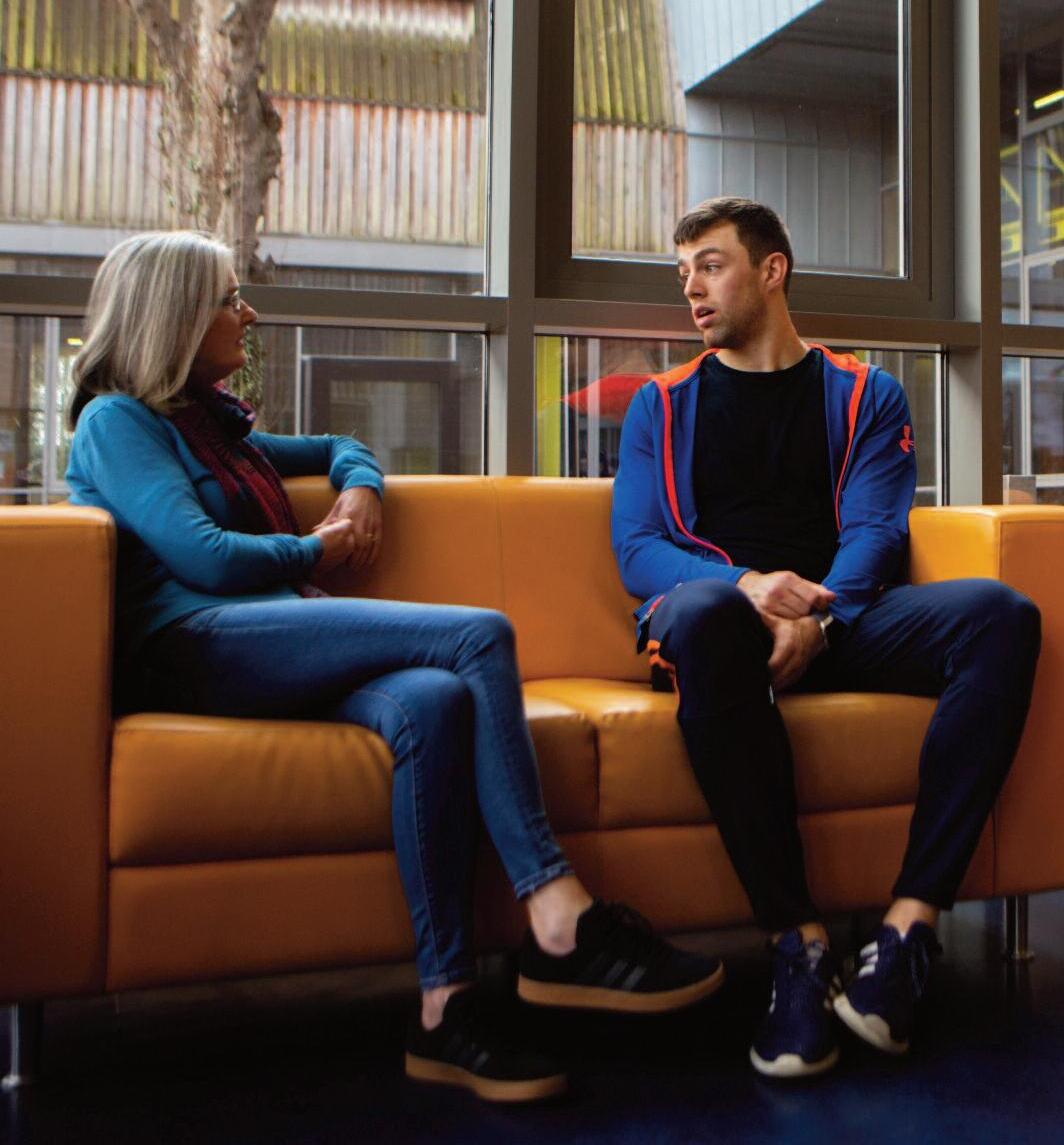

MIC Limerick is situated in the southern suburbs of Limerick City, the third largest city in the republic of Ireland with a population of over 80,000 our leafy campus with state-of-the-art facilities is within 10 minutes walking distance of the city centre, providing easy access to all cultural and social amenities, as well as the main rail and bus terminus.
With three institutions of higher education and a combined student population of almost 25,000, Limerick is a bustling, vibrant and exciting city. there are cinemas, nightclubs and a range of bars and restaurants to enjoy with friends. Limerick will provide you with plenty of opportunities for a great social life.
In 2014 Limerick was designated Ireland’s first ‘National City of Culture’ and in 2016 was a short-listed Irish candidate city for european Capital of Culture 2020. the city offers a variety of historical, artistic and theatrical activities. Indeed, the magnificent Lime tree theatre, in the College’s tara building, hosts a range of performances from national and international theatre, dance, opera and ballet companies, to live musical and comedy performances.
Limerick is also the sporting capital of the Munster region and is unique in having a strong tradition and success in both gaelic games and rugby. Fans can tour the spectacular thomond Park stadium, which includes an interactive museum that showcases the proud history and heritage of Munster rugby.
Limerick City will provide you with the complete student experience.
www.limerick.ie/study

MIC thurles is located in the heart of thurles town – a vibrant and prosperous town on the river suir nestled in the heart of the beautiful suir Valley our thurles Campus offers undergraduate post-primary teacher education programmes, postgraduate programmes, great facilities with en suite accommodation and sports grounds
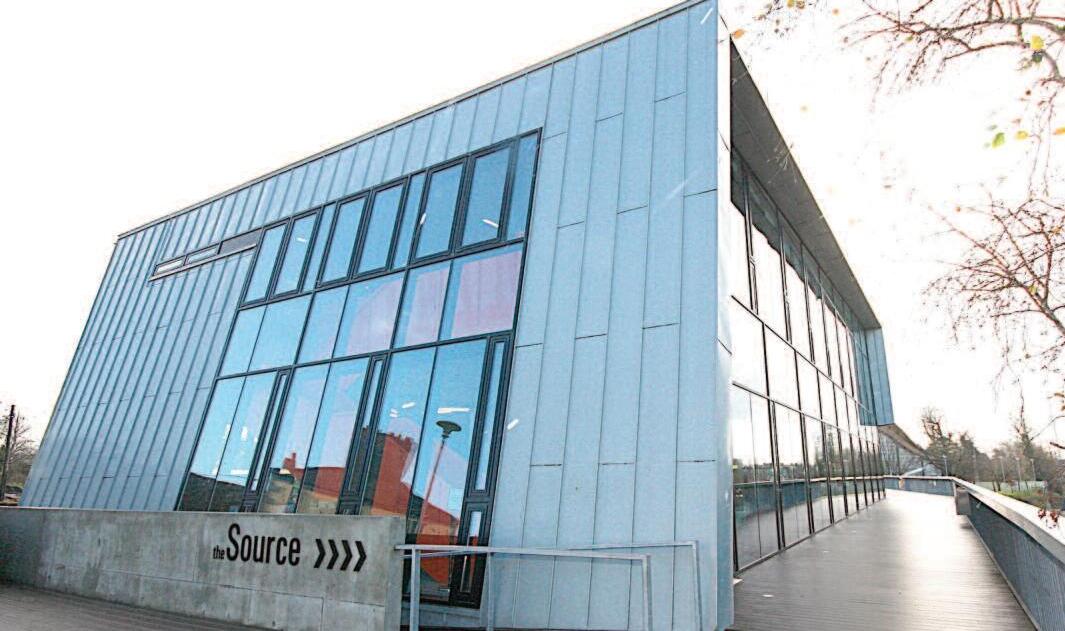
With a population of over 8,000 people, thurles is a thriving hub of shops, businesses and cultural attractions with great transport links as part of the thurles town Centre renewal strategy a suite of measures will be implemented at a community, local business and local authority level over the next decade the revitalisation of the thurles Market Quarter as an integrating community hub, supporting and promoting local business and producers, and third-level institutions like MIC thurles, will be at the heart of the strategy
thurles town offers a wide variety of facilities, including two historic museums - the thurles Famine and War Museum and Lár na Páirce Museum of the gaa and gaelic games thurles is the birthplace of the gaelic athletic association, founded in 1884 in Hayes Hotel the town is also home to semple stadium, Ireland's second largest sports arena with a capacity for 60,000 people, second only to Croke Park stadium, dublin thurles boasts many excellent cultural and recreational facilities including the source arts Centre, tipperary’s most exciting cultural and entertainment venue presenting music, dance, comedy, film, children's events, visual art and more Horse and greyhound racing, soccer, rugby, cycling, golf, angling, hockey and swimming are all catered for
Live and learn in this great town in the heart of tipperary that offers students a unique college experience
www.thurles.ie
Mary Immaculate College, Limerick, founded in 1898, is a third-level Catholic College of education and the Liberal arts the College community promotes excellence in teaching, learning and research at undergraduate and postgraduate levels It seeks to foster the intellectual, spiritual, personal and professional development of students within a supportive and challenging environment that guarantees the intellectual freedom of staff and students In particular, the College seeks to foster in its students a spirit of justice and compassion in the service of others, together with an openness to the religious tradition and values of each individual the College promotes a sense of identity enriched by an awareness of its Catholic tradition, the cultures, languages and traditions of Ireland, and its special commitment to the Irish language Mary Immaculate College respects cultural diversity It strives to promote equity in society and to provide an environment where all have freedom and opportunity to achieve their full potential
Is Coláiste Caitliceach tríú leibhéal oideachais agus saorealaíon é Coláiste Mhuire gan smál, Luimneach, a bunaíodh in 1898
Cuireann pobal an Choláiste ardchaighdeán feabhais chun cinn ó thaobh múinteoireachta, foghlama agus taighde ag an leibhéal céime agus iarchéime déantar iarracht forbairt intleachtúil, spioradálta, phearsanta agus ghairmiúil na mac léinn a chothú laistigh de thimpeallacht chabhrach agus dúshlánach a chuireann saoirse intleachtúil na foirne agus na mac léinn chun tosaigh tá sé mar aidhm ag an gColáiste, go háirithe, cothrom na féinne agus ómós a chothú ina chuid mac léinn, agus iad ag freastal ar dhaoine eile, chomh maith le bheith oscailte do na traidisiúin agus do na luachanna reiligiúnacha a bhíonn ag gach duine aonair Cuireann an Coláiste féinaithne chun cinn a bhfuil traidisiún Caitliceach an Choláiste mar chuid shaibhir di, chomh maith le cultúr, teangacha agus traidisiúin na hÉireann agus tiomantas speisialta an Choláiste don ghaeilge tá omós ag Coláiste Mhuire gan smál d’éagsúlacht cultúir oibríonn an Coláiste chun cothromaíocht a chur chun cinn sa tsochaí agus chun timpeallacht a chur ar fáil ina mbeidh an tsaoirse agus an deis ag gach duine a gcumas iomlán a bhaint amach
MIC is a long-established provider of postgraduate programmes in education and Liberal arts at diploma, Masters and doctoral (Phd) level. grounded in decades of research and scholarship, our College offers postgraduate students experienced, responsive and tailored research supervision and mentoring Practical supports include funding through scholarships, academic assistantships and career development support schemes the research & graduate school provides a first-class community of research practice for academic staff and postgraduate students alike within our purpose-designed research and study facilities at the John Henry Newman Campus in Limerick.
Postgraduate students at MIC can enjoy the traditional centuries-old doctoral supervision, seminar and colloquium learning format alongside innovative online and blended learning delivery systems, master classes and summer schools experienced research supervisors provide the knowledge-base, discipline skills, management-craft, commitment and academic instincts that help our students to succeed in graduate education and research. MIC systematically builds for student success and wellbeing, incorporating a wide range of transferable skills in areas such as academic writing, project management, research integrity and ethics, distributed leadership, and presentation and conference skills. student progress is supported through routine panel-based periodic review and progression markers
at MIC, postgraduate students can expect to find a research office and a graduate school that provides full academic administration services for all research students; a postgraduate induction service; personalised research support for all researchers; research mentoring and information sessions; financial schemes for research support, conferences/networking and up-skilling; a digital open access repository (MIrr) for postgraduate researchers’ publications; and a research ethics board (MIreC) for ethics clearance where required to help postgraduate students manage the cost of postgraduate research, our College offers certain funding support mechanisms, including departmental assistantships and meritbased postgraduate research awards schemes and scholarships
the postgraduate community at MIC continues to grow and diversify with students from Ireland, the uK and the eu studying alongside students from countries as diverse as armenia, Brazil, Cameroon, Canada, China, Morocco, Nigeria, saudi arabia and tanzania, among others.
thank you for considering our postgraduate programmes at Mary Immaculate College and we look forward to meeting you here in the research & graduate school campus in due course.
Professor Michael Healy, Vice President for research on behalf of the MIC research & graduate school team
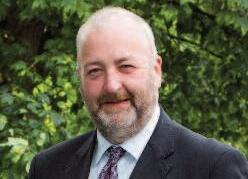
MIc's research & graduate school supports postgraduate students with funding and other practical resources during their studies. Within our dedicated, purposeful research hub in the John Henry newman campus in Limerick city, we provide postgraduate students with their own exclusive study spaces, Ict facilities, access to their tutors and proximity to postgraduate administrators. the John Henry newman campus comprises a landmark 19th century building covering approximately 4,000 square meters containing a variety of workspaces for staff and postgraduate research activities.
PostgrAduAte reseArcH suPPort At MIc
the research & graduate school provides the following key services:
• Vibrant research environment
• tailored academic supervision for each candidate
• access to research resources and professional development opportunities
Peer-to-peer interactions
• demanding, but fair, academic standards
the research & graduate school provide the following resources:
• Financial supports
• Professional development guidance
Coaching and mentoring
• a programme of transferable skills
academic regulations and linked administrative procedures are overseen by the MIC research & graduate school students are supported by a professional team of experts in postgraduate education, including the graduate school director, the research Postgraduate Coordinator and other specialist
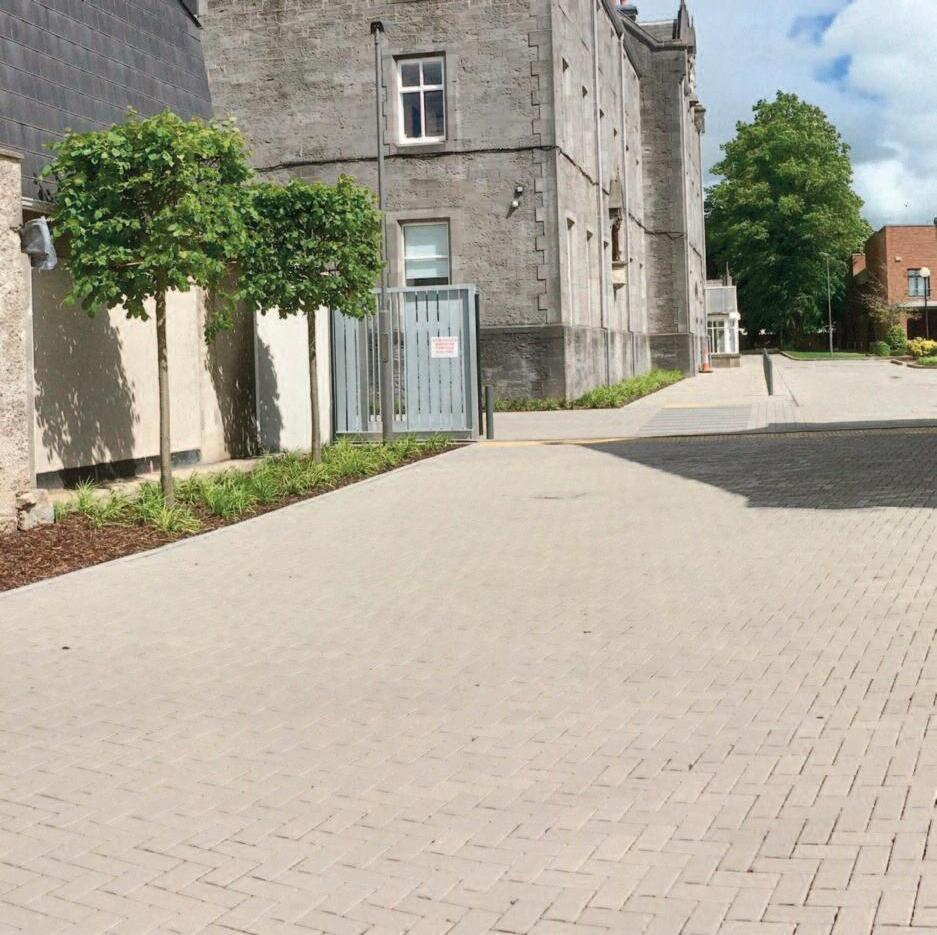
support staff this team manages the overall research experience of each postgraduate student, while the academic 'home' of each student is within the academic department of their primary supervisor academic departments and the research & graduate school work together to ensure that students are supported in their studies to the maximum possible extent the research & graduate school is overseen by the Vice President for research.
the research & graduate school at MIC is committed to supporting postgraduate researchers in developing the skills they need as researchers and in planning their careers in academia or elsewhere
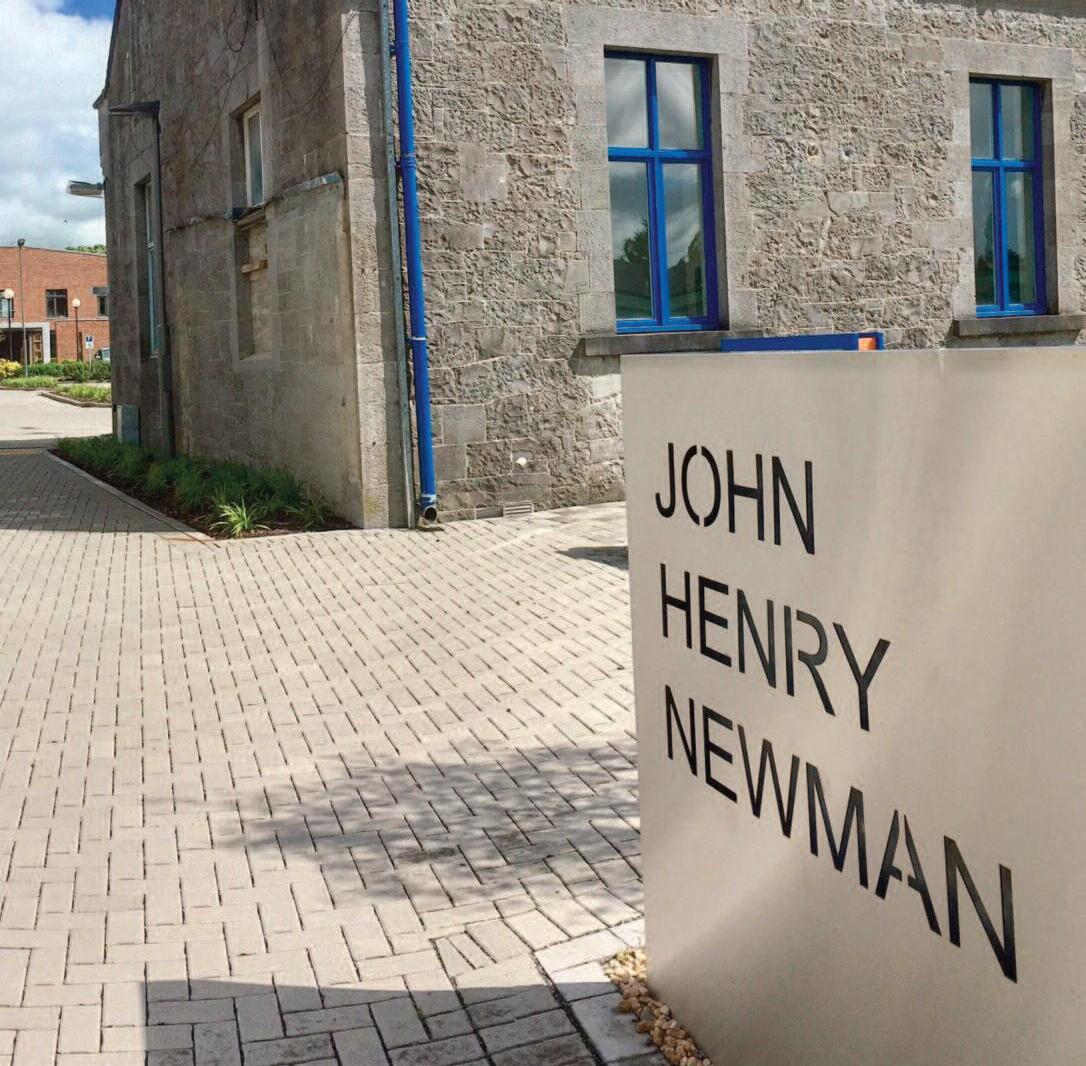
to achieve this, research skills seminars are delivered encompassing topics such as research skills development; career management; research ethics and integrity; communication skills; personal effectiveness; project management and funding application processes.
systematic seminars on thesis examination and examination by viva voce are provided to assist students with planning and preparation for degree completion.
Financial supports for students undertaking postgraduate research are critical in attracting world-class students to MIC students pursuing research postgraduate degrees are eligible to apply to the research & graduate school for several bespoke MIC awards

typically, MIC scholarships and assistantships provide a subsistence bursary for the normal registration period of benefitting students, and may also off-set tuition fees
the following postgraduate awards are made available on a competitive basis and at the discretion of the College Further details on these awards can be obtained from the research & graduate school at MIC (www mic ie/research)
MIc doctorAL AWArd
the MIC doctoral award consists of an annual stipend and a fee waiver (c. €16,900 total). awards are annually renewable for a maximum of three years with a fee waiver in the fourth year of normal registration. they are merit-based and are open to all doctoral candidates in arts or education
MIc studentsHIPs AWArds
one doctoral studentship (doctorate only) and one Postgraduate studentship (doctorate or research Masters) are offered annually Both consist of an annual stipend and a fee waiver (c €11,300 total) awards are annually renewable for a maximum of three years with a fee waiver in the fourth year of normal registration they are merit-based and are open to doctoral/Masters candidates in arts or education
MIc dePArtMentAL AssIstAntsHIPs
MIC departmental assistantships consist of an annual stipend and a fee waiver (c. €11,300 total). the departmental assistantship scheme is overseen by the research & graduate school selection is conducted locally within each academic department, which may appoint Masters or Phd students to these roles Holders are obliged to provide up to a maximum of 120 hours of assistance per annum to their home academic department awards are annually renewable for a maximum of three years with a fee waiver in the fourth year of normal registration
tHe FAItHFuL coMPAnIons oF Jesus
BursArIes - MA In cHrIstIAn LeAdersHIP In educAtIon
up to six FCJ scholarships funded by the Faithful Companion of Jesus sisters are available for the taught Master’s programme (part-time) that will commence in the summer semester of 2023 the scholarships are worth €7,050 each, covering course fees
doctorAL reseArcH scHoLArsHIP In ProFessIonAL LeArnIng For teAcHers And otHer educAtIon ProFessIonALs
the scholarship is intended to encourage research that focuses on any aspect of practitioner learning and continuing professional development including individual and collective reflection, classroom enquiry, collaborative action research and communities of practice. the potential of treX, the teacher’s research exchange, as a resource for professional learning and CPd is also of particular interest and proposals which include a focus on this are particularly welcome t-reX is an online national infrastructure for supporting engagement in and with educational research by Irish teachers, early childhood education practitioners and other education professionals
the scholarship offers a waiver of programme fees each year up to a maximum of four years plus a yearly stipend of €1,150. In addition to conducting their own doctoral research and related study, the successful candidates will contribute the equivalent of 20 service hours per year in the form of CPd provision for the benefit of their peers in the sector.
this scholarship is open to practicing primary or post-primary teachers seeking to undertake Phd studies within MIC’s school of education (PostPrimary). the scholarship provides a stipend, and a full fee waiver over four years, for Phd students conducting research in areas of school leadership and inclusive practices. the successful applicant will also be expected to provide a maximum of five hours teaching assistance per week at MIC thurles.
MIC offers an elite scholarship scheme open to those who have excelled in their chosen sport(s) the scheme, which is offered in memory of Noreen Lynch and Leonard enright, is delivered through a bursary and additional benefits and is offered at three different levels as follows:
• one gold scholarship valued at €4,000 –applications invited from current and incoming students
• two silver scholarships valued at €2,000 eachapplications invited from current and incoming students
• two Bronze scholarships valued at €1,000 each – applications restricted to incoming Cao applicants only
MIc gPA scHoLArsHIPs
two postgraduate scholarships per annum are available to members of the gPa who wish to undertake postgraduate study at Mary Immaculate College. the value of each scholarship is up to €4,600 for one year only and will be delivered through a full or partial fee waiver as applicable
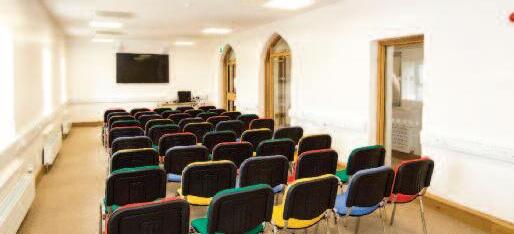
Munster LgFa funds bursaries, valued at €750 each, on an annual basis in memory of rachel Kenneally, a Bachelor of education graduate of MIC (class of 2013) rachel was a member of the College team that won the giles Cup in 2012 and also played inter-county football with tipperary she passed away after a long illness in March 2018. the bursaries are awarded to current MIC students, undergraduate or full-time postgraduate, who are involved in ladies football in Munster (playing, coaching, administration etc). applicants must be a member of a LgFa club in a Munster county.
In addition to these schemes, MIC continues to offer, in partnership with Munster gaa, a number of bursaries to students who have achieved county-level standard from minor grade upwards. Bursaries are awarded when students have registered in the College a limited number of gaa Bursaries are also provided by MIC to such students
Fees:
the MIC schedule of fees and charges is reviewed and approved on an annual basis Prospective postgraduate students should visit the MIC Fees webpage for information regarding fees. should students have any further queries they can contact the student Fees office and/or the research & graduate school.
Fees chargeable to non-eu students are determined separately Prospective non-eu postgraduate students should contact the International office and/or the research & graduate school regarding fees
Non-eu MIC doctoral award holders, studentship holders and assistantship holders are granted a full fee waiver up to the non-eu fee level. Continuance fees, where these apply, will be charged at the non-eu rate
grAnt AId: Maintenance/fees grants are available for qualifying students through the student universal support Ireland (susI) students should see the susI website for details: www susi ie
HoW to APPLy
For application forms and information on entry requirements, please go to www mic ul ie/research
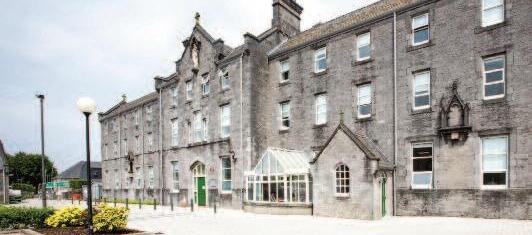
For further details contact:
dr Julianne stack
graduate school director
t: +353 61 774792
e: Julianne.stack@mic.ul.ie
Or
dr rebecca Breen
research Postgraduate Coordinator
t: +353 61 204552
e: rebecca.Breen@mic.ul.ie
Or
research & graduate school office
t: +353 61 204318
e: rgso@mic ul ie
W: www.mic.ul.ie/research
Mission statement: giving you a voice, helping you to use it, enriching your college experience.
Mary Immaculate College students’ union (MIsu) provides support, representation and services to its members, the students of MIC.

students are represented by the elected MIsu executive Committee officers
MISU aims to:
• give students a say in their own student/college life; Protect and represent students in academic and non-academic matters; Create a positive college experience for students;
• Help new students integrate into college life; and
• Facilitate extra-curricular activities for students.
MISU works to achieve these aims by:
• Working together with all College departments to ensure that key relationships are developed and maintained;
• Providing assistance, information services, guidance, security and entertainment for the student population;
• Providing the best possible balance between academic and social experiences;
• Being an approachable and
welcoming point of contact for students, even if it’s just for a chat!;
• encouraging increased student participation in extracurricular activities; and
• Improving the College’s physical environment
some of the events organised by MIsu include orientation and Freshers' Week entertainments, weekly club nights during the semester, rag Week, Clubs and societies days, Clubs and society awards, as well as student gigs
CLUBS AND SOCIETIES
the running of clubs and societies at MIC forms a significant part of the work of the MIsu the union promotes and coordinates the activities of clubs and societies and stimulates the growth of new societies. Clubs and societies are a great way of meeting new people in college, providing an opportunity to mix with likeminded individuals New members are always welcome and students are encouraged to
set up new clubs and societies, ensuring there’s something for everyone there’s a place for anyone who would like to get involved, whether you’re a beginner or an expert some of the clubs and societies on offer in MIC are:
clubs: Hurling, Camogie, gaelic Football, equestrian, rugby, soccer, Badminton, Basketball
societies: Cumann gaelach gan smál, dramatic arts (MIdas), Creative Writing, dance (MIdance), International society, LgBt, trad Music, sVP, Positive Mental Health, Live Music, traditional Irish dance
Further Information:
W: www misu ie
F: @maryistudentsunion
I: @maryistudentsunion
t: @maryisu
s: @maryisu
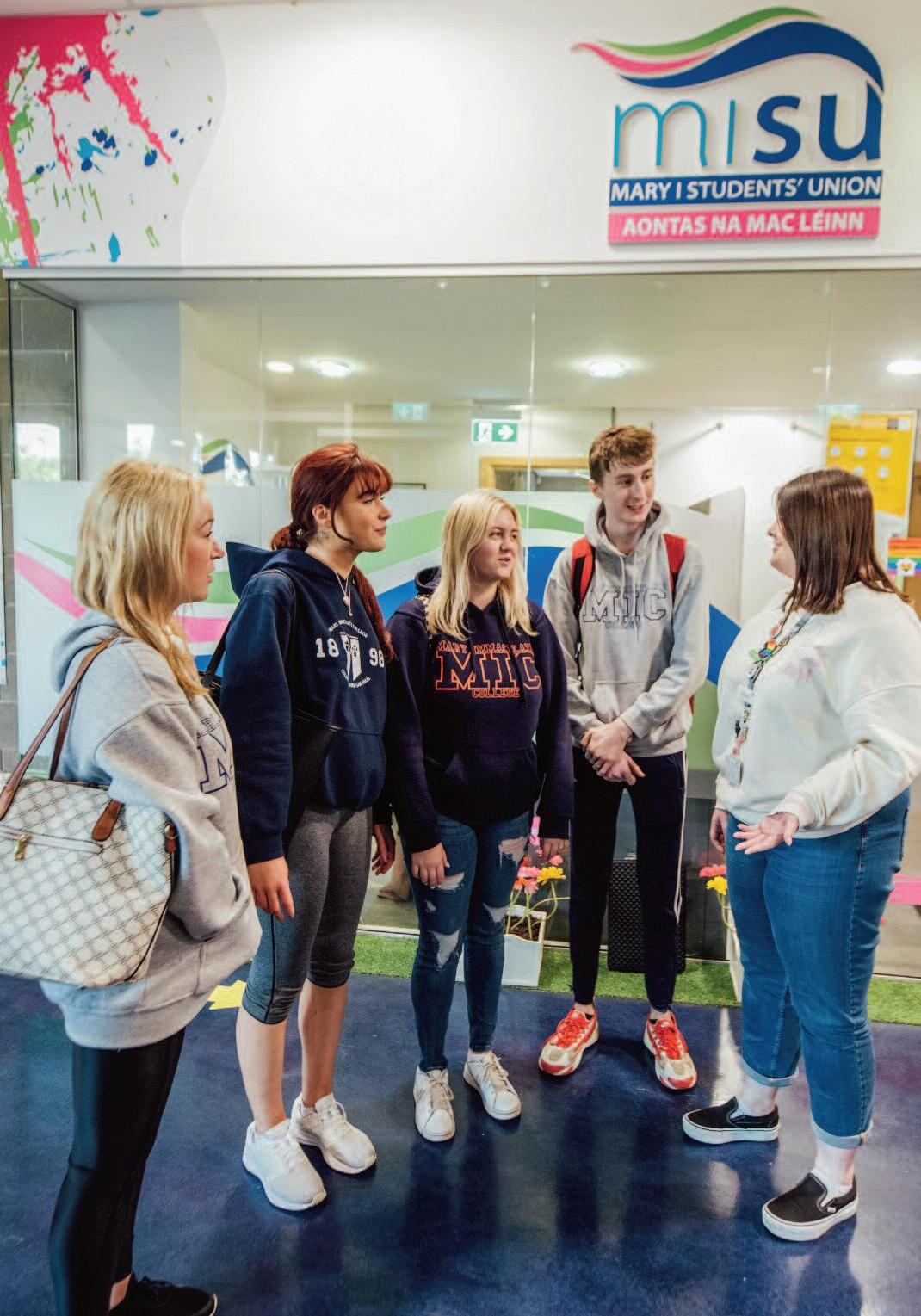
tá cáil na gaeilge ar Choláiste
Mhuire gan smál agus is cuid de shaol laethúil an Choláiste í ar an taobh acadúil agus ar an taobh sóisialta de tacaíonn polasaí dátheangach an Choláiste le deiseanna a chothú chun leas a bhaint as an ngaeilge mar ghnátth-theanga chumarsáide i measc phobal an Choláiste, idir bhaill foirne agus mhic léinn
FOIRGNEAMH NA
LEABHARLAINNE
Ionad Cruinnithe, Ionad Ceoil agus Rince, Ionad Seolta Leabhar, Seomra Ranga
Is spás é seo inar féidir le foireann agus le mic léinn an choláiste teacht le chéile chun gaeilge a úsáid ar bhonn neamhfhoirmeáilte; is féidir teacht isteach agus cupán tae/caifé a dhéanamh, labhairt le do chairde, éisteacht le ceol, agus mar sin de tá an seomra Caidrimh i bhfoirgneamh na leabharlainne ar champas an Choláiste eagraítear clár cuimsitheach d’imeachtaí do bhaill foirne agus do mhic léinn. ritheann mac léinn Ba ar socrúchán oibre an seomra ar bhonn laethúil agus iad sásta aon chabhair gur féidir a thabhairt do chuairteoirí a thagann go-dtí an seomra.
this informal space in the Library is used by the entire
College community (both students and staff) to improve their language skills, attend various social events and generally enjoy the strong Irish language and cultural tradition that exists in MIC. the room is run on a daily basis by a Ba student on Year 3 placement who is only too happy to help all who visit an seomra Caidrimh
suíomh/Location: L213 sa leabharlann
uaireanta oscailte/opening
Hours: 9am-5pm (nó níos déanaí ag brath ar imeachtaí/ or later when events are on)
déan teagmháil linn:
t: +353 61 204122
r: seomraCaidrimh@mic.ul.ie
Nó déan teagmháil le Caitríona Breathnach, oifigeach na gaeilge ag:
r: Caitriona Breathnach@mic ul ie
t: +353 61 204548
SEACHTAIN NA GAEILGE –GACH MÁRTA
Cuireann seachtain na gaeilge úsáid na gaeilge agus an chultúir ghaelaigh chun cinn mar chuid d’fhéile a reáchtáiltear i mí na Márta gach bliain tagann oifig each na gaeilge, an séiplíneacht, an oifig um Chothú sláinte, mar aon le haontas na Mac Léinn agus
ranna acadúla eile le chéile chun seachtain lán le ceol, craic agus comhluadar a eagrú, leis an seomra Caidrimh mar cheannáras na n-imeachtaí
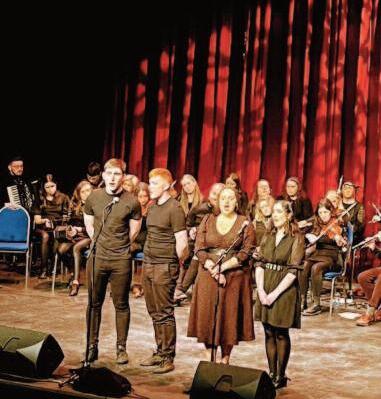
CUMANN GAELACH GAN SMÁL
Ní gá a bheith líofa chun a bheith linn - an Cumann aims to provide an opportunity and a meeting place for those students who have an interest in speaking, improving their knowledge of, or learning Irish
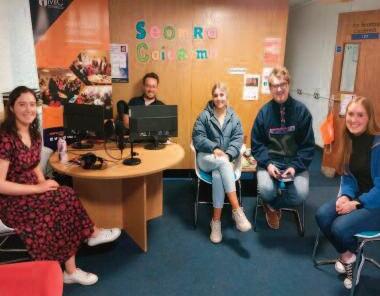
BORD NA GAEILGE
tá Bord na gaeilge sa Choláiste freagrach as moltaí a dhéanamh don Údarás rialaithe maidir le forbairt a dhéanamh ar úsáid na gaeilge sa Choláiste i gcoitinne i saol oifigiúil, acadúil agus i measc mic léinn an Choláiste, chomh maith le polasaí dhátheangach an Choláiste a chomh-líonadh. tá ballraíocht ag idir mhic léinn agus bhaill foirne ar Bhord na gaeilge agus reachtáiltear cruinnithe go rialta.
the College has a vibrant tradition in the performance and visual arts there are numerous opportunities to participate in informal productions and public performances the Mary Immaculate College Choral society presents an annual concert and past highlights include performances of Haydn’s Heiligmesse, Theresienmesse and Stabat Mater, Mozart’s Requiem, Vivaldi’s Gloria and Handel’s Acis and Galatea the Choral society has also joined forces with the Limerick Choral union to present Mendelssohn’s Elijah, Puccini’s Gloria and Beethoven’s Choral Fantasia in the university Concert Hall, Limerick.
Tá an ceol traidisiúnta agus an rince faoi bhláth sa Choláiste agus is iomaí duais atá buaite ag na mic léinn i bhFéile an Oireachtais, i Slógadh agus i gcomórtais idirollscoileanna
the College has a particularly active drama society (MIdas), which celebrated its 21st birthday in 2020 and has won multiple National BICs (Board of Irish College societies) awards for Best society and Best society event MIdas produces plays and musicals, as well as organising workshops, cabarets and social events students also participate in the Irish student
drama awards (Isda). recent MIdas productions include: A Chorus Line, Les Miserables, Celebration, Closer, Disco Pigs, Starlight Express, Godspell, Seussical the Musical and CATS. the Lime tree theatre (510-seats) is situated on the Limerick campus with the Belltable (220-seats) 1km away. these professional venues play host to the best in local, national and international performing arts every season has wonderful surprises so make sure you check out www limetreetheatre ie to see what performances will be on your doorstep.
there is a very active local drama group and a thurles Musical society. the source arts Centre is adjacent to MIC thurles

Book your tickets online at www limetreetheatre ie or call to the Box office situated in the tara building.
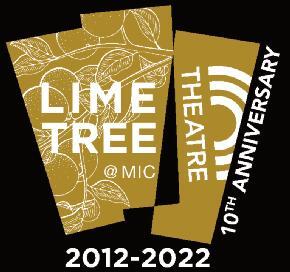
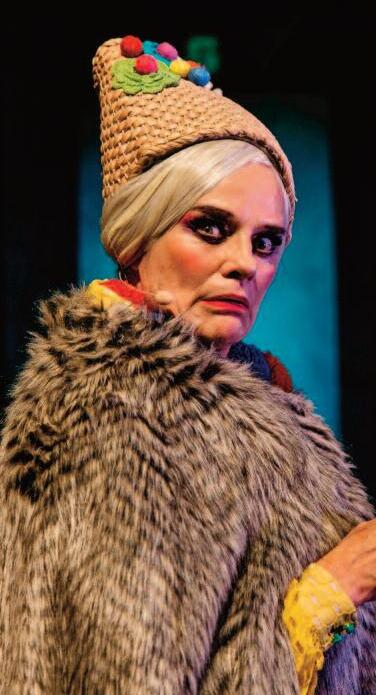
sport and recreation play an important role in the lives of students. Mary Immaculate College caters for a wide variety of sports and has an award-winning, state - of-the -art, multipurpose sports complex, tailteann.
FAcILItIes At MIc
LIMerIcK IncLude:
• Weights room
• 2 indoor soccer courts
• IBa approved basketball court
• 3 volleyball courts
• 6 badminton courts table tennis facilities
• 2 teaching gyms/dance studios
outdoors, MIc ProvIdes:
• Full-size gaa pitch
• Floodlit training pitch
• 460 metre astro turf running track
tHe ABc oF oPPortunItIes to get ActIve
Aerobics: aerobics/Boxercise/ Zumba classes take place every Monday, tuesday and Wednesday in tailteann Check with tailteann reception for updated schedules.
Badminton Club: the thriving Badminton Club meet every Wednesday and are always on the lookout for new members.
Basketball: Basketball can be played at competitive or recreational level the College's ladies team competes in the North Munster League and the Colleges’ all-Ireland League In 2017 they won the division 2 allIreland League final.
Camogie: Brian o’Boyle, who has coached tipperary camogie teams at senior grade over the last number of years, coaches our camogie team. the College has won the Purcell Cup six times since its inauguration in 1977 and played in the ashbourne Cup, reaching the semi-final in 2016 and again in 2022. the College currently has an intermediate camogie team and last won the Intermediate Championship in 2015 Fresher camogie players play in an allIreland blitz. Mary Immaculate College has played in the ashbourne Cup for the last six years and will play in the ashbourne Cup in 2023
Coach Education: Mary Immaculate College is committed to giving access to gaa coach education courses to all students in the College Courses are available at foundation and advanced levels. details of gaelic sports, teams, bursaries and the coach education programme are available from the sports office in tailteann sports and Leisure building at t: +353 61 204306, e: tailteann reception@mic ul ie
Gaelic Football: MIC's gaelic football team usually competes in the trench Cup and has won the trench Cup on two occasions, in 2008 and again in 2018. our Freshers football teams have won the division 2 championship four times in the
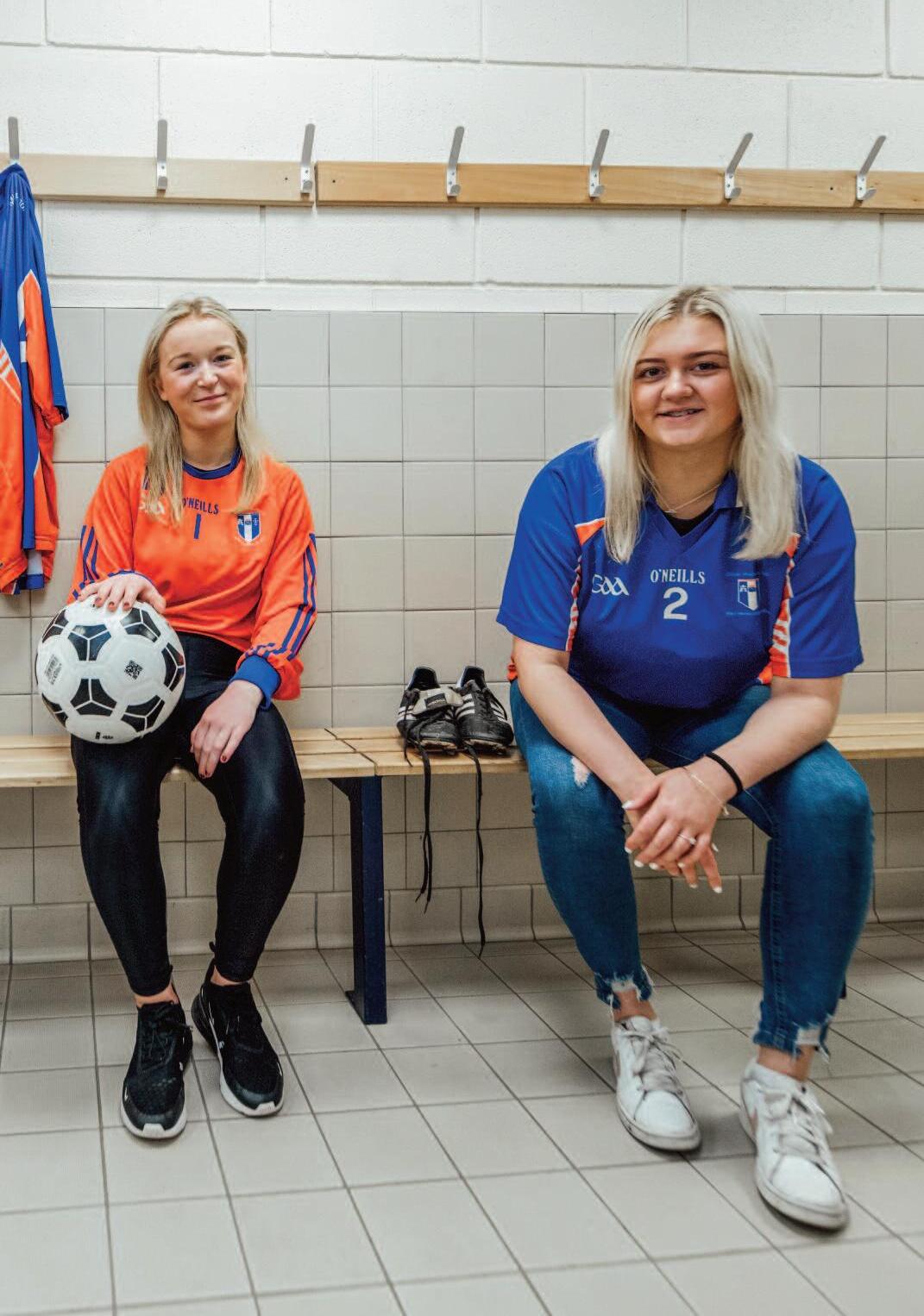
Mary Immaculate College is committed to giving access to GAA coach education courses to all students on both our Limerick and Thurles campuses
last seven years and have won the division 2 league twice in the same period the College also plays in the Munster Junior Football Championship. the junior team reached the Munster Final in 2016. Former Limerick footballer Pat galvin is coach to our football teams
Hurling: Mary Immaculate College made history in 2016 when its senior hurling team beat uL in an epic final to secure the Fitzgibbon Cup for the first time ever. In 2017 MIC were victorious for a second year in a row, defeating It Carlow in the final - a remarkable achievement for a college with a population of just over 5,000. In 2019 MIC once again reached the Fitzgibbon Cup final where they were beaten by a strong uCC team and in 2020 reached the semifinal. Many players who have played for Mary Immaculate College have gone on to successful careers on intercounty teams. the current coach, Jamie Wall, played in the 2013 Fitzgibbon Cup final with Mary Immaculate College george Fitzgibbon is coach to the Freshers Hurling team.
Ladies Football: the College fields two ladies football teams. In 2012, the first team won the giles Cup and the division 2 league, and regained the giles Cup in 2014 after competing in the o’Connor Cup in 2015, they reached the giles Cup final in 2016 and have been in the semi-finals every year since. In 2022, the Ladies First team won the giles Cup for the third time In 2023 they will play in the o’Connor Cup the second team competes in the division 4 league and Moynihan Cup, while the third team participates in the donaghy Cup MIC also takes part in the National Freshers Blitz each year dr richard Bowles (Limerick) and dr anne o’dwyer (tipperary) are the ladies football coaches Players of all standards are very welcome. We also encourage players to develop their own coaching skills through the organisation of blitzes involving local primary schools
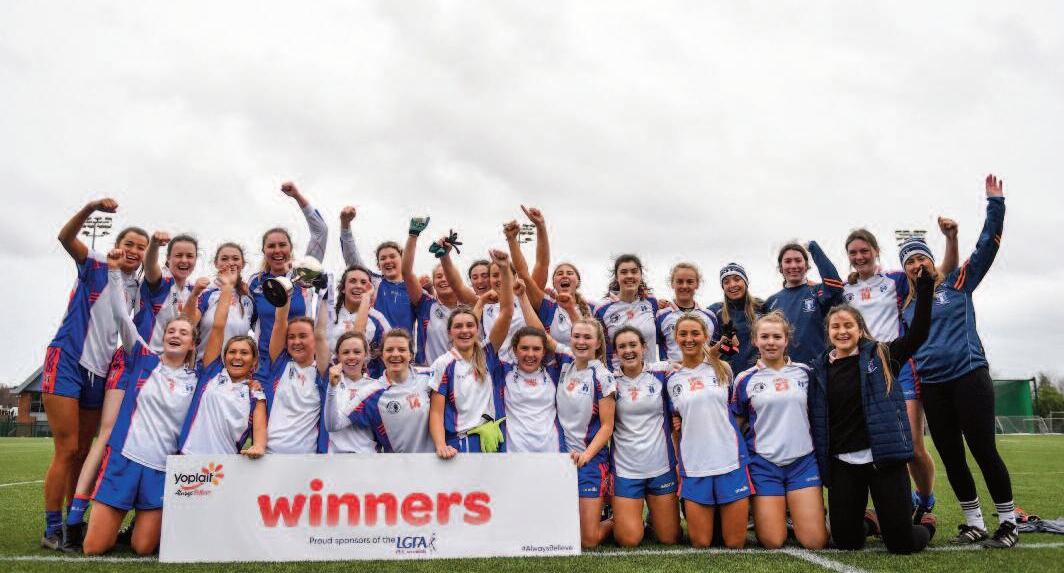
Rugby: the men's rugby team is a relatively new team in the College. they competed for the first time in the Colleges league in 2016 and in 2017 they won the tier two all-Ireland final.
Soccer: the senior men’s soccer team compete in the Collingwood Cup In 2012 they were Collingwood Cup finalists. they have won the spillane Cup for the last three years
the ladies soccer team compete in their respective intervarsity leagues and championships
Table Tennis: there are four tables available in tailteann to play table tennis
Tennis: the tennis club in Mary Immaculate College is relatively new but is continuing to grow. It is a very inclusive club and welcomes all players irrespective of ability. tennis training takes place weekly using facilities located close to the College. MIC has participated in the National College Championships and hopes to have an intervarsities team in the future tennis is a great way to meet other students, have fun and stay active
Walking: one of the most utilised sports facilities in the College is the walking track around the gaa pitch. this is a 460m astroturf track and is used by students, staff, visitors and locals for jogging and walking
Weights Room: there is a fullyequipped weights room in tailteann
Coaching is provided at introductory and advanced levels. You can compete in college and intervarsity competitions or you can play at recreational level. the following sports are catered for at both levels: hurling, gaelic football, ladies football, camogie, soccer, tennis and basketball
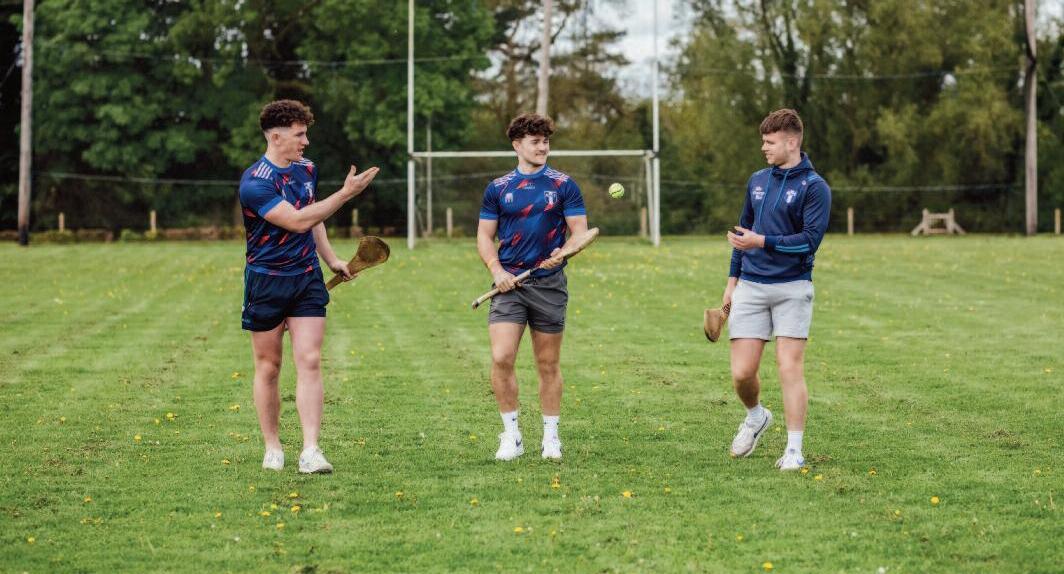
Badminton, volleyball and table tennis are catered for at a recreational level selected students have the opportunity to represent the College at international sporting events
You will find that being involved in sport gives you the opportunity to develop friendships and to enjoy a social side of college life We, at Mary Immaculate College, would
encourage all students to take part in sport and recreation at some point throughout their time in the College.
Currently MIC thurles participates in a range of sporting activities, such as hurling, football, camogie, rugby, ladies football and soccer some of these activities operate across both the Limerick and thurles campuses In recent years the camogie team have competed in and won the Corn uí Mhaolagain also, our senior hurlers competed in the Fergal Maher Cup the players in the MIC thurles hurling team range from those with an interest in hurling to senior inter-county stars such as dessie Hutchinson and aaron dunphy. adjacent to the College and with pedestrian access are a gym and swimming pool with special rates for students
Further Information
t: +353 61 204375
e: tailteann.reception@mic.ul.ie
Wired 99 9FM, Limerick’s student radio station, located at Mary Immaculate College (MIC) and technological university of the shannon (tus): Midwest, celebrated 27 years on air this college year
the station, with studios in both MIC and tus, provides a voice for the students of Limerick and gives them a chance to offer a real alternative for fans of great music and talk-based radio in the city. genres such as r&B, rap, hip-hop, rock, metal, dance, punk, folk, traditional and so much more are catered for on the station the station is particularly proud of its support of independent local music, and has won national awards for its promotion of artists from the local hip-hop scene the station is a platform for all up and coming artists, and a space where several well-known dJs and other musical acts made their broadcasting debut. Besides eclectic music choices, the station broadcasts weekly film, literature, sports, Irish language and arts programmes, combined with student current affairs output to let students know what’s going on and how it will affect them
during each academic year, over 150 volunteers from MIC and tus have availed of a free comprehensive training course in all aspects of radio broadcasting Wired 99 9FM is always looking for volunteers with good ideas and who want to try their hand at student
the College radio station, Wired 99.9FM, is a non-profit partnership which broadcasts in Limerick City and suburban areas for 60 hours during its weekday schedule, Monday to Friday, on 99.9 FM.
broadcasting the station has also been involved in a number of outreach programmes with the wider community, that has seen the station open up its airwaves to people with disabilities, secondary school students, disadvantaged youth, members of the travelling Community, immigrants and asylum seekers, and many more.
In recent years the station has developed into a learning centre, running several QQI courses such as Media expression and Communication courses at Levels 3, 4 and 5 these courses have allowed local older people, members of the travelling Community, migrants, and former offenders develop communication skills and receive a qualification the station is always developing its own unique outreach programmes, focusing on areas such as inequality, social justice and the right to communicate In the summer of 2019 the station launched an advocacy and media expression course specifically for people living in direct Provision and in 2020, the station launched Mincéir Media, a media expression course designed for members of the travelling Community
In 2017 the station signed a new 10-year licence with the BaI, and the studios have since been updated to top of the range digital consoles this is part of the station’s overall strategic plan to support reliable, high
quality operations in a constantly developing and evolving environment. the station has begun running live broadcasts and video streams from the record room, and other venues in Limerick city, allowing students to get experience in an even broader setting where they can learn about live sound and vision mixing.
Wired 99.9FM is constantly striving to produce innovative programming the station gives students on campus a wide range of media production opportunities and experience But you don’t have to study Media & Communications to join - aNY student on aNY programme can become a radio station volunteer and student broadcaster If you don’t want to speak on air, there are plenty of jobs for researchers and technicians
Notable alumni who have volunteered at Wired 99 9FM while studying at MIC include rtÉ sports broadcaster, Jacqui Hurley; executive producer with rtÉ Children’s and Young People programming, eimear o’Mahony; producer, director and news editor with rtÉ and tg4, Áine Ní dhúill; multimedia journalist with rtÉ News, Maria Flannery; production coordinator and presenter with rtÉ Lyric FM, Ian Mcglynn.
For more information go to www.wiredfm.ie
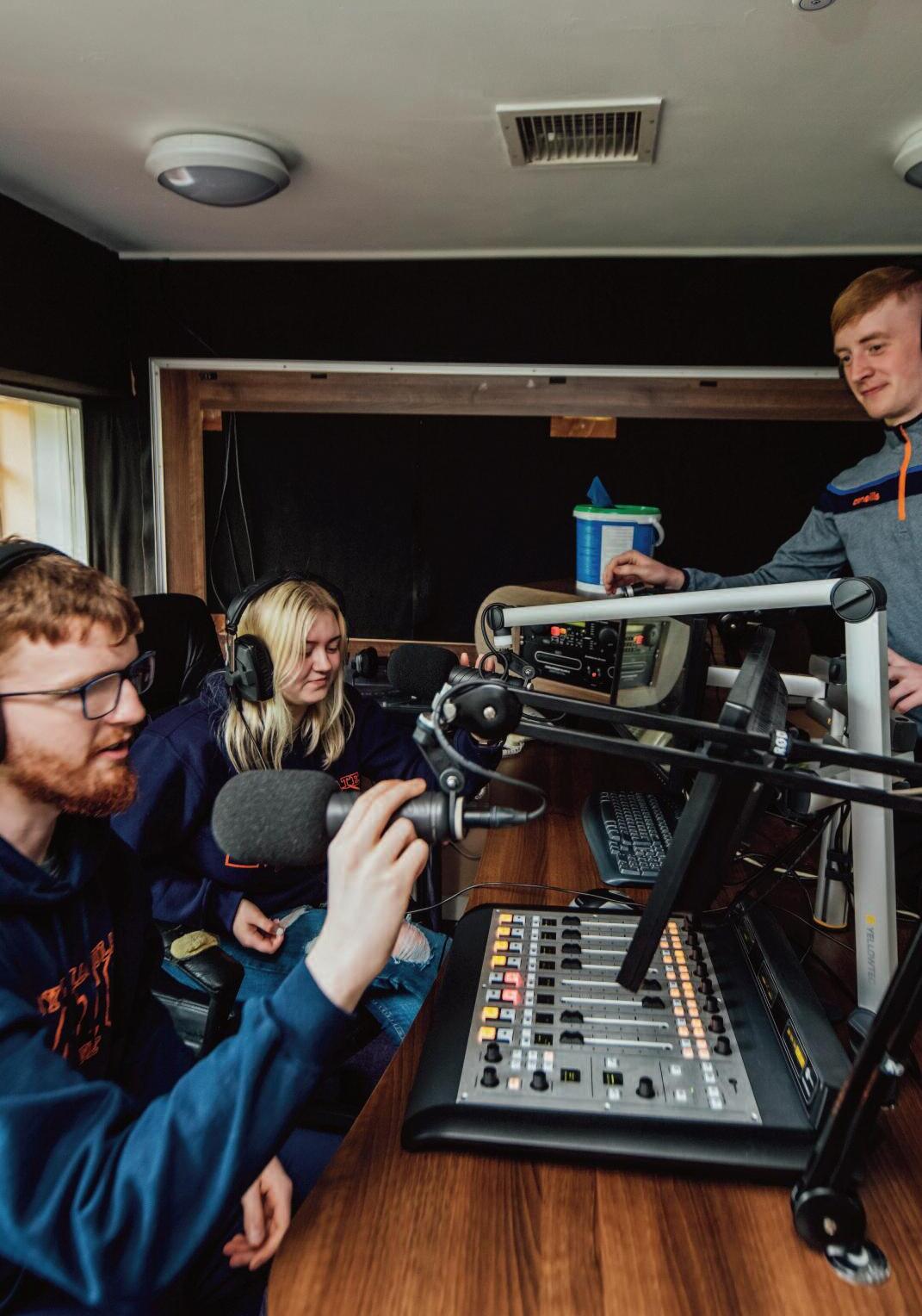
Mary Immaculate College owns and operates on-campus residential accommodation for students Choosing to live in college accommodation offers students the convenience of living on-campus, or within a short walking distance of it. It provides opportunities for making friends and for academic, social and cultural enrichment in a secure and comfortable environment.
the College’s accommodation office provides assistance to students in finding accommodation in dedicated student residences or in private houses
this purpose-built facility provides managed accommodation for students on a self-catering basis accommodation is available to all undergraduate and postgraduate students single and twin study bedrooms are available. residents of the complex also have use of a selfcatering kitchen and communal tV lounge. Private parking is available and there is a housekeeping service for the upkeep of communal areas
Located on Courtbrack avenue, this accommodation is less than a five-minute walk from the College's Limerick campus and is also within easy walking distance of all city amenities
students must provide their own bed linen and towels in all College accommodation outlets
Bookings are taken all year round However, early booking is highly recommended students may only provisionally book one type of accommodation
For costs and booking details please refer to our website, or contact the MIC accommodation office:
t: +353 61 302500
e: Courtbrack@mic.ul.ie
W: https://www mic ul ie/studyat-mic/accommodation
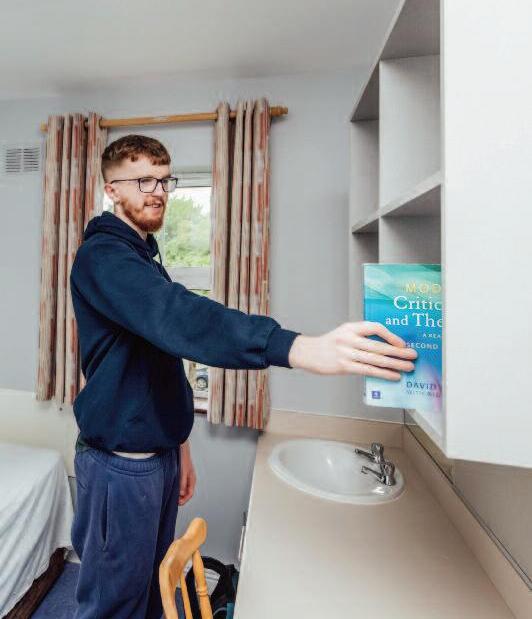
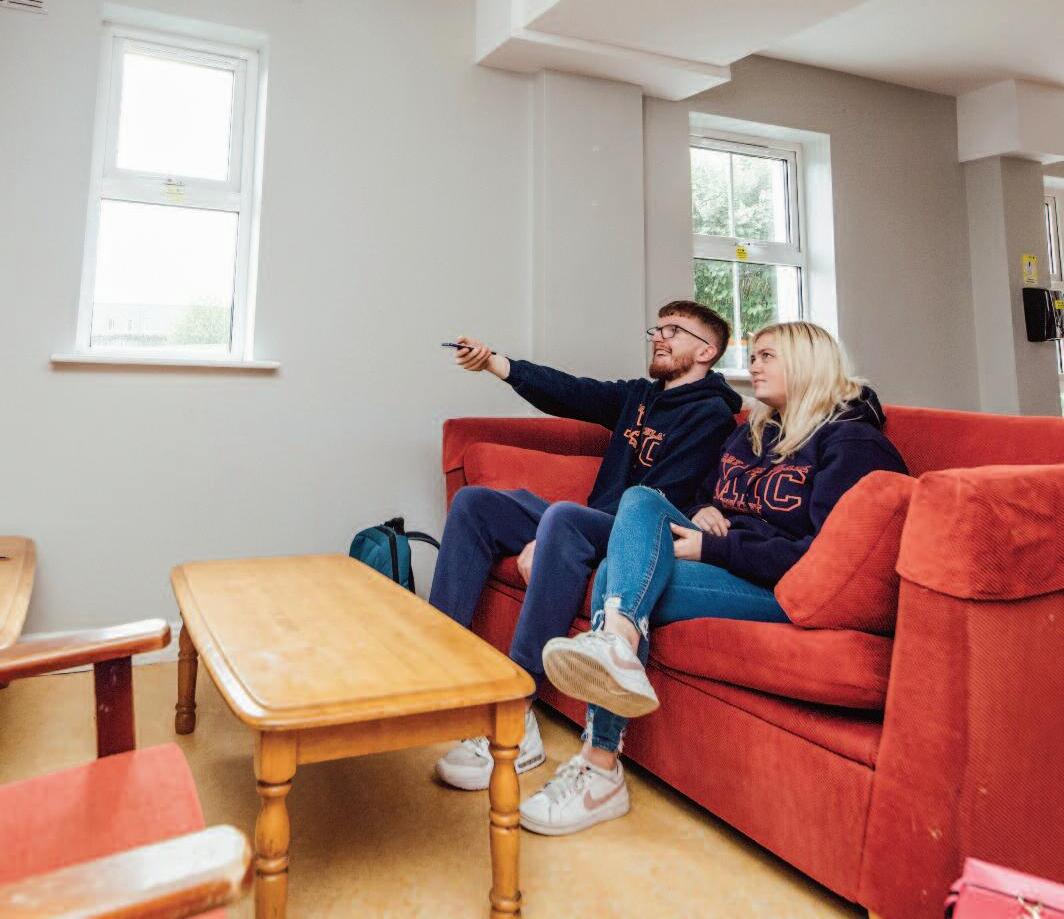
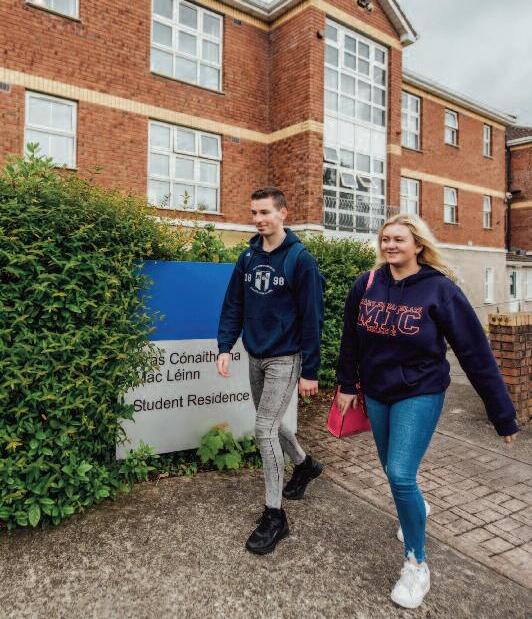
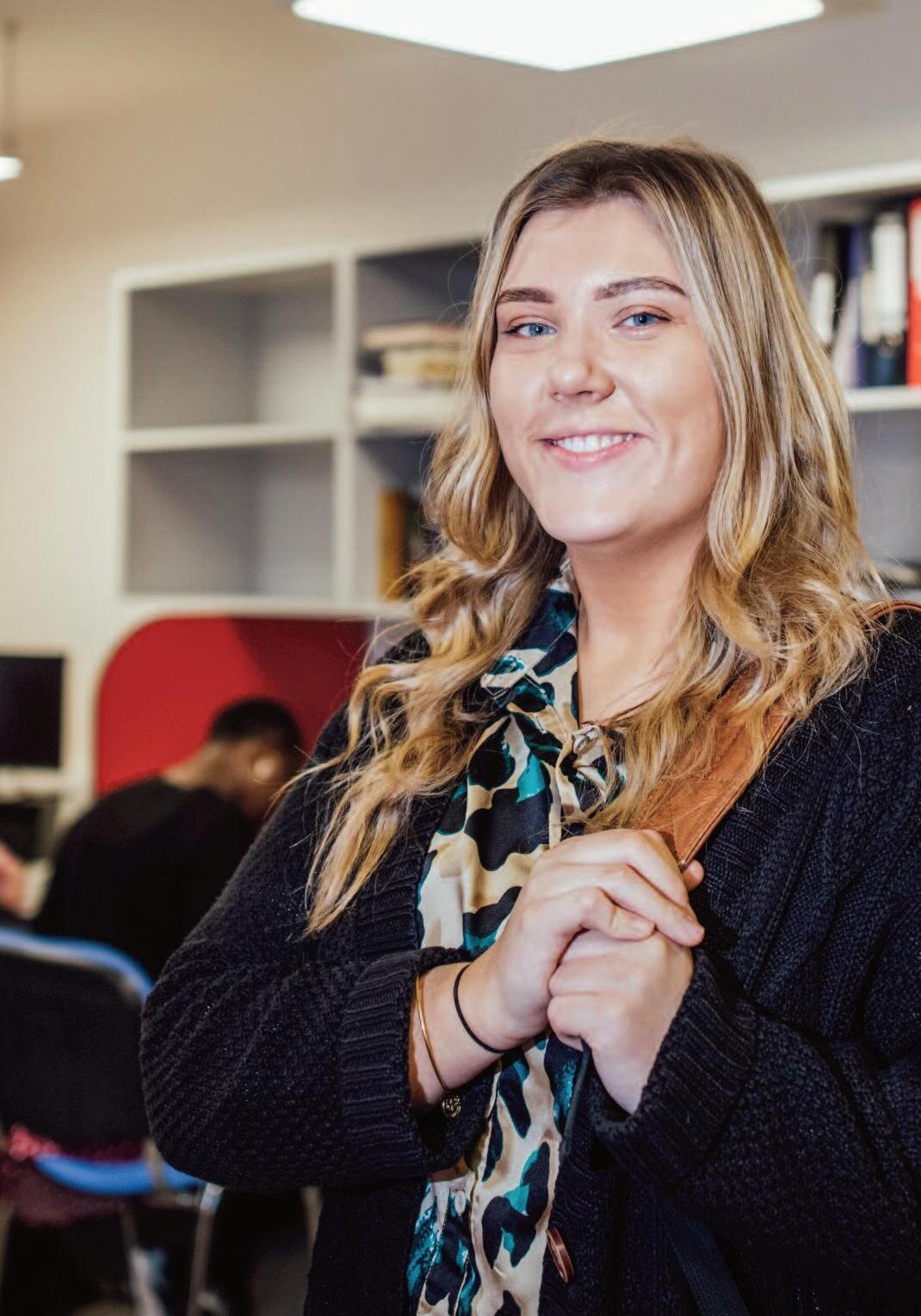
The research environment at MIC is supported by state - of-the - art facilities including excellent study spaces and up to the minute online resources
Please note: The programme list is not exhaustive. Please refer to www.mic.ie/postgraduate for the full list of postgraduate programmes on
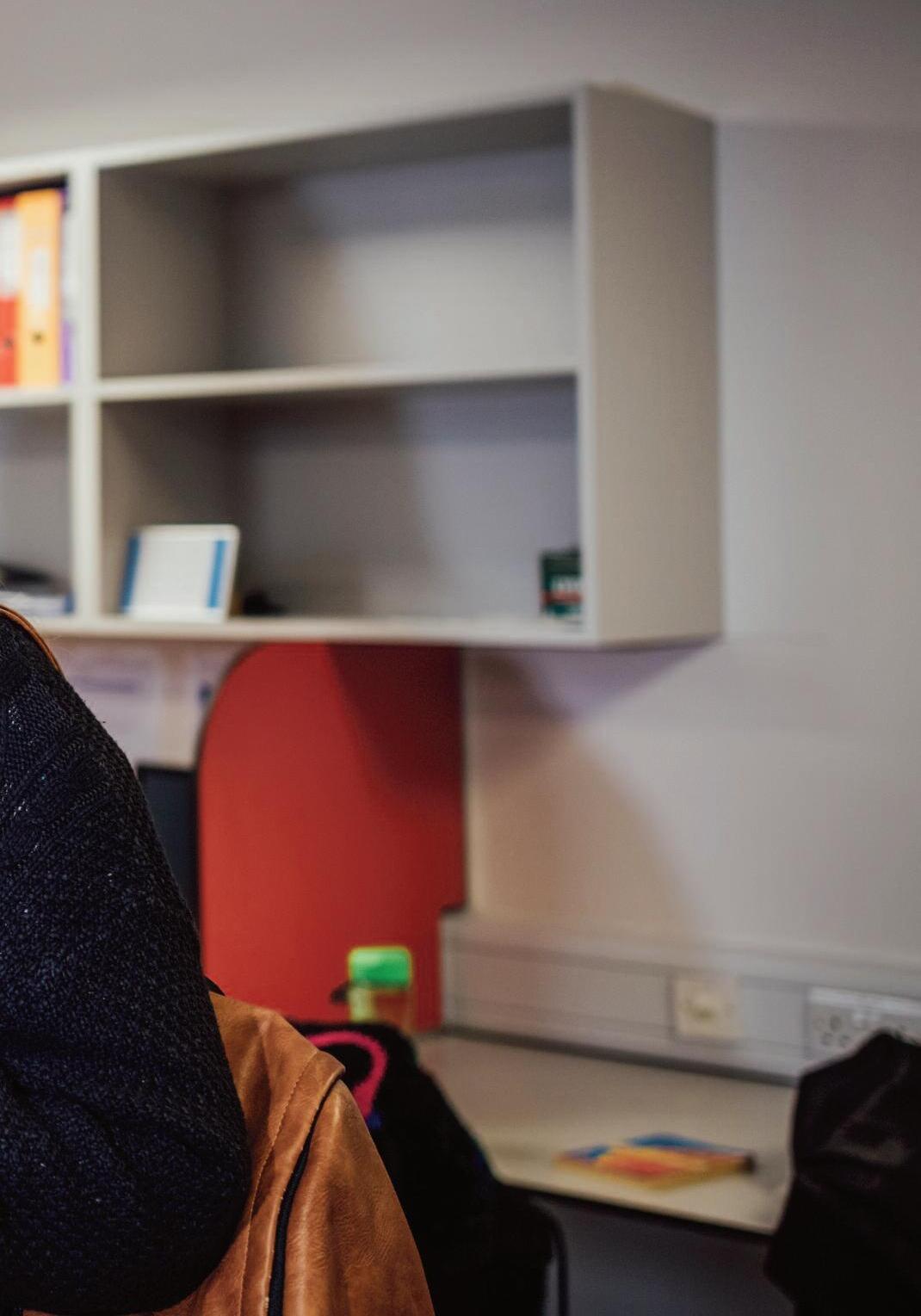
the Faculty of Arts at MIc offers academic leadership and postgraduate supervision within the traditional range of Arts research fields Prospective postgraduates are encouraged to explore the research interests of the relevant department and to discuss their own ideas for research proposals with the respective department Heads or other Faculty as appropriate.
departmental research expertise:
Department of Drama and Theatre Studies
• 20th Century and Contemporary Irish drama and Performance
• applied/social theatre and Community theatre
• theatre for Young audiences
• artistic/Performance Practice as research
• 18th Century Irish drama
• drama and theatre education
dr Michael Finneran
Head of department
t: +353 61 204976
e: Michael Finneran@mic ul ie
Department of English Language and Literature
• Women’s Writing
• Contemporary Literary and Cultural theory
• Contemporary Irish Writing
• World Literature
• Literature and theory of Migration and Biopolitics
• Postcolonial Literature and theory
• ecocriticism and ecotheory
Applied Linguistics
• Corpus Linguistics sociolinguistics
eLt theories discourse studies
Pragmatics
second Language acquisition skills and theories
dr eugene o’Brien
Head of department
t: +353 61 204989
e: eugene.oBrien@mic.ul.ie
Department of French Studies
• 18th Century French studies - Montesquieu; Voltaire; rousseau; diderot; Prévost; the enlightenment; Circulation and Censorship of Ideas
• 19th Century French studies - Lamartine; Nodier; Hugo; Balzac; dumas; Flaubert; Zola; Literature and society (politics, artistic life and movements, histoire des idées, issues of crime and justice); travel
Literature; drama
• 20th Century French studies - Camus, sartre, de Beauvoir; War and Conflicts in 20th Century France; Postcolonial studies; Intellectual and Literary Movements; Constructions of the French republic and Issues of Identity; Contemporary French Politics
dr Loïc guyon
Head of department
t: +353 61 204352
e: Loic.guyon@mic.ul.ie
Roinn na Gaeilge
• Nua-litríocht na gaeilge, idir Phrós, Fhilíocht agus dhrámaíocht
• teanga agus Pobal
• Logainmneacha
• an ghaeilge agus na Meáin
• gnéithe de shochtheangeolaíocht na gaeilge
dr Breandán Ó cróinín
ceann roinne
t: +353 61 204330
e: Breandan.ocroinin@mic.ul.ie
Department of Geography
• urbanisation in Ireland
• environment and development
• society and settlement in Medieval and 17th Century Ireland
• Palaeolimnology
• Marine Micropalaeontology
• geography of the developing World
Professor Paul Aplin
Head of department
t: + 353 61 204210
e: Paul Aplin@mic ul ie
Department of German Studies
• Intermediality and adaptation
• transcultural Literature/Media
• Comparative studies
• Literary theory, drama, Poetry, Fiction
• Movement and spatial studies
• autobiographical Writing
dr christiane schönfeld
Head of department
t: +353 61 204582/204996
e: christiane.schonfeld@mic.ul.ie
Department of History
• Medieval Ireland
• early Modern and Modern Irish History
• History of the Irish in europe; Irish america
• social and Cultural History, including the History of Violence and the Law
• Visual research in History (e g political cartoons)
• Irish revolution, c 1912-1923
dr Liam chambers
Head of department
t: + 353 61 204534
e: Liam chambers@mic ul ie
Department of Mathematics and Computer Studies
• Commutative algebra
• Complex analysis
• algebraic geometry
• Homological algebra
dr Bernd Kreussler
Head of department
t: +353 61 204578
e: Bernd.Kreussler@mic.ul.ie
Department of Media and Communication Studies
• Community radio in Ireland
• radio and the Irish Language
• soundscapes and sound studies
• Media ecologies and society
• Popular Music studies
• Fandom
dr rosemary day
Head of department
t: +353 61 204327
e: rosemary.day@mic.ul.ie
Department of Music
• North german Baroque
• Musical Nationalism
• Musical analysis
• Music in 19th Century Ireland
• 20th Century Irish art-Music
dr gareth cox
Head of department
t: +353 61 204588
e: gareth.cox@mic.ul.ie
Department of Philosophy
• Phenomenology
• Hermeneutics
• ancient Philosophy
• social and Political Philosophy
• 19th Century german Philosophy
dr daniel vázquez
Head of department
e: daniel vazquez@mic ul ie
Department of Psychology
• Health and Well-being
• Cognition and action
• Psychology and technology

• Mental toughness
• stress and Performance
Professor niamh stack
e: niamh stack@mic ul ie
Department of Theology and Religious Studies
• the Works of Karl rahner and Hans urs Von Balthasar
• Canon Law and its relationship to sacramental theology and ecclesiology
• the relation between theology and art
• New testament Christology
• Moral theology
Arts office
e: Artsoffice@mic.ul.ie
Programme overview
this programme introduces students to key ideas, concepts and principles that underpin the characteristic spirit or ethos of faith-based education among the topics studied are: i) Jesus the teacher; ii) Nurturing Personal Faith and spirituality; iii) the Catholic school and Contemporary Culture; iv) an integrating seminar: practitioner-based sessions that require students to integrate and explore the crossdisciplinary elements of the programme, the students’ own experience in the school environment, and the application of ethical leadership in a variety of complex scenarios that reflect contemporary issues facing school leaders in faith-based schools.
on successful completion of this programme participants will be able to:
articulate and evaluate critically current principles of Christian educational leadership in intercultural and multicultural contexts; evaluate and apply best practice in building a positive learning environment in the school based on Christian principles; and Implement the characteristic spirit of their particular school and to facilitate its support and development in contemporary complex scenarios
Assessment Modes assessments will include: essays, journaling, projects, book reviews, online exercises and discussion forums, critical incident reports, and oral and written examinations

special Programme Features the programme will be offered on MIC’s Limerick campus and at various venues around the country. It is offered on a part-time basis, normally delivered over five saturdays.
career opportunities
this programme provides a qualification for those who may aspire to a management position in a faith-based school, at either primary or post-primary level
the programme also serves to supplement the knowledge and skills of those who already hold a postgraduate qualification in school management, but who have not the requisite qualifications with respect to leading in the area of ethos or characteristic spirit this programme provides the skills and competencies that they need in this applied area of leadership within the faith-based school sector
duration
6 Months (Part-time)
Fees For up-to-date information please see www.mic.ie/fees
entry requirements
róisín dignan
certificate in christian Leadership in education
I am a secondary school teacher working in Co Laois I have studied theology and have been teaching religious education for many years I took the graduate Certificate in Christian Leadership from 2019 to 2020 Initially I wasn’t exactly sure what would be involved but after the first lecture I was delighted to have signed up for it and I was thrilled to be awarded the certificate when we finished! I thought that the programme was very well organised and the facilitators were excellent each topic was thoughtprovoking and challenging the course work benefitted me personally, as well as providing me with some great insights and ideas
How to Apply
entrants must hold a primary degree and be involved in either the primary or post-primary sector as part of the teaching staff or management team all applicants will be required to have garda Vetting
For programme specific application details please go to: www mic ie/postgraduate
closing date for general application deadline is 31 May Applications see www mic ie/postgraduate for programme specific application deadlines
contact details dr Joanne Ferguson
Programme Coordinator
e: Joanne.Ferguson@mic.ul.ie
deirdre Franklin
e: deirdre Franklin@mic ul ie

Programme overview
the Masters of arts in Christian Leadership in education is an innovative, specialist programme designed to enhance the development of leadership capacity in the primary and post-primary school sector It is helping to build much needed educational capacity, respond to the widespread desire for an authentic personal spirituality, and address the acknowledged 'deficit' in theological literacy and the widespread hunger for justice and inclusiveness in Irish society
the programme explores key issues of educational leadership, policy and management, within the context of faith-based school environments
Assessment Modes
assessments vary across modules they can include written assignments, online exercises and participation in workshops
special Programme Features
the programme will be delivered by means of traditional lectures, workshops and some online exercises
career opportunities
this Ma programme is designed as a specialist programme to enhance the development of leadership capacity in the primary and post-primary sector It is open to principals, deputy principals and teachers aspiring to leadership or management roles within the faith-based education sector It is also open to those in Boards of Management or working with the educational trust Bodies
duration 2 Years (Part-time) this programme generally commences with a two week summer school in early July each year
Fees For up-to-date information please see www mic ie/fees
entry requirements the normal requirement for entry to the programme is a First or second Class Honours primary degree applicants with equivalent qualifications or substantial relevant experience will also be considered Final selection will require attendance for interview and may require presentation of some previous written material
How to Apply For programme specific application details please go to:
www mic ie/postgraduate
closing date for general application deadline is 31 May Applications see www mic ie/postgraduate for programme specific application deadlines
contact details dr Joanne Ferguson
Programme Coordinator
e: Joanne Ferguson@mic ul ie
deirdre Franklin
e: deirdre Franklin@mic ul ie
charlotte Keane

MA in christian Leadership in education
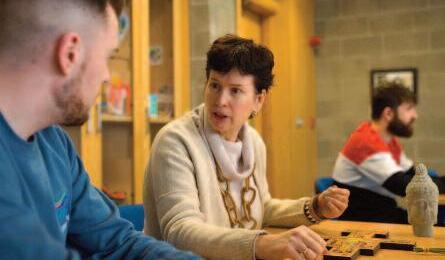
Choosing to study the MaCLe programme is one of the best life decisions I have made. this programme helped me to grow as a person, as I have developed academically, spiritually and emotionally. My new found understanding of the contemporary Irish educational landscape has improved my ability to teach children and communicate with parents and staff Not only has MaCLe provided me with essential professional skills, it has helped me find friends for life
Learning about the Christian educational ethos with like-minded people and excellent lecturers has reaffirmed my beliefs and has given me confidence in my faith the fact that this programme is offered in part-time mode made it possible to balance work and study, with the help of supportive lecturers
the MaCLe programme has guided me to a wonderful and prosperous path at the beginning of my teaching career
Programme overview
the Ma Climate, Justice and sustainability tackles the most pressing global issue of our time – how to manage human exploitation of our natural environment sustainably, and fairly this is a unique programme, involving a collaboration between MIC’s departments of geography and Philosophy, covering fundamental issues such as environmental ethics and climate justice, as well as more practical topics like social and environmental sustainability Longer term thinking and new approaches to development and prosperity are urgently required Persistent and worsening ecological crises present fundamental questions, including the need to think about challenges to prosperity as well as justice and rights issues, reversals of development gains and resulting conflicts. the programme draws on MIC’s established strengths in the Faculty of arts, combining expertise from across the faculty to deliver a focused Master of arts programme on Climate, Justice and sustainability. the department of geography has established teaching and research expertise in sustainability, Just transitions and Political ecology. the department of Philosophy has a growing international reputation in environmental ethics, sustainability Citizenship and Intergenerational Justice
In partnership, these departments will provide a unique offering which targets a growing and urgent academic need for graduates of technical, theoretical and practical proficiency, equipped with the necessary skills to address our most profound challenges as a global community
Assessment Modes
theoretical essays, technical projects, oral presentations, consultancy reports, research proposals, and dissertation
special Programme Features
this unique programme will equip graduates with a broad range of skills and expertise across the environmental domain, integrating perspectives from both geography and Philosophy disciplines at its core, the programme will embed a recognition of the interrelationships between the myriad socio-cultural and biophysical factors driving global socio-ecological crises; in the process, a deep understanding of the role of justice in understanding the causes of, and importantly, solutions to, our present ecological crises will be developed the programme will take a deliberate transdisciplinary framing, addressing key questions about global prosperity, fairness and justice, the roles of science and knowledge in sustainability as well as
critical interrogations of the inter-linked relationships between ecology and culture, environmental justice, and prosperity and economic growth graduates will be equipped to develop their professional careers nationally and internationally in the growing sustainability sector
career opportunities there are important environmental, and ethical, reasons to study this programme, but there are also strong professional reasons this is a busy and growing employment sector, and this programme enhances provides both subject-related and transferable skills that are sought after by employers to ensure our students are ready for the world of work, the programme includes a novel environmental Consultancy module, where student groups undertake real-world projects commissioned by external organisations.
duration
1 Year Full-time, 2 Years Part-time
Fees For up-to-date information please see www mic ie/fees
entry requirements
applicants will be considered for entry on the basis of a primary degree in geography or a cognate discipline at a minimum of 2 1 honours Potential students who do not meet the normal entry requirements may be considered for admission and should contact the Programme director for information
How to Apply For programme specific application details please go to:
www mic ie/postgraduate
closing date for deadline is 30 June
Applications see www mic ie/postgraduate for programme specific application deadlines

contact details arts office
e: artsoffice@mic ul ie
roinn bhisiúil í roinn na gaeilge agus naonúr léachtóirí lánaimseartha ann, mar aon le meitheal teagascóirí páirtaimseartha agus comhaltaí teagaisc tá saineolas ag an roinn i réimse leathan ábhar tá proifíl láidir taighde ag an roinn agus bíonn comhdháil bhliantúil ag an roinn i mí na Bealtaine Bíonn baill na roinne rannpháirteach i gcomhdhálacha eile idirdhisciplíneacha freisin.
Beidh MA (múinte) úrnua ar fáil ó Mheán Fómhair 2024 ar aghaidh agus cuirfear eolas faoin Ma nuálach seo ar fáil ar shuíomh roinn na gaeilge i dtreo dheireadh sheimeastar an Fhómhair 2022. Fógrófar eolas faoin Ma freisin ar chuntas twitter roinn na gaeilge, Coláiste Mhuire gan smál.
Fad Bliain amháin
táille www mic ie/fees
riachtanais Iontrála de ghnáth bíonn Céim sa ghaeilge le 2 2 ar a laghad ag teastáil le go mbeadh duine cáilithe chun tabhairt faoin Ma sa ghaeilge
conas Iarratas a téigh i dteagmháil leis an dr dhéanamh Breandán Ó Cróinín sa chéad áit agus tar éis an clár a phlé leis is féidir leat an fhoirm iarratais iarchéime a líonadh agus í a chur isteach leis an táille cuí
spriocdháta d’iarratais www mic ul ie/faculty-ofarts/programme/ma-sa-ghaeilge
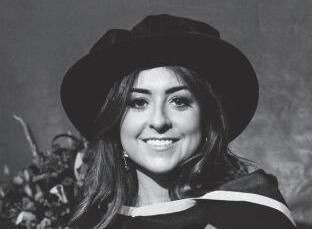

teagmháil dr Breandán Ó Cróinín Comhordaitheoir an Chláir
t: +353 61 204330
r: Breandan oCroinin@mic ul ie
síle concannon MA sa ghaeilge
thug mé faoin Máistreacht Múinte sa ghaeilge a dhéanamh i gColáiste Muire gan smál sa bhliain 2012 tar éis dom an Baitsiléir oideachais a chríochnú ansin chomh maith Bhíos idir dhá aigne faoin mbunmhúinteoireacht an t-am sin, ach b’é an chéim sa ghaeilge, a fuaireas leis an mBaitsiléir oideachais, ar chur ar bhóthar na Máistreachta mé Cúrsa fíorluachmhar a bhí san Ma a chíor ‘is a scag Nua-Litríocht na gaeilge, Litríocht na sean-ghaeilge, Léann na Lámhscríbhinní, an Litríocht Chlasaiceach, an Béaloideas, gnéithe de shoctheangeolaíocht na gaeilge gan ach roinnt samplaí a lua. Lasmuigh de na hardléachtaí agus na sár-léachtóirí inmhéanacha, tháinig aoi-chainteoirí chugainn chun a gcuid saineolais a roinnt linn; alan titley agus Liam Ó Muirthile ar bheirt acu. Freastlaíodh ar Cheiliúradh an Bhlaoscaoid maraon le comdhálacha
éagsúla fud fad na tíre Is mór an feabhais a tháinig ar na scileanna taighde agus na scileanna scríbhneoireachta agam an bhliain dar gcionn, d’éirigh liom scoláireacht Fulbright a bhaint amach a thug an seans dom dul go Montana, agus is cinnte nach mbeadh an tseans sin faighte agam gan an taithí a bhfuaireas ar an Ma Bliain, a bhí san Ma, a d’fhág rian orm, agus is deis an cúrsa seo nár mhór a thapú
Programme overview
this online programme provides an opportunity for students to develop their abilities at postgraduate level, through a mix of taught modules, participation in research seminars and completion of a research dissertation the Ma in History is delivered entirely by full-time Faculty in the department of History teaching is delivered via a mixture of live and pre-recorded online classes and tasks, allowing students opportunities to engage in discussion and debate with peers alongside additional flexibility to plan their own study
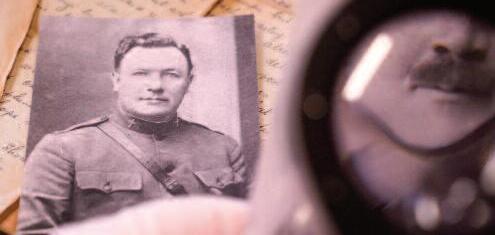
the 20,000 word dissertation is completed under the careful guidance of a Faculty member each student will engage with scholarly works and primary source material in his/her chosen historical field the dissertation is normally due for submission in august
all modules are assessed by means of continuous assessment, which includes essays, presentations, document appraisal and review, and online forums
special Programme Features
Fully online delivery; small class size; one to one supervision for thesis; friendly and supportive academic community
career opportunities
the taught Ma in History is an excellent stepping stone for a Phd in History other career pathways include teaching at all levels; tourism, heritage, arts, museum and archives administration and research; documentary and radio research; publishing and journalism; public service; and private sector research and administration
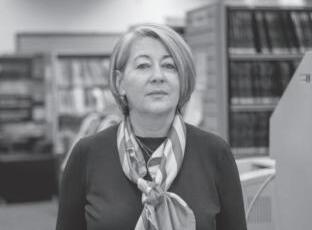
duration
1 Year (Full-time)
Fees For up-to-date information please see www mic ie/fees
entry requirements applicants will be considered for entry on the basis of a primary degree in History or a cognate discipline at a minimum of 2 2 honours Potential students who do not meet the normal entry requirements may be considered for admission and should contact the Programme director or Head of department for further information
the combination of taught modules, varied research seminars, field trips to archival repositories and the research thesis meant that this academic programme was both an engaging and challenging experience. the lecturers were encouraging and supportive and the small class size ensured that there was plenty of lively debate and captivating exchanges
My thesis centred on a private collection of correspondence written by my grandparents between 1917 and 1919 I had always wanted to explore what these narratives could reveal about life in the early 20th century the invaluable guidance, assistance and support I received from my supervisor empowered me to critically analyse and assess the inherent complexities of these primary source documents
For me the Ma in History at MIC was a fascinating and rewarding journey of discovery
How to Apply For programme specific application details please go to: www mic ie/postgraduate
closing date for general application deadline is 31 Applications May. see www.mic.ie/postgraduate for programme specific application deadlines
contact details
dr Brian Hughes
Programme Coordinator
t: +353 61 204901
e: Brian Hughes@mic ul ie
dr richard McMahon
Programme Coordinator
t: +353 61 204356
e richard McMahon@mic ul ie
Programme overview
Local history is less about the events of national history, such as war or elections as they occurred in a particular locality, and more about the unique circumstances and events in the lives of ordinary people. Key themes in the programme include for example:
· the goals of local history; strengths and weaknesses;
· the relationship between local, regional and national histories;
· evaluating sources: versatility, limitations and applications;
· events in local histories: descriptions, narrative and analysis;
· the use of numerical and cartographic data in local history; and
· sources in local and national archives
Assessment Modes assignments (continuous assessment); attendance and participation at seminars In Year 2, students complete a dissertation of approximately 18,000 words research topics are identified during Year 1 ongoing research conducted under Faculty supervision is reviewed in seminars during Year 2
the programme is only available on a part-time (twoyear) basis. during the first year students attend lectures and seminars at uL and MIC on Wednesday evening during the two twelve-week semesters.
While graduates of this Ma are well placed to pursue a multiplicity of career pathways, the programme is of particular value to Primary and Post-Primary teachers, archivists and Librarians
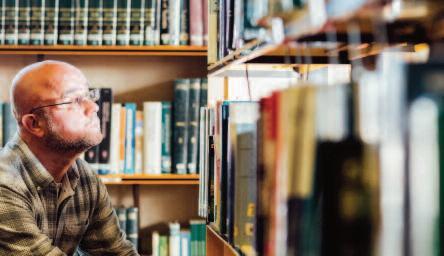
the programme will also be of interest to those who wish to research local history for its own sake It is also suitable for those who wish to develop research skills prior to undertaking a Phd programme
duration
Fees
entry requirements
2 Years (Part-time)
Please see www ul ie
Please see www mic ie
How to Apply For programme specific application details please go to: www mic ie/postgraduate
closing date for general application deadline is 31 May
Applications see www mic ie/postgraduate for programme specific application deadlines
contact details dr david Fleming Programme Coordinator, university of Limerick
t: +353 61 233795
e: david Fleming@ul ie

I have always loved history and particularly the history of my own locality. However, as I didn’t study history in my primary degree I dismissed the idea that I could pursue a Masters in this area, so I was delighted to learn that I could study on the Ma in Local History I am happy to say that my historic horizons have been widened through the varied modules I took in my first year
the subject of my thesis is very far removed from what I had intended it to be when I first started the programme that expansion in my interests is down to the lecturers in the department of History in both Mary Immaculate College and the university of Limerick, who were both motivating and enlightening in lectures and have given great input and support the small class sizes also meant that we received a more individual learning experience
Programme overview
run by MIC's department of english Language and Literature since 2002, this highly-successful and popular one-year taught Masters programme in Modern english Literature has graduated over 146 students and 97% of these students have graduated with an honours Ma degree From 2020, the programme is now being delivered exclusively online, and so is available to a much broader cohort of students
We will deliver lectures and presentations on teams and will have interactive seminars with you
semester 1
• the Poetics and Politics of Irish Identity
• Modernism: texts and Contexts World Literature
• Migration and Biopolitics in 21st Century Literature
• research Methodology 1
semester 2
• Modern american Fiction
• World Literature
• Contemporary Postcolonial Literature and theory
• research Methodology 2
the research methodology ones are pass/fail and prepare for the thesis a 15,000 to 20,000 word dissertation is also part of the course and students can select their own topic and supervisor, and our research methodology modules will provide guidance assistance and review for all of these dissertation choices
Assessment Modes assessment modes include essay coursework and minor dissertation
career opportunities areas of opportunity open to graduates include: Primary teaching; Post-Primaryteaching ; Journalism; Law; third-Level teaching; arts administration and Management; Heritage and Museum studies; Business administration; and Marketing
duration
1 Year (Full-time); 2 Years (Part-time)
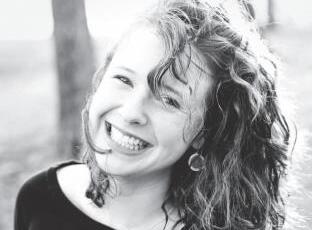
Fees For up-to-date information please see www mic ie/fees
entry requirements applicants should have an honours primary degree with english as a final year subject other suitably qualified candidates may also apply applicants may be required to attend for interview a minor thesis proposal should be submitted with the application
How to Apply For programme specific application details please go to: www mic ie/postgraduate

closing date for general application deadline is 31 May. Applications see www mic ie/postgraduate for programme specific application deadlines
contact details dr eugene o'Brien
Programme Coordinator
t: +353 61 204989
e: eugene oBrien@mic ul ie
Ashlyn thomasMA in Modern english Literature
studying at Mary Immaculate College and engaging with lecturers and students over contemporary issues in the Modern english Literature programme has been absolutely amazing. I was looking to study modern literature with the same passion and curiosity as I had for classic texts in the western canon and I found a place at MIC
It is warming to say that I have friends and mentors among the Faculty and my cohort, as it is to say how truly proud I am to belong to a community of exceptional scholars adding value to our work and world
Programme overview
the Ma in Media studies is an innovative programme that offers students the opportunity to study a wide range of contemporary media topics at an advanced level these include streams in Film studies, audio studies and Cultural studies all modules are taught by experienced researchers with practical knowledge of the industry and the small group sessions facilitate collaborative learning, both theoretical and practical the programme enables graduate students to develop a deeper understanding of the field and provides the foundations for their own original research and career development the Ma programme is interdisciplinary, drawing on theories and applications from a range of academic fields, including sociology, history, cultural studies, literary theory and linguistics
Assessment Modes
50% dissertation of 20,000 words or by script; 50% successful completion of six modules from a wide suite of choices.
special Programme Features
a wide range of electives offered; flexibility in teaching times and duration of the programme.
career opportunities
areas of opportunity open to graduates include film, television, radio, new media and further study to Phd level.
duration 1 Year (Full-time); 2 Years (Part-time)
Fees For up-to-date information please see www mic ie/fees
entry requirements 2.2 in relevant degree or media industry experience

How to Apply For programme specific application details please go to:
www.mic.ie/postgraduate
closing date for general application deadline is 31 May
Applications
contact details dr rosemary day
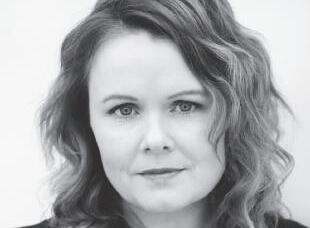
Programme Coordiantor
t: +353 61 204 327
e: rosemary day@mic ul ie
as someone who has been involved in television and film over many years, I had moved into the area of programming, production and film development I was keen to return to college to study for my Masters to increase my knowledge but also to complete my thesis in my area of expertise the Master of arts in Media studies at MIC stood out immediately for me as a programme that was comprehensive but also had the department staff that I respected and valued It was an exceptional opportunity for me to return to study at a campus that was welcoming and provided exceptional support and encouragement. I graduated with First Class Honours and started work immediately after graduation. I have had a varied career to date as an actress, film producer, producer of the Carlow arts Festival and artistic director of the Kerry Film Festival.
Programme overview
the Masters in applied Linguistics aims to provide a broad-based programme of study in language description (language systems: grammar, lexis and phonology), theories of applied Linguistics, theories of second Language acquisition, frameworks for the study of discourse, sociolinguistics, as well as specialist research skills for the empirical analysis of language in context While its main focus is on the use and teaching of the english language in a global context, it addresses a national and international need for professional development among language teachers and language professionals
Assessment Modes
Continuous assessment and dissertation (20,000 words)
*electives offered on basis of adequate student uptake
special Programme Features to offer the optimum flexibility, the programme is offered in fully online or blended format (a combination of face-to-face and online delivery).
career opportunities
the Ma in applied Linguistics programme provides professional development for english language and language teachers generally and also those who work in eLt materials publishing, course development and translation It is of particular benefit to primary school teachers in light of the new language curriculum It can create a structured pathway to further research at doctoral level
duration 12-16 Months (Full-time); 2-3 Years (Part-time) (student intake in January and september)
Fees For up-to-date information please see www mic ie/fees
entry requirements
a 2 2 honours primary degree If you do not hold a 2 2 honours primary degree, you may apply to the programme on the basis of prior learning and related experience on a case by case basis
For non-native speakers of english, IeLts level 6.5 (or equivalent) with no less than 6 0 in any one component
How to Apply
For programme specific application details please go to:
www mic ie/postgraduate
closing date for Closing date is the last Friday in Applications august
contact details dr Joan o’sullivan
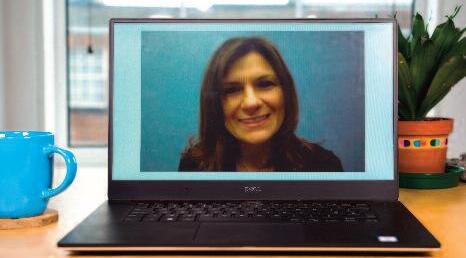
Programme Coordinator
t: +353 61 774735
M: +353 86 3971540
e: Joan osullivan@mic ul ie
eamon Hickson MA in Applied Linguistics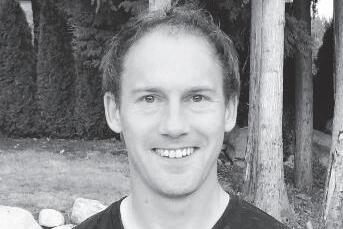
I cannot say enough good things about the programme, the staff and the College From the outset, MIC stood out the support, help and attention that I received from MIC staff (even before I decided to apply) was exceptional Nothing was too much hassle I came from a creative writing and journalism world, which was quite different to most of my classmates However, the electives and the content of core subjects were perfect for me any distance between the lecturer and the students quickly disappeared in this remotely taught programme, such was the genuine support and extensive help offered by the teaching staff at MIC. they knew us all by first names within a few days!
a huge plus for me was that, due to the course content and lecturers’ teaching approaches, I was able to bring my experiences and knowledge into the area of applied linguistics. this brought a new energy and life to the topics as I felt they were more concrete and relatable. this is an experience many of my classmates had too
as with many things in life, what you get from this programme largely depends on what you give to it the experience I had in MIC was beyond my greatest expectations I imagine other third level postgraduate programmes have comparable programme content, similar guest speakers and the same standards However, they do not possess the teaching and support staff of MIC
Programme overview
this doctoral programme in applied Linguistics is a four-year, full-time programme which includes a combination of taught modules (in Year 1 of the programme) and individual research, the principal component being the doctoral thesis In tandem with the doctoral thesis, this programme aims to enhance the professional knowledge of language teachers and language professionals by focusing on the core features of language as a system (grammar, lexis and phonology), language learning and acquisition, as well as language in its broader societal context
Assessment Modes
Year 1: Continuous assessment (taught component)
Years 2-4: student progress reviewed annually by research review Panel
duration 4 Years (Full-time)
Fees For up-to-date information please see www mic ie/fees
entry requirements a first class honours primary degree in applied Linguistics or a related area or
2 1 honours Master's degree in applied Linguistics or a related area or a 2 2 honours Master’s degree, plus relevant experience alternatively, applicants may apply for the Ma in applied Linguistics and transfer to Year 2 of the structured Phd provided they meet progression requirements For non-native speakers of english, IeLts level 6.5 (or equivalent) with no less than 6 0 in any one component is required
How to Apply For programme specific application details please go to: www mic ie/postgraduate
closing date for Closing date for applications is the last Applications Friday in august
contact details dr Joan o’sullivan
Programme Coordinator
t: +353 61 774735
M: +353 86 3971540
e: Joan osullivan@mic ul ie
special Programme Features to offer the optimum flexibility, the taught modules are offered in fully online or blended format (a combination of face-to-face and online delivery)
career opportunities
structured professional development in:
• teaching and Programme design at third-Level
• Language teaching and Language education
• Learning Materials editing and Publishing
• Language Course development
• translation
• Communications
• Journalism
• speech and Language therapy
• Media and Public relations
giovani santos
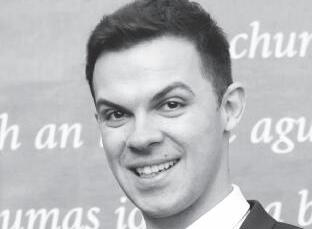
structured Phd in Applied Linguistics
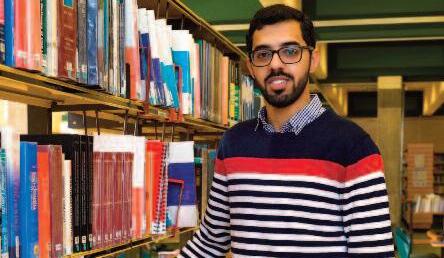
Having completed the Ma in applied Linguistics at MIC I took the next big step in my professional career by undertaking the Phd in applied Linguistics. this programme not only provides me with study and research opportunities in my field of interest, but also access to internationally recognised academics working in linguistics. MIC’s commitment to research is outstanding as evidenced by the range of skills training offered by its research & graduate school, which includes seminars, workshops and practical ‘hands-on’ sessions
MIC also has strong international links with universities across europe and further afield, enabling knowledge exchange through conferences, seminars and lectures with internationally recognised scholars as an international Phd student at MIC, it has meant a lot to me see the College’s commitment to international students spearheaded by the MIC International office
(Face-to-face and/or online)
Programme overview
the Ma/M sc environment, society and Culture focuses on the interplay between natural environment and human society, and covers a range of advanced topics across human and physical geography, drawing heavily on MIC staff research expertise this programme is highly flexible, for instance allowing students to choose, principally via their dissertation research, whether to pursue an arts or science
Master’s qualification the scope of the programme is relatively broad, mirroring the integrated nature of this subject in the real world, and incorporating themes from both the social and physical sciences (i e in disciplinary terms, from both human and physical geography) the subject material covered in the programme draws on the expertise of the staff base, which, while maintaining a general focus throughout on the relationship between environment, society and culture, enables specificity and depth of study on themes related to individual staff members’ research interests.
Assessment Modes
theoretical essays, technical projects, oral presentations, consultancy reports, research proposals, and dissertation.
special Programme Features
the environment, society and Culture Masters programme has both arts and science routes, and students choose a route to pursue depending especially on their dissertation research It is necessary to enrol on one or other degree – Ma or M sc – at the outset, but there are no barriers to students switching their preference later in the programme

career opportunities
there are important environmental, and also moral, reasons to study this programme, but there are also strong professional reasons this is a busy and growing employment sector, and this programme enhances provides both subject-related and transferable skills that are sought after by employers to ensure our students are ready for the world of work, the programme includes a novel environmental Consultancy module, where student groups undertake real-world projects commissioned by external organisations
duration 1 Year Full-time, 2 Years Part-time
Fees For up-to-date information please see www mic ie/fees
entry requirements applicants will be considered for entry on the basis of a primary degree in geography or a cognate discipline at a minimum of 2 2 honours Potential students who do not meet the normal entry requirements may be considered for admission and should contact the Programme director for information
How to Apply For programme specific application details please go to: www mic ie/postgraduate
closing date for deadline is 30 June
Applications see www.mic.ie/postgraduate for programme specific application deadlines
contact details arts office e: artsoffice@mic.ul.ie
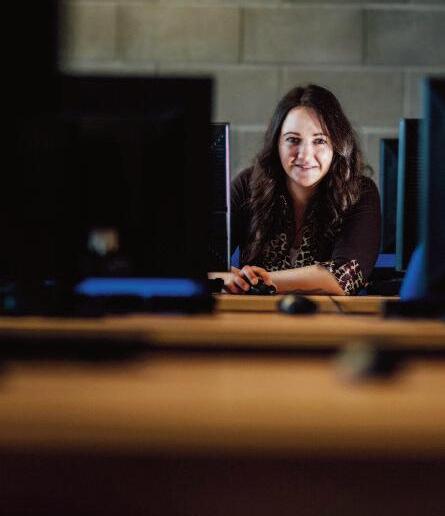
Programme overview
the structured Phd in Contemporary Irish studies at Mary Immaculate College is delivered completely online, and aims to provide a suite of modules that are focused on contemporary issues in Irish society, politics and culture the focus will be on contemporary Irish studies, and how, specifically, the study of a series of interdisciplinary and multidisciplinary areas of the Irish experience can lead to a clearer understanding of the Ireland of today, which will be a baseline for the study of the Ireland of the future the modules will be delivered by experts, all of whom have a track record in publishing in their respective fields
Assessment Modes
assessments are by research essay and thesis. the essay ranges from 4,500 to 5,000 words and each module is assessed by a single essay. the titles and topics of these essays are negotiated between the student and the programme lecturer, with the parameters of choice being set by the lecturer.
a number of generic research and methodology modules are also undertaken, which provide preparation for the work of the thesis the other element of assessment is an 85,000 to 100,000-word research thesis
Career opportunities include: Irish cultural sector; areas involving aspects of Irish culture, literature and society; advocacy; lobbying; teaching; entry to Phd programmes; technical writing; media work; civil service; web editing; academic administration, magazine publishing (hard copies and online editions); advertising and marketing; arts administration; library administration; teaching english language and literature in other countries; Human resources; digital copywriter; lexicographer; online editor; and webmaster
duration
4 Years (Full-time)
Fees For up-to-date information please see www mic ie/fees
entry requirements For programme specific entry requirements please go to:
www mic ie/postgraduate
How to Apply For programme specific application details please go to:
www.mic.ie/postgraduate
closing date for general application deadline is 31 May Applications see www mic ie/postgraduate for specific details
contact details dr eugene o’Brien
Programme Coordinator
t: +353 61 204989
e: IrishstudiesPhd@mic ul ie
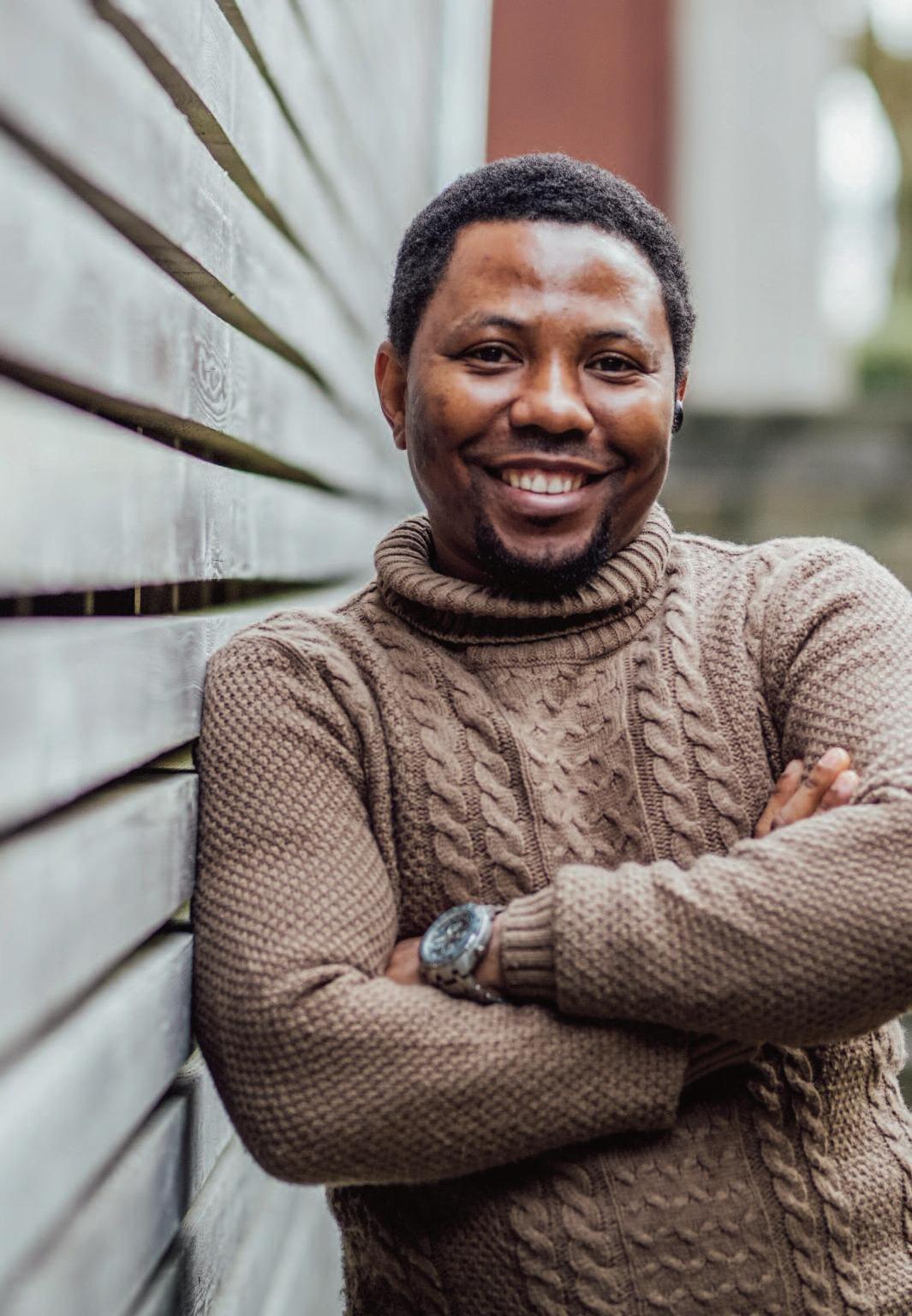

The lecturers and programme coordinator were incredibly supportive, and always on hand to help with understanding or discussing programme material
the Faculty of education at MIc offers a number of education postgraduate studies programmes by research and thesis Prospective postgraduates are encouraged to explore the research interests of the relevant department and to discuss their own ideas for research proposals with the respective department Heads or other Faculty as appropriate.
FAcuLty oF educAtIon departmental research expertise include:
Department of Learning, Society and Religious Education
• Philosophy
• Policy and Leadership of education
• religious education
• Pedagogy of History
• Pedagogy of geography
• development education and Intercultural education
• transforming education through dialogue (ted) Project
dr Maurice Harmon
Head of department
t: +353 61 774720
e: Maurice Harmon@mic ul ie
Department of Language and Literacy Education
• Literacy education
• educational disadvantage
• statistical reasoning
• Mathematical Problem solving
• Psychological Perspectives on Literacy development
seán de Brún
Head of department
t: +353 61 204329
e: sean.deBrun@mic.ul.ie
Department of Arts Education and Physical Education
• Primary Physical education, Coaching, Physical activity and Youth sport
• applied drama and theatre education; arts-Based educational research Methods
• Communities of Musical Practice; Music and asylum seeking; Music and Wellbeing, Informal and Formal Pedagogical Practices in Music education
• social Justice and teacher education
dr déirdre ní chróinín
Head of department
t: +353 61 204 553
e: deirdre nichroinin@mic ul ie
Department of Reflective Pedagogy and Childhood Studies
• Policy and Practice in earlyYears and Primary education
• Children’s Lives, rights and Participation
• Inclusive early Years and Primary education
• reflective Practice
• adult and Further education
• Mentoring and Leadership in early Years and Primary education
dr Lisha o'sullivan
Head of department
t:+353 61 204385
e: Lisha.osullivan@mic.ul.ie
Department of Educational Psychology, Inclusive and Special Education
• special education/Inclusion Policy and Practice
• Leadership and Management in Inclusive special education
• Parent-Professional Partnership in education
• Positive Behaviour support
• Inclusive and special education in global development Contexts
dr Johanna Fitzgerald
Head of department
t: +353 61 61 204517
e: Johanna Fitzgerald@mic ul ie
Department of STEM Education
• undergraduate and postgraduate steM education
• Key paradigms and critical perspectives in steM education
• disciplinary (mathematics, science, information and communication technologies) and Integrated approaches to steM education
• Key paradigms and critical perspectives in steM education
• steM communications and industry
dr Aisling Leavy
Head of department
t: +353 61 204 978
e: Aisling.Leavy@mic.ul.ie
School of Education (Post Primary) - MIC Thurles
• Post-Primary teacher education Programmes
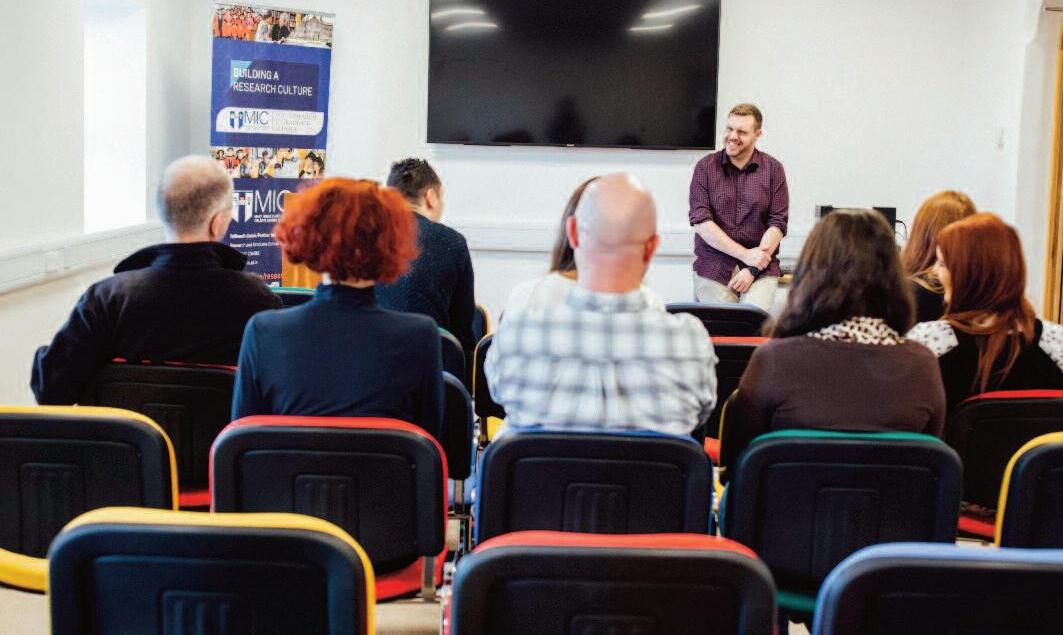
• educational Leadership and Mentoring
• Individual disciplines: accounting, Business studies, gaeilge, Mathematics, and theology and religious studies
• Inclusive education
• entrepreneurship
• development of collaborative projects between schools and MIC thurles Campus
dr Finn Ó Murchú
Head of school
t: +353 504 202 534
e: Finn oMurchu@mic ul ie
Contact Details
education office
t: +353 61 204355
e: edPostgrad@mic.ul.ie
this Level 9 postgraduate qualification aims to encourage and promote best practice in Higher education teaching, learning and assessment and to empower staff and students to be responsive to the changing needs of the Higher education landscape and broader society It is designed for those who teach in Higher education, both new to the sector and those with more experience, and seeks to offer individualised learning pathways which are grounded in academic practice
the programme adopts a unique approach to supporting the professional learning of those who teach in Higher education: working closely with a mentor, participants are encouraged to engage in their own choice of practice-based professional development activities, and to design, implement and evaluate a teaching and learning initiative in an academic context of their choosing through the creation of a digital portfolio, participants critically reflect on these activities and their impact on practice the programme also seeks to harness the enormous potential of peer learning and participants work in peer groups to share practice and provide ongoing and constructive feedback
this fully flexible and online programme offers a contextualised approach to professional development that is grounded in everyday practice and is based on the specific professional experiences and interests of individuals who teach or lead in Higher education.
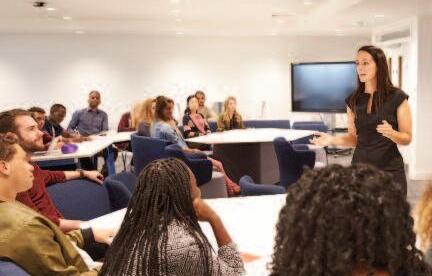
this programme is assessed through the creation (or updating) of a digital teaching and learning portfolio.
career opportunities
the programme is aimed at those who currently have a teaching role in Higher education, to be interpreted broadly as encompassing academic staff and professional services staff with a teaching element to their role the programme thus offers a pathway to progression and further leadership opportunities within Higher education academic practice
duration
1 Year
Fees For up-to-date information please see www mic ie/fees
entry requirements
the programme is intended to enhance the practice of all those who teach as part of their role in Higher education, e g academic staff across disciplines, educational/learning technologists, educational/academic developers, research staff, library staff, support staff and students who teach others, including graduate teaching assistants and those who engage in peer-assisted learning In order to gain maximum benefit from the practice-based focus of the programme, applicants are required to be currently active in a teaching and learning context, which can be interpreted broadly at the discretion of the programme coordinator Prospective applicants should contact the programme coordinator to discuss entry requirements
the minimum academic entry requirement is an undergraduate degree at Level 8 (QQI)
How to Apply
For programme specific application details please go to:
www mic ie/postgraduate
closing date for the programme accepts applications for Applications both a september and January start, subject to minimum numbers Please contact the programme coordinator for more information
contact details dr Laura Costelloe
Programme Coordinator
t: +353 61 204709
e: Laura Costelloe@mic ul ie
Programme overview
this Level 9 graduate Certificate is taught in four modules, over one academic year, using a combination of face-to-face and online teaching methods the modules are taught by experienced professionals from both Mary Immaculate College and Middletown Centre for autism gCas has been designed and developed in collaboration with autistic community members the Certificate explores overlapping areas from experiential, educational, and supportive perspectives such as:
understanding Autistic experience: this module details how autism presents and is diagnosed, the core strengths of autism and how the sensory and social environments may create challenges for autistic people students will explore and analyse some of the cognitive theories of autism, as understanding these promotes understanding of autistic experiences
visual Learning and environmental support for Autistic People: the aim of this module is to provide students with the theory and practical application in understanding the visual learning-style strength of autistic people so as to enable an autistic person to achieve a goal that is important to them
understanding Behaviour and sensory Processing: autistic people commonly experience differences in how they process sensory information, when compared to non-autistic people. this module aims to provide

students with theory and practice related to understanding the distressed response and supporting positive sensory experiences for autistic people
Managing Anxiety for Autistic People: research and practice indicate that many autistic people experience high levels of anxiety the aim of this module is to explore the reasons behind this, both environmental and internal processes, and strategies to support the autistic person in different settings and environments

Assessment Modes students will be required to engage weekly with a range of research papers, podcasts, videos and reflective exercises as part of the programme the online content is delivered through and supported by MIC’s Moodle platform all students will be enrolled as students of MIC and will be required to complete formal assessment prior to the award of the graduate Certificate successful completion of the graduate Certificate in autism studies (gCas) provides students with 30 eCts/60 eCt points
special Programme Features the face-to-face component of the graduate Certificate will be delivered on a maximum of 5-6 saturdays across the academic year in Mary Immaculate College and in one other agreed location some live lectures will be delivered online career opportunities the graduate Certificate in autism studies will benefit those living or working with autistic individuals in education, health, leisure and community settings.
duration
1 Year
Fees For up-to-date information please see www mic ie/fees
entry requirements a Bachelor's degree or a Level 8 qualification or equivalent in any discipline
How to Apply
My youngest child was diagnosed with asC IN 2018 and since then my goal has been to be the best possible support to her I decided to enrol in the gCas initially to extend my understanding of autism and to obtain the knowledge to establish effective home supports. It was the best decision I ever made. I have learned so much throughout the programme, all of which is beneficial to my daughter but also to me in the progression of my career the programme content is excellent and also highly interesting. the lectures are engaging and there is variety between live and recorded lectures the topics are covered extensively and the voice of the autistic individual is always at the forefront I have no doubt that the programme will benefit me greatly as I continue with further learning. the support from lecturers and co-ordinators is excellent and I have had constant contact with other students, staff from MIC and Middletown I would recommend anyone considering this programme to go for it It is a decision you will not regret
For programme specific application details please go to: www mic ie/postgraduate Please note that while the gCas programme is offered each academic year, the gdas and Ma programmes are offered on alternating years, as follows:
academic Year 2023-24: gCas and gdas
academic Year 2024-25: gCas and Maas
academic Year 2025-26: gCas and gdas
closing date for see www mic ie/postgraduate for programme specific Applications application deadlines
contact details
Mary Immaculate college
acting Coordinator
Kim Maguire
e: Kim Maguire@mic ul ie
Middletown centre for Autism (nI)
Majella Nugent
t: +44 (0) 28 3751 5750
e: gCas@middletownautism com

Programme overview
this Level 9 graduate diploma in autism studies (gdas) is a progression from the Level 9 graduate Certificate in autism studies gdas is taught in three modules, over one academic year, using a combination of face-to-face and online teaching methods the modules are taught by experienced professionals from both Middletown Centre for autism and Mary Immaculate College the diploma is designed to enable students to develop the capacity for evaluating research and using this evaluative process to design bespoke supports that are grounded in quality research for autistic service users gdas has been designed and developed in collaboration with autistic community members
the gdAs will:
• enable students, independently and with others, to critically evaluate autism research and develop methods of integrating research into daily practice;
• develop students’ knowledge and understanding of the key milestones in autism research and how these have impacted on practice;
• develop students’ understanding of the critical nature of research and how it is used in both impacting practice and policy;
• empower students to foster an inclusive and equitable approach to research the programme consists of three modules:
Autism research Into Practice will provide students with an overview of the key research-based milestones in autism and how research has and continues to change practice and develop our understanding of autism. students will explore current research trends and will develop critical evaluation skills to distil key implications for practice from research publications and research-based policy documents. this module will encourage students to create a culture of research into practice.
research Methods: will introduce students to research methodology, such as qualitative, quantitative and mixed methods of research this module will focus on developing research skills and conducting desk-based research using a review of relevant literature this process is an essential prerequisite to students conducting their own research project involving a review of literature in the second semester of the programme
research in Autism: will teach students the process of reflective practice and enable students to complete a review of relevant literature on a topic of interest to them in autism this process is intended to prepare students to pursue further study and research within the field of autism studies, whilst also bridging the gap between research and practice
Assessment Modes
Participants will be required to engage weekly with a range of content e g lectures, readings, videos, podcasts the online content is delivered through and supported by MIC’s Moodle platform all students will be enrolled as students of MIC and
will be required to complete formal assessment prior to the award of the graduate diploma successful completion of the graduate diploma in autism studies (gdas) provides students with 30 eCts points
special Programme Features
the face-to-face component of the graduate diploma will be delivered on a maximum of 5 saturdays across the academic year in Mary Immaculate College and in one other agreed location some live lectures will be delivered online
career opportunities
the graduate diploma is autism studies will benefit those working with or living with autistic individuals, and particularly those who seek to pursue further qualifications within the field of autism studies
duration 1 Year (Part-time)
Fees For up-to-date information please see www mic ie/fees
entry requirements
a Bachelor’s degree at Level 7 or 8 in any discipline aNd a post-graduate qualification in autism studies with a minimum of 30 eCts graduates of the gCas programme (or equivalent post graduate programme in autism studies) must earn a minimum 2 1 award to be eligible for entry to the gdas programme
english Language requirements: applicants for whom english is not a first language must provide evidence of their proficiency level english in the form of an IeLts (International english Language testing system) composite score of 6 5 – 7 0 with no less than 6 0 in any one component, or IeLts equivalent accepted by uL such applicants will also be required to undergo an interview through english
How to Apply For programme specific application details please go to: www mic ie/postgraduate
Please note that while the gCas programme is offered each academic year, the gdas and Ma programmes are offered on alternating years, as follows:
academic Year 2023-24: gCas and gdas
academic Year 2024-25: gCas and Maas
academic Year 2025-26: gCas and gdas
closing date for see www mic ie/postgraduate for programme
Applications specific application deadlines
contact details Mary Immaculate college acting Coordinator
Kim Maguire
e: Kim Maguire@mic ul ie Middletown centre for Autism (nI) dr rachel Ferguson
t: +44 (0) 2837515750
e: rachel Ferguson@middletownautism com
Programme overview
the one-year Level 9 Ma in autism studies is designed to equip students with the requisite knowledge and skills to design and conduct an empirical study on a topic within the field of autism studies students will develop expertise in research design, data collection, and analysis, and will demonstrate the capacity to interpret and critique research findings in the context of policy, practice, and research It is taught over one academic year, using a combination of face-to-face and online teaching methods
students on the MA in Autism studies will:
• develop expertise in research design, data collection, and analysis
• develop expertise in finding, accessing, reading, and evaluating key research articles and reports, and using knowledge gained to develop a sound research question and proposal
• enhance their capacity to interpret and critique research findings and consider these findings in the context of further research, policy, and practice
• demonstrate knowledge about current research topics and considerations in the field of autism studies

semester 1: students will join with other Masters students to develop the range of skills required to conduct a research project students will demonstrate their ability to interrogate a range of literature and policy, and to develop a research question which is relevant and meaningful to contemporary discourse in autism research. students will gain familiarity with a range of research methodologies, both qualitative and quantitative, and will develop a critical understanding of the research process.
semester 2: students will design and conduct an empirical research project on a topic of their choosing in autism research students will work under the close supervision of faculty from Mary Immaculate College and/or Middletown Centre for autism, and will receive mentoring and feedback on an ongoing basis these modules include workshops, discussion sessions, and lectures, alongside supervision
students will be required to engage weekly with a range of content (e g lectures, readings, videos, etc ) the online content is delivered through and supported by MIC’s Moodle platform Modules are assessed through the submission of a research statement and a research dissertation
Consistent with both gCas and gdas, the Ma is not designed with a specific profession or student profile in mind this is in an effort to ensure that students from a wide range of professional and personal backgrounds can engage in cutting edge research in the field of autism studies, and apply their research in whatever professional or personal context is most relevant and appropriate for them
duration
1 Year (Part-time)
Fees For up-to-date information please see www mic ie/fees
entry requirements this programme is designed to build on both the existing gCas and gdas programmes graduates of the gdas programme must earn a minimum 2 1 award to be eligible for entry to the Ma programme
In cases where the applicant has not completed the gCas and gdas programmes but can demonstrate comparable expertise and training, the applicant can be assessed on prior learning in line with university policy and procedures on the recognition of Prior Learning the admission procedures will include an interview wherein the prior learning and experience of applicants in education will be assessed
How to Apply
For programme specific application details please go to: www mic ie/postgraduate
Please note that while the gCas programme is offered each academic year, the gdas and Ma programmes are offered on alternating years, as follows:
academic Year 2023-24: gCas and gdas
academic Year 2024-25: gCas and Maas
academic Year 2025-26: gCas and gdas
closing date for see www mic ie/postgraduate for Applications programme specific application deadlines.
contact details
Mary Immaculate college acting Coordinator
Kim Maguire
e: Kim.Maguire@mic.ul.ie
Programme overview
We intentionally pay attention to you, where you are and where you want to be We invite you to develop both as a person and professionally We focus on real life contextsensitive areas to which you wish to apply your existing and emerging leadership and mentoring skills We place a strong emphasis on change wisdom because we know leadership can be a challenging yet a rewarding and a positive experience the programme is offered to all aspiring and existing middle leaders irrespective of school or workplace setting
We suggest there are a number of reasons for you to consider MIC thurles’ suite of postgraduate programmes (NFQ Level 9) in the field of Middle Leadership and Mentoring. Considerable emphasis is currently placed on school leadership with publications such as Looking At Our Schools (des, 2016), the establishment of the Centre for school Leadership (CsL) and recent teaching Council publications such as COSÁN (professional development framework) and CÉIM (initial teacher education).
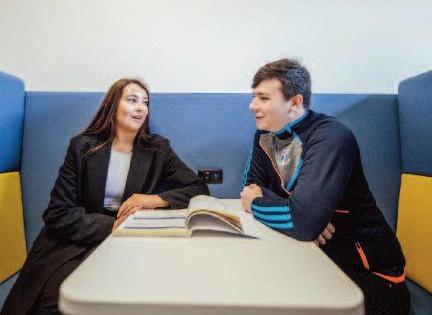
to assist you learn and reflect about yourself as a person and as a leader in educational settings; to support and challenge you regarding the mentor and leader that you wish to be; to offer a deeper understanding of pedagogy, for pedagogy is ultimately what you will be leading; and to support your exploration and contribution to research including meeting lead researchers/ policymakers from around the world, such as Michael Fullan, Jim spillane and Barrie Bennett
there are a range of assessment modes adopted to capture the theoretical and applied dimensions of the programme the focus on praxis (Freire) allows for the inclusion of written assignments, opportunities to critique application of leadership and mentoring in practice, poster presentations and portfolio-based assessment
career opportunities
Leadership can sometimes be about where you want to be and other times it is about who you want to be where you are this programme is endorsed by the Centre for school Leadership, the National association of Principals and deputy Principals Post-Primary (NaPd), and by the Irish Primary Principals' Networks (IPPN)
It offers participants a wealth of opportunities to learn about leading and mentoring so as to support their competence and confidence should they wish to apply for middle and senior leadership positions in education.
this programme was delivered in a detailed and clear manner with the perfect balance between theory and practice. one of the core strengths, from my perspective, was the guest speakers. We had speakers who held leadership roles in educational settings and beyond. this enabled me to apply and transfer leadership qualities, that I had developed in my personal life, and to apply them to my professional career due to the nature of the programme, and the way it is laid out, one can excel in their professional career and in their academic career simultaneously this is an excellent programme for anyone looking to develop their leadership skills in an educational setting
duration 1 Year (Certificate); 2 Years (Masters)
Fees For up-to-date information please see www mic ie/fees
entry requirements
applicants should possess a second class honours (2 2 minimum) primary degree (Level 8, NFQ) in a relevant or cognate discipline that incorporates a substantial educational component It is expected that applicants should have a minimum of two years’ experience as a teacher or as a worker in an educational setting the applied nature of the programme usually requires participants to be working in an educational or similar peoplefocused setting entry criteria into the graduate diploma or the Masters in education (Middle Leadership and Mentoring) is contingent on achieving a second class honours (2.2 minimum) in the Certificate in Middle Leadership and Mentoring the Masters programme can be taken in one calendar year
How to Apply
For programme specific application details please go to: www mic ie/postgraduate
closing date for see www mic ie/postgraduate for programme Applications specific application deadlines
contact details dr Finn Ó Murchú

Head of the school of education (Post-Primary) MIC thurles
t: +353 504 202 534
e: Finn oMurchu@mic ul ie

Programme overview
the aim of the programme is to provide substantial theoretical and practical continuing professional development to teachers working with students deemed to have special educational needs and/or who require learning support in primary, post-primary and special schools and other recognised educational settings
Indicative modules
1 the theory and Practice of Collaborative Leadership
2 assessment, teaching and Learning in Language, Literacy and Mathematics
3 Critical Influences on Child Cognitive, social, emotional and Behavioural development
4 Collaborative Practice for assessment, teaching and Learning
Assessment Modes
there are no formal written examinations involved in the course Participating teachers will be assessed on the basis of full attendance across the eight-week block release and four saturdays, engagement with course content and activities, successful completion of selected tasks and written assignments and supervision and evaluation of teaching in schools/centres
career opportunities
Participants who successfully complete the Post graduate diploma in Inclusive special education, and who meet the relevant entry requirements, will be eligible to seek admission to Year 2 of Masters in Inclusive special education (Med Ise) programme offered in the Faculty of education in collaboration with the department of educational Psychology, Inclusive and special education Credit for completion of the postgraduate diploma will be given to those who progress to the Med Ise programme.
duration graduate diploma 1 Year (Full-time), M ed 1 Year (Part-time)
Fees the graduate diploma is funded by the teacher education section of department of education & skills
For up-to-date information please see www mic ie/fees
entry requirements
after my first few years teaching in a special school, I knew I needed and wanted to know more about the ever-evolving world of special education the PgdseN in MIC appealed to me as an opportunity to take a step away from the classroom, and reflect on my teaching and learn new ideas It was a great decision! this programme changed and enhanced the way I teach and think about special education ever since, and I still use things I learnt and still quote the people I heard
the quality of teaching, knowledge, support and input we received was second to none the ideas and resources we were shown still influence my daily work the assignments were based around my class and of benefit to my students, and while I have continued in academia the PgdseN still proves to have been the most relevant professional development programme I ever completed I think it should be a prerequisite to special education teaching!
the programme is open to teachers in recognised positions funded by the de and who provide special educational teaching in special schools, primary schools, postprimary schools and other recognised educational services outlined in the de Circular a limited number of places is available at six higher education institutions in Ireland, including Mary Immaculate College. teachers must have a teaching Council number, and must teach a minimum of 11 hours in special education in their setting
How to Apply the teacher education section of the des publishes a circular annually with application details and form, usually in late January
For programme specific application details please go to: www.mic.ie/postgraduate
closing date for see www mic ie/postgraduate Applications for details (usually the end of March)
contact details
graduate diploma in special education
elaine gleeson
t:+ 353 61 204550
e: elaine gleeson@mic ul ie
M ed in special education
Caroline Coyne
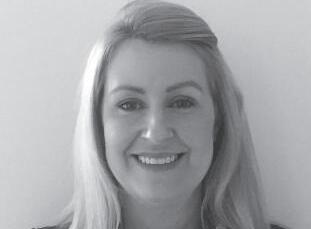
Coordinator taught Postgraduate Programmes
t: +353 61 204358
e: Caroline Coyne@mic ul ie
Programme overview
the graduate diploma is recognised by the teaching Council as a professional teaching qualification for the Further education sector It is designed to enable students to develop their professional values, knowledge and action in the following ways: to critically engage with the theory and practice of adult/further education;
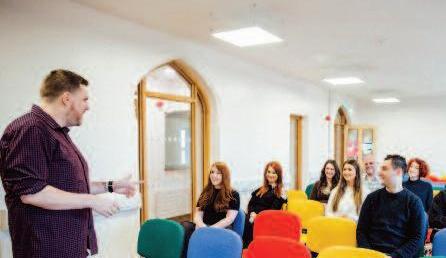
· develop students’ knowledge and skills in curriculum planning, teaching and assessment;
· Promote a capacity and a commitment among students to reflective practice, enquiry and research;
· enable students to create and sustain learning relationships with learners; and

· Foster a commitment to the values which underpin the professionalism in teaching.
Programme content includes the theory and practice of adult education and lifelong learning (psychological, philosophical, historical and sociological perspectives), teaching, learning, curriculum planning and assessment
Assessment Modes
a variety of assessment modes are utilised on the programme these include course work, presentations, a portfolio and an action research project
special Programme Features
the graduate diploma is taught using a blend of learning situations (onsite, online and teaching practice). Precise schedules vary from year-to-year.
career opportunities
the graduate diploma in adult and Further education is intended for graduates planning to teach in the adult and further education (Fe) sector and for teachers already working in this area who wish to further develop their professional practice. this programme is also suitable for individuals interested in pursuing a career in adult education, lifelong learning or community work Former graduates have also embarked on careers in training and development
this programme offers a progression option to a Master’s degree, subject to certain achievement criteria
duration 1 Year (Full-time); 1 5 Years (Part-time)
Fees For up-to-date information please see www mic ie/fees
I chose the graduate diploma in adult and Further education as I always wanted to pursue a career teaching media the blended learning format suited my lifestyle as I was working while studying, and I also have a young family returning to higher education after an absence of over a decade initially unnerved me However, I was soon put at ease by incredibly supportive lecturers, a friendly campus, and a fantastic group of peers
the theoretical insight that I gained while completing the programme was practical and modules like curriculum studies gave a great insight into Further education in Ireland approaches like problem-based learning and micro-teaching brought the learning theories and learning styles to life I have a strong interest in ICt and this component of the programme was hugely beneficial and explored a vast range of tools to aid teaching and learning in a digital age Completing the programme was a challenging but rewarding process, and the experience has proven invaluable for teaching in today's online world
entry requirements
Candidates will normally have a primary degree or equivalent at Level 8 on the National Framework of Qualifications (NFQ) a Level 7 qualification may also be acceptable together with recognition of prior learning (rPL), requiring the prepapration of an rPL portfolio which is then assessed
How to Apply
For programme specific application details please go to: www mic ie/postgraduate
closing date for general application deadline is 31 May Applications see www mic ie/postgraduate for programme specific application deadlines
contact details dr Cathal de Paor
t: +353 61 204950
e: Cathal dePaor@mic ul ie
Programme overview
the graduate diploma in ICt in Primary education comprises ten taught modules there is a strong emphasis in gaining hands-on experience and training in the use of a wide variety of hardware and software applications the first module covers a general introduction to the use of ICt in education with a strong focus on the use of word processing in schools the content of other modules consists of: computers in school management, multimedia authoring, website design, computer programming for children, classroom presentation tools, ICt and special educational Needs, and ICt and classroom organisation the graduate diploma also includes a double-weighted research project module, where participants explore and investigate an area of digital Learning of their own choice
Assessment Modes
the assessment of the graduate diploma consists of the completion of a project in most modules some of the projects include the creation of digital resources while others are more focused on the completion of a written research report the programming module includes some in-class practical skills assessment
special Programme Features
the classes comprise of a mixture of face-to-face sessions and online learning Face-to-face classes are scheduled for Friday evenings and saturday mornings throughout both semesters
career opportunities
the programme is ideally suited to teachers who have a strong interest in the area of digital learning in schools, and who have a vision of whole-school development that includes a strong ICt component
Previous graduates of the programme have gained positions as Pdst tutors, ICt regional advisors, ICt co-ordinators, school inspectors, college lecturers and school principals
duration
1 Year part-time for grad dip in ICt in Primary education leading to one further year of part-time study for M ed in ICt in Primary education
Fees For up-to-date information please see www mic ie/fees
entry requirements this programme is open to all qualified teachers, but is particularly suited to those working at primary level
undertaking postgraduate study in MIC really opened my eyes to a whole new aspect of education and emphasised the value of research rigour and analysis in formulating future educational directions Completing the dissertation was both a challenging but hugely rewarding process, which was comprehensively facilitated by the learning structures provided by MIC Lectures provided were relevant to the needs of students and aligned well with current educational practise and requirements.
College staff were always on hand to offer support and really guide their students through the process, ensuring that the standard of dissertation produced is always of a high quality
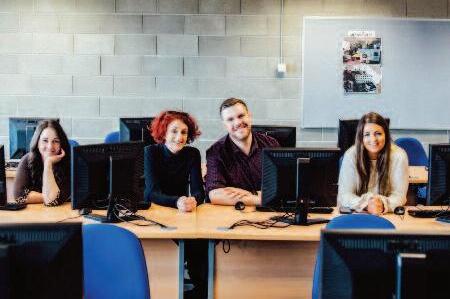
How to Apply For programme specific application details please go to:
www mic ie/postgraduate
closing date for general application deadline is 31 May Applications see www mic ie/postgraduate for programme specific application deadlines
contact details
Brendan Barry
Programme Coordinator
t: +353 61 204941
e: Brendan Barry@mic ul ie
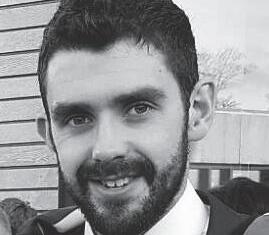
Programme overview
the Professional Master of education (Primary teaching) is a two-year, full-time Level 9 postgraduate professional teacher education programme designed to qualify graduates as primary teachers the programme is designed to equip student teachers with the cognitions and competencies necessary to develop creative and flexible approaches to teaching in different contexts and settings embracing pupils with diverse and often complex needs thematic in nature, the programme focusses iteratively on students’ role as learner, teacher, researcher and leader In addition to the established broad range of curriculum and foundation studies areas studied traditionally within initial teacher education programmes at MIC, this programme contains a strong spine of research methods modules which culminate in the reporting educational research module.
Assessment Modes
a range of assessment modes comprising written examinations and course work including ICt/ digital Learning course work and group presentations assessment of school placement and micro-teaching is also a core component of this programme
special Programme Features
this programme provides students with the opportunity to spend two tréimhse Foghlama sa ghaeltacht all students will complete a research dissertation in their second year of the programme the students also have the opportunity to undertake a number of school placement experiences across a range of classes over the course of the two years and assessment and mentoring supports the student during this process
career opportunities
on successful completion of the programme, students are qualified to teach all class-levels in the primary school, from junior infants to sixth class. they are also qualified as a special education teacher (set) to provide support to students based on their individual learning needs.
duration
Fees
2 Years (Full-time)
For up-to-date information please see www.mic.ie/fees
entry requirements the PMe is sanctioned by the department of education and skills on a yearly basis once the programme is sanctioned the PMe section on the MIC website will be updated with full details, including the most up-to-date entry requirements since 2019, candidates wishing to apply for the PMe Programme are required to take an oral Irish exam before applying to MIC for the programme
applicants will be required to take the teastas eorpach gaeilge (teg)
Level B1 oral Irish examination
Full details on the exam, including the application form for the exam, are available at www teg ie
Aaron o’Halloran Professional Master of education
the PMe programme is a very demanding but rewarding programme the broad range of content covered throughout the programme will have you well-prepared, not only as a teacher, but also if you would like to further your career within the school system or in a departmental role With top class lecturers, who are experts within their areas of study, you will study everything from pedagogy and methodologies to policy and leadership You are also exposed to a lot of school placement, which is the most enjoyable experience and the best preparation for you as a student teacher My experience on the programme has been a very positive one and I would highly recommend applying if working with children is something that you aspire to do
For programme specific application details please go to: www mic ie/postgraduate
closing date for application deadline usually in March
Applications For up-to-date details please refer to www mic ie/postgraduate
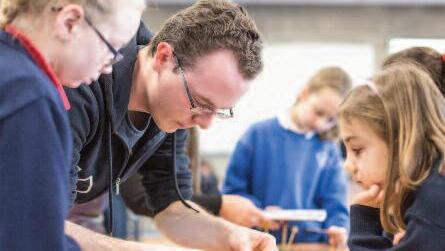
contact details
dr Margaret Nohilly
Programme Coordinator
t: +353 61 774744
e: Margaret Nohilly@mic ul ie

Programme overview
the Master of education (M ed) programme is designed for all those interested in enhancing their professional knowledge, understandings and skills offered on a full-time (1 year) or part-time (2 year) basis, a modular design enables students to register for specific core M ed modules and select others from a diverse range of electives, thus accumulating credits in a flexible way In this fashion, students will build their own customised M ed from the available modules tailored to their own professional specialisation, research areas and personal interests this hybrid model, which comprises an innovative, interconnected, future-ready suite of modules will promote teacher agency in their learning and workplace as well as providing a unique, rigorous and compelling intellectual challenge
the programme is comprised of the following modules:
• systematic approaches to Practitioner research
• Inclusive education Policy and Practice
• Principles and Practice of research in education
• National and International trends and Current Issues
• dissertation modules 2
students can also choose from three electives in the area of leadership, wellbeing, global citizenship, religious studies, adult education and digital learning
Assessment Modes
Modules are assessed through a combination of continuous assessment and end-of-term assessment the programme includes innovative techniques for mapping the research process; these techniques are folded into the modes of assessment a cumulative grade point average system is used to recognise and reward work throughout the programme
special Programme Features
M ed modules will be delivered through a complementary blend of authentic, relevant and flexible online and onsite learning opportunities attendance (face-to-face and virtually) at lectures and workshops will be a requirement for all
career opportunities graduates of the programme are working as teachers, principals, inspectors, lecturers and researchers in schools, colleges universities at home and abroad.
duration 1 Year (Full-time); 2 Years (Part-time) entry into M ed Year two: 1 Year (Progression from graduate diploma 1 Year)
Fees For up-to-date information please see www mic ie/fees
entry requirements
Judy Meskell Master of education (M ed)after a number of years teaching in mainstream classrooms and special education teacher settings, I desired to deepen my knowledge of education and effective provision I chose the Master of education in MIC as I had previously studied on the exemplary graduate diploma in special education in the College, but on this occasion, I wanted to delve further into an alternative area of education the M ed enabled me to discover the interests that drive me as an educator I was afforded the opportunity to engage in a research process entirely of my own choice and I was guided by the wonderfully supportive lecturers involved with the programme the understanding, confidence and knowledge I gained along the way made the entire experience hugely worthwhile and beneficial
applicants will be considered for direct entry into the M ed programme on the basis of possession of a Primary degree in education (Level 8 NFQ) at a minimum of Honours 2 2 applicants who have a 2 2 Honours degree in other disciplines may be considered if they have substantial and relevant professional experience. applicants for the fulltime programme must provide an outline of the dissertation proposal (500 words) as part of their application For direct entry into Year 2 of the part-time programme, must hold a Professional development graduate diploma in education (Level 9 NFQ) at a minimum of Honours 2 1
For programme specific application details please go to: www mic ie/postgraduate
closing date for general application deadline is 31 May Applications see www mic ie/postgraduate for programme specific application deadlines
contact details dr emma o'Brien
Programme Coordinator
t: +353 61 204785
e: emma oBrien@mic ul ie
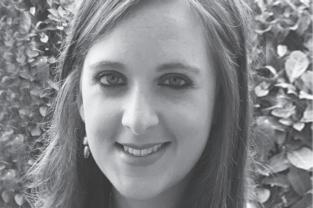
Key Features
a future focused programme which adopts an integrated approach to developing 21st century educational leadership skills, the programme encourages learners to explore the relationship between open and connected leadership, eleadership, digital literacies, digital wellbeing, digital edI and digital pedagogies which are key for modern educational leadership and a successful digital learning ecosystem
• delivered using a hyflex model learners can choose how they wish to engage with the programme material and with each other Learners will cultivate cross-sectoral communities of practice to work collaboratively to bridge theory and practice and develop a digital learning ecosystem that considers the needs of the whole educational community including students, educators, parents and communities
• Based on an innovative, inclusive digital pedagogical approach the programme models and fosters a transformative digital learning experience based on principles of universal design for Learning, Heutagogy, transformative Learning and Learner agency.
• Learners will reflect on the dilemmas and problems experienced within a digital-learning era and how they can become agents for change at micro, meso, macro and mega levels to develop a sustainable model of digital learning within their institutes and across the education sector as a whole
Programme overview
the programme is comprised of the following core modules:
• systematic approaches to Practitioner research
• digital Pedagogies
• digital equality, diversity and Inclusion (edI)

• Principles and Practice of research in education
• open and distributed e-Leadership
• digital Literacies and Wellbeing
• digital Learning Infrastructure
• dissertation Modules
Assessment Modes
Continuous assessment including a dissertation career opportunities
the M ed in digital Leadership in education is designed for those working in education to support them to lead, design, implement and evaluate an integrated and innovative model of digital learning within their educational contexts. Learners will work collaboratively to solve problems that explore the elements key to a successful digital learning ecosystem in particular the relationship between digital learning policy; digital pedagogies; digital equality, diversity and inclusion (digital edI); open and distributed e-leadership; digital literacy and wellbeing and digital infrastructure when planning digital learning in their individual schools or educational institutes.
duration 1 Year (Full-time), 2 Years (Part-time)
Fees For up-to-date information please see www mic ie/fees
entry requirements
applicants should hold a relevant degree / Postgraduate diploma / Professional Master at 2.2 Honours Level or higher (Level 8National Framework of Qualifications)
How to Apply For programme specific application details please go to: www.mic.ie/postgraduate
closing date for general application deadline is 31 May
Applications this date may differ for some programmes see www mic ie/postgraduate for programme specific application deadlines.
contact details dr emma o’Brien
Programme Coordinator
t: +353 61 774785
e: emma.oBrien@mic.ul.ie
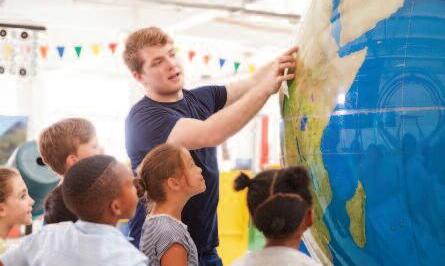
In response to current contemporary issues of climate change, a loss in biodiversity and challenges to world peace, challenges for educators are immense a new programme has been designed to equip educators with the pedagogies and theoretical frameworks to consider these issues the programme is designed for those working in education including pre-school practitioners, primary and secondary teachers, and those working in non-formal education the programme will focus on current challenges to sustainability including climate change and loss of biodiversity through global Citizenship education (gCed) the programme aims to focus on agency, empowering students of all ages to assume active roles, both locally and globally, in building more peaceful, tolerant, inclusive and secure societies the programme is designed for those working in education supporting them to integrate education for sustainability and global citizenship in their short term and long term programmes. the is a blended part-time programme over two years, with the on-campus components taking place in MIC Limerick. It also includes field trips to sites including the Burren, the eco Village in Cloughjordan and the aquarium in salthill, galway.
students will be assessed in a range of ways through assignments and continuous assessments. the assignments will be aimed at encouraging learners to reflect on their own practice and the theory they will engage with through the modules Modes of assessment will include digital presentation, poster or written submission the learner will engage in a series of peer activities over the semester that will formatively contribute to their assessments and will foster a collaborative learning community
the programme will allow graduates to enhance their current practice in education settings as well as diversify into leadership and education officer roles in sustainability and global education organisations
duration 2 Years (Part-time)
Fees For up-to-date information please see www mic ie/fees
entry requirements
applicants should hold a relevant degree at 2.2 Honours Level or higher (Level 8National Framework of Qualifications)
In cases where the applicant does not meet normal entry requirements, the applicant can be assessed on prior learning in line with university policy and procedures on the recognition of Prior Learning the admission procedures will include an interview wherein the prior learning and experience of applicants in education will be assessed.
It is expected that applicants should have a minimum of two years’ experience in education
Places on the programme will be offered based on the above, based on qualifications, performance at interview (if applicable), language proficiency level (if applicable), and application form
For programme specific application details please go to:
www mic ie/postgraduate
closing date for general application deadline is 31 May Applications this date may differ for some programmes see www mic ie/postgraduate for programme specific application deadlines
contact details
dr anne dolan
Programme Coordinator
e: anne dolan@mic ul ie
Programme overview
the programme will consider the different theoretical presentations of wellbeing and examine how learners can be empowered to take ownership of the many dimensions of their wellbeing as they progress through their education the programme will demonstrate ways in which wellbeing can be promoted across the curriculum, recognising the impact of the hidden curriculum and the role of the many key stakeholders in education the promotion of teacher wellbeing will also be a significant aspect of the programme with participants being facilitated to reflect on how they internalise the concept in their own lives
the programme will look at wellbeing across the educational spectrum through early childhood, primary and post-primary It will empower participants to reflect on the diversity of perspectives relating to wellbeing in education through participation in face-to-face and online learning. Participants will engage with research pertaining to wellbeing and related areas and will be facilitated in the application of the various paradigms to their own settings.
the M ed draws on the specialist expertise at Mary Immaculate College in a variety of disciplines relating to wellbeing, including physical education, social, personal and health education, and development education the importance of an integrated approach to wellbeing will be evident throughout the programme

Assessment Modes
students will be required to complete formal assessment tasks and a dissertation prior to the award of the M ed degree
the promotion of wellbeing is gaining an increased profile in many settings, including education Hence, the importance and relevance of the M ed in Leadership of Wellbeing in education programme in Mary Immaculate College this two-year part-time Level 9 programme will provide participants with the skills to assume leadership positions in the promotion of wellbeing in a variety of educational settings and in the wider community the programme will equip participants in the development of leadership skills in relation to wellbeing in education In addition, participants will be enabled to conduct high-level research in relation to wellbeing in education, thus providing themselves with a strong evidence-based for future school initiatives
Fees For up-to-date information please see www mic ie/fees
entry requirements
applicants should have at least a second class honours (2 2 minimum) primary degree (Level 8, NFQ) in a relevant or cognate discipline that incorporates a substantial education component
It is expected that applicants should have a minimum of two years experience as a teacher whose work incorporates a significant focus on wellbeing and related fields
Places on the programme will be offered based on the above, qualifications, performance at interview (if applicable), language proficiency level (if applicable), and application form
For programme specific application details please go to:
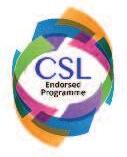
www mic ie/postgraduate
closing date for general application deadline is 31 May Applications see www mic ie/postgraduate for programme specific application deadlines
contact details
dr gerard Farrelly
Programme Coordinator
e: gerard Farrelly@mic ul ie
Or
Caroline Coyne
Coordinator taught Postgraduate Programmes
e: Caroline Coyne@mic ul ie

the flexible, part-time Master of education in educational Leadership and Management (M ed eLM) extends MIC’s strong commitment to the principle of professional development in the education system the programme supports those interested in and/or involved with leadership and management in a multitude of educational contexts in gaining new skills and knowledge to excel the core modules are: Leadership and Management theories; Management and administration in education Contexts; education and the Law; school self evaluation and Whole school Planning; organisational Psychology applied to educational Contexts; Principles and Practice of research in education
a specific focus of this programme is to provide students with a wide range of assessments to both cater for different learner strengths and to prepare students for future careers in leadership and management. the range of assessments include: essays; portfolios; group and individual presentations (oral and written); group and individual projects (oral and written); and a 20,000 word dissertation. Progression therefore remains high. students complete a project in their own educational setting and present their findings to their peers, while modules are delivered by practitioners with wide experience in the relative areas of education
assessment is by essays; portfolios; group and individual presentations (oral and written); group and individual projects (oral and written); and a 20,000 word dissertation
this programme supports those interested in and/or involved with leadership and management in educational contexts
duration 2 Years (Part-time)
Fees For up-to-date information please see www mic ie/fees
entry requirements
a minimum 2 2 Honours Bachelor's degree (major award at Level 8 on the National Framework of Qualifications) or a major award at Level 9 or Level 10 on the National Framework of Qualifications (normally). applicants should be currently working in a relevant education setting and will normally have a minimum of two years relevant work experience in an education setting other applicants with substantial and relevant prior experience and/or learning may also be considered in light of the uL Policy on accredited Prior Learning and subject to an interview
For programme specific application details please go to: www mic ie/postgraduate
general application deadline is 31 May Applications this date may differ for some programmes see www mic ie/postgraduate for programme specific application deadlines
closing date for
contact details
dr emma o'Brien
Programme Coordinator
t: +353 61 204785
e: emma oBrien@mic ul ie
Forléargas ar an gclár tá an clár seo, An Teastas iarchéime i dTeagasc Ábharbhunaithe (TTA) san Iarbhunscolaíocht LánGhaeilge agus Ghaeltachta, deartha go sonrach do mhúinteoirí ábhair iarbhunscoile atá ag teagasc trí ghaeilge sa ghaeltacht nó taobh amuigh den ghaeltacht.
ar chríochnú an chlár saincheaptha seo, beidh mic léinn in ann:
• tuiscint a léiriú ar an ról atá ag feasacht teanga an mhúinteora i dteagasc trí ghaeilge san iarbhunscoil lán-ghaeilge/ghaeltachta mar aon le straitéisí feasachta agus saibhrithe teanga a fhorbairt i dteagasc an ábhair
Machnamh agus measúnú a dhéanamh ar chórais agus ar struchtúr na gaeilge i réimsí spriocdhírithe an ábhair agus tabhairt faoi phleanáil straitéiseach fhéinstiúrtha le cur ar a gcumas feidhmiú go héifeachtach agus go muiníneach mar mhúinteoir ábhair sa seomra ranga eochairchoincheapa an chomhtháthaithe ábhair agus teanga a shainmhíniú agus a himscrúdú i gcomhthéacs an tumoideachais iarbhunscoile straitéisí teagaisc a chur i bhfeidhm agus a mheas chun an fhoghlaim teanga agus ábhair a fheabhsú agus a shaibhriú athbhreithniú agus measúnú criticiúil a dhéanamh ar cháilíocht ghnéithe an tsoláthair ina ranganna féin ar mhaithe le scileanna teanga agus litearthachta a chur chun cinn go leanúnach i gcomhthéacs an ábhair
Cuirfear an clár ar fáil go h-iomlán ar líne ó Meán Fómhair 2023 Úsáidfear straitéisí aisioncronacha agus sioncronacha chun tacú leis an bhfoghlaim teanga, agus déanfar gníomhaíochtaí cumarsáide ar líne a dhearadh chun scileanna teanga an mhúinteora ábhair a fhorbairt agus a shaibhriú Cuirfidh ríomhphunann teanga ar chumas an mhúinteora ábhair a bheith níos feasaí ar a n inniúlacht iarbhír sa ghaeilge, ar ról na hinniúlachta i dteagasc na gaeilge, agus ar ról na hinniúlachta i dteagasc an ábhair trí ghaeilge
Measúnú
Bainfear leas as an ríomhphunann teanga chun turas foghlama agus forbartha an mhúinteora a léiriú.
deiseanna gairme
sa chlár iarchéime seo, déanfar freastal ar na riachtanais forbartha gairmiúla mar aon leis na hinniúlachtaí teanga éigeantacha chun ábhar a mhúineadh trí ghaeilge san iarbhunscoil Lán-ghaeilge/ ghaeltachta ar chríochnú an chláir, léireoidh múinteoirí ábhair ardleibhéal máistreachta in úsáid na gaeilge mar theanga an teagaisc, mar theanga bhainistíochta an tseomra ranga agus mar theanga an tsóisialaithe san iarbhunscoil lán-ghaeilge/ ghaeltachta Forbraítear an teagasc agus an fhoghlaim, an cheannasaíocht agus an bhainistíocht dá bharr
Fad Meán Fómhair 2023 – Lúnasa 2024
táille www mic ie/fees
riachtanais Iontrála Múinteoirí ábhair iarbhunscoile cáilithe:
• a bhfuil bunchéim ábhartha / dioplóma Iarchéime san oideachas/Máistreacht ghairmiúil san oideachas acu ag Leibhéal onóracha 2 2 nó níos airde atá aitheanta ag an gComhairle Mhúinteoireachta (Leibhéal 8 - Creat Náisiúnta na gCáilíochtaí)
• atá cláraithe leis an gComhairle Mhúinteoireachta agus go bhfuil ionduchtú agus promhadh curtha i gcrích acu
• a bhfuil post aitheanta i scoil aitheanta acu i ngort an oideachais lán-ghaeilge agus gaeltachta (aonad lán-ghaeilge san áireamh)
Más mó líon na n-iarrthóirí ná an líon áiteanna ar fáil, beidh tosaíocht ag múinteoirí cáilithe le taithí trí bliana ar a laghad acu mar mhúinteoir agus a chomhlíonann na riachtanais iontrála thuasluaite
conas Iarratas a Is féidir iarratas ar line a dhéanamh dhéanamh ag www mic ie/postgraduate
spriocdháta d'Iarratais Meitheamh 2023
sonraí teagmhála
Caroline Coyne Coordinator taught Postgraduate Programmes
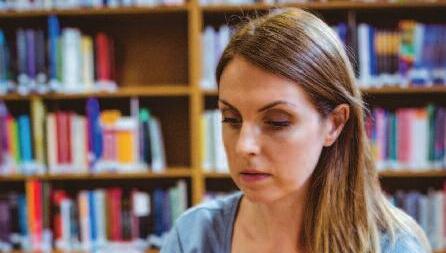
t: +353 61 204358
e: Caroline Coyne@mic ul ie
Programme overview
the Master of education degree programme in religious education (re) is a two-year, part-time programme providing an opportunity for advanced study in the foundations, pedagogies, critical perspectives, contemporary issues and research in the field of religious education. the programme enables participants to reflect critically and creatively on the application of these insights to a variety of educational contexts and the evolving landscape at primary level.
the programme is designed for teachers and educators who want to augment their understanding of religious education in the contemporary classroom and become re leaders in their schools. It offers a variety of experiences to build knowledge, competency and skills in religious education, framed within the primary level context
students will undertake seven taught modules and complete a dissertation
Modules include: religious education: approaches, Policy and Contexts; religious education and InterBelief dialogue; religious education and the search for god; scripture and the sacraments; the Christian Vision of the Human Person and its Implications for education; New testament Christology and Principles and Practice of research in education
applications are welcome from teachers and educators who are interested or involved in religious education across a variety of educational settings
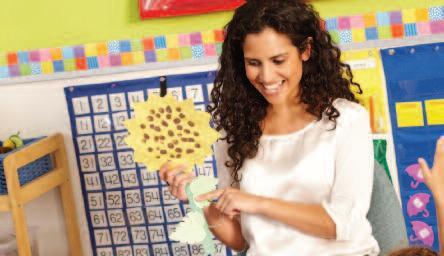
Assessment Modes assessments will include: essays, portfolios, online exercises, discussion fora and a dissertation
special Programme Features
the programme will be offered on campus at MIC Limerick It will be offered on a part-time basis, with classes scheduled on evenings and some weekends the programme will be delivered through face-to-face and some blended learning components
career opportunities
this programme provides a qualification for those who may aspire to a leadership position in the primary level sector and will be of particular interest to classroom teachers, religious education coordinators, school principals, policy makers and those engaged in the provision of continued professional development in the area of religious education.
religious education is a key issue in the changing educational landscape. this programme will serve to supplement the knowledge and understanding of those with responsibility for leadership in religious education in a variety of settings, for example, Board of Management members, diocesan advisors and those involved in other professional and pastoral contexts
duration 2 Years (Part-time)
Fees For up-to-date information please see www.mic.ie/fees
entry requirements applicants should hold a First or second Class Honours undergraduate degree (Level 8, NQF) in a relevant or cognate discipline and/or have evidence of relevant experience and extensive prior learning in the discipline
How to Apply
For programme specific application details please go to: www mic ie/postgraduate
closing date for general application deadline is 31 May Applications see www mic ie/postgraduate for programme specific application deadlines
contact details dr Fiona dineen
Programme Coordinator
t: +353 61 204930
e: Fiona dineen@mic ul ie Or
education office
t: +353 61 204355
e: edPostgrad@mic ul ie

Programme overview
on the Ma in education and the arts (Meta) students examine a range of practices in the arts and education they also interrogate related concepts such as creativity, imagination, aesthetics, form, process, community, transformation, diversity and performance
the programme provides a broad-based training in (arts) education research methodologies students complete two research projects: a small-scale project in Year 1 and a larger scale project in Year 2
Meta is designed for:
• artists working (or intending to work) in educational contexts;
• teachers (primary and secondary) interested in the arts; and
• arts/education policy makers and administrators
Assessment Modes
assessment is by means of essay, oral presentation, performance, resource pack, project, written dissertation (or equivalent)
special Programme Features
attendance at shows in the Lime tree theatre and Belltable theatre
• attendance at events in other city arts venues
• Week-long summer school (at the end of Year 1)
career opportunities
• teacher and artist engagement in teacher-artist partnership projects;
• artist residencies in a range of educational contexts
e g prisons, health, community education, youth arts
• teacher and artist engagement in Creative Ireland initiatives;
• teacher special duties’ posts as arts education co-ordinators; and
• teacher involvement in the design and delivery of local and national CPd programmes
duration 2 Years (Part-time)
Fees
entry requirements

When embarking on the Meta programme I was unsure what to expect as a musician and music educator, I have always had a broad appreciation for the arts, and so I felt that this programme offered the perfect opportunity to explore and nurture this appreciation as it transpired, Meta was not only a way of learning about the arts, but a way to experience them
taught by some of the most open, progressive and passionate individuals I’ve met, it was a genuinely transformative experience By engaging with various artsbased experiences over the duration of the programme, Meta has encouraged me to question established perceptions of our society and culture My participation on the programme has also inspired me to pursue a Phd in arts education at MIC
How to Apply
For up-to-date information please see www mic ie/fees
2 2 degree (at Level 8) with a major component in education, visual art, music, drama, dance, creative writing or film applicants with a degree major in other disciplines, with substantial relevant experience in the arts and education, may be considered. other applicants with substantial relevant experience may also be considered acceptance under these latter categories may be subject to an interview and/or portfolio submission
For programme specific application details please go to:
www mic ie/postgraduate
closing date for this programme will not run in Applications 2023/2024
see www mic ie/postgraduate for programme specific application deadlines
contact details dr dorothy Morrissey
Programme Coordinator
t: +353 61 204521
e: dorothy Morrissey@mic ul ie
Programme overview
the Master of arts in steM (science, technology, engineering and Mathematics) education is a two-year, four-semester, part-time programme offering a focus on integrative and innovative approaches to steM education through exploring socially responsive teaching and research. the programme is intended for teachers and educators to develop their skills as they critique, investigate and disseminate new approaches to steM education, and become steM leaders
Modules include: Key Paradigms in steM education examines the fundamentals of relevant paradigms, learning theories and frameworks with a specific focus on steM education
critical Perspectives and Policy in steM education enhances appreciation of the multi-faceted factors which contribute to equity of access and opportunity based on social class, ethnicity and gender in steM fields.
steM: communications and Industry allows participants to examine and look critically at features of successful steM communication and outreach. the wide diversity of goals, motivations and purposes of public engagement are explored
expanding the Boundaries of steM explores the integration of steM disciplines within and beyond the classroom, using problem and inquiry based learning approaches to more closely align individual steM skills with higher order independent thinking and problem solving
special studies in steM education
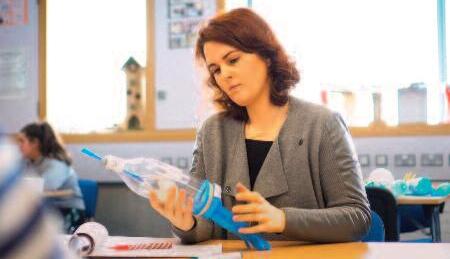
the purpose of the module is to provide opportunities for students to take on the role of steM champions in an educational context beyond the classroom the module will explore the areas of policy development in steM education and support students in locating opportunities for disseminating and enhancing understanding of steM within one of the four pillars of the STEM Education Implementation Plan (2017-2019)
career opportunities
clodagh cleary
MA in steM education
the first-year of the programme was a very practical experience in which we investigated a lot of relevant methodologies and practices in relation to steM as they applied to the classroom. the second year focused on research within the steM field.
the Ma in steM education schedule is very facilitatory and flexible for teachers in full-time positions. In enrolling on the programme, I have experienced a friendly and research-orientated atmosphere. the relatively small class size, coupled with how receptive the lecturers are in sharing their seemingly unquantifiable knowledge, ensured that assignment deadlines were met with ease I would highly recommend partaking in this programme, and I strongly feel that the Ma in steM education will continue to be invaluable to my teaching
the programme is intended for teachers and educators who want to develop their skills as they critique, investigate and disseminate new approaches to steM education, and become steM leaders in their workplaces
duration 2 Years (Part-time)
Fees For up-to-date information please see www mic ie/fees
entry requirements applicants should be holders of a First or upper second Class Honours undergraduate degree in a relevant or cognate discipline and/or have evidence of relevant experience and extensive prior learning in the discipline How to Apply For programme specific application details please go to:
www mic ie/postgraduate
closing date for general application deadline is 31 May Applications see www mic ie/postgraduate for programme specific application deadlines
contact details dr aisling Leavy
Head of department
t: +353 61 204978
e: aisling Leavy@mic ul ie
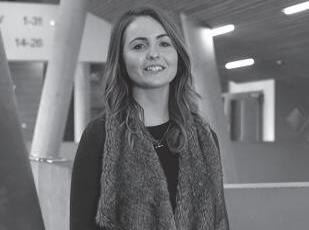
Programme overview
MIC’s department of arts education and Physical education, in association with the department of Music, offer this specialised Masters in Music education. the degree involves an exploration of music teaching and learning processes from a range of social science perspectives and involves interdisciplinary studies in education, music and other related fields.
this blended learning programme is suited to anyone with an interest in Music education, including teachers (at primary, post-primary and music school/college levels); policymakers; community/outreach workers; curriculum support personnel; and professional/ community musicians
topics taught include: philosophy, sociology and psychology of music education; creativity; music education projects and policies; theories of music performance; music education in schools and communities; social justice and music education; musical participation; and musical meaning

a variety of assessment modes are engaged with including essays, a practicum, reviews, programmes of work and a final dissertation.
this programme is provided through a mix of online and on-campus teaching. It is offered on a one-year full-time or two-year part-time basis and requires completion of six modules and a dissertation Full-time students take one extra module in Year 1, semester 1
Career opportunities open to graduates include working as music education practitioners, teachers, community musicians, music coordinators, policymakers and curriculum support workers
duration 1 Year (Full-time); 2 Years (Part-time)
Fees For up-to-date information please see www mic ie/fees
entry requirements
applicants will normally hold either an honours primary degree with Music along with a postgraduate qualification in education or an honours primary degree in education with Music applicants with equivalent, appropriate qualifications along with relevant professional experience may also be considered on a case by case basis
How to Apply
the Masters in Music education at MIC provides an excellent platform to immerse yourself in the research behind why we do what we do as music educators and advocates for music education the programme covers a broad range of topics and is an excellent way to develop your writing from a critical thinking perspective there are a wealth of additional opportunities to attend workshops, seminars, talks and present your own work at music education conferences that you may not get the opportunity to otherwise
the programme lecturers are invested in you and offer a level of support that is difficult to find in other Ma programmes I would encourage anyone considering a Ma in Music education to take the leap of faith and go for it
For programme specific application details please go to:
www mic ie/postgraduate
closing date for this programme will not run in Applications 2023/2024.
see www mic ie/postgraduate for programme specific application deadlines
contact details dr ailbhe Kenny

Programme Coordinator
t: +353 61 774721
e: ailbhe Kenny@mic ul ie
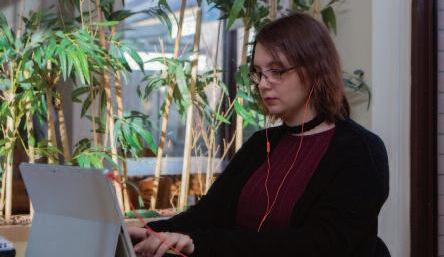
this programme endeavours to promote the development of research, critical thinking and communication skills among participants in the promotion of literacy in schools. In line with national and international recommendations, this programme seeks to promote literacy leaders within schools and communities whose literacy knowledge reflects the highest standards of academic rigour this flexible programme enables participants to complete a Masters in Literacy education within two years on a part-time basis or to achieve a doctorate in Literacy education in four to six years on a part-time basis
on completion of Year 1 of the programme participants may complete a Masters dissertation in Year 2 or alternatively opt for the Phd route for a further threefive years the core literacy modules in semester one will explore the nature of literacy in the 21st century and provide foundational knowledge on literacy acquisition and diversity the focus of the core literacy modules in semester two will be the promotion of inclusive literacy practice, literacy difficulties and literacy leadership
Participants’ learning on this programme will be facilitated through a range of blended learning approaches involving online and on-site delivery. the on-site commitment will include attendance at an orientation meeting early on in september and on four saturdays throughout each semester from 9 30am–5 00pm, while the online component will require a commitment on four Friday evenings (6 00pm-9 00pm) to further reading, directed tasks and participation in some group activities
the programme will be of particular interest to classroom teachers, literacy leaders, school principals, speech and language therapists, adult literacy coordinators, librarians, policy makers and those engaged in the provision of continued professional development in the area of Literacy education
duration 2 Years (M ed); 4 Years minimum (Phd)
Fees For up-to-date information please see www mic ie/fees
entry requirements
How to Apply
Choosing this programme was an easy decision, as it provided me with the ideal platform to explore literacy developments and all it facets along with guidance and opportunities to improve my practice as a primary school teacher and literacy advisor the programme explores seminal and contemporary developments in the field of literacy education additionally, I am accumulating the research, analytical and argumentation skills necessary to formulate, conduct as well as report independent pieces of research Lecturers on this programme are extremely knowledgeable in their chosen fields, patient and supportive.
Please see www mic ie/postgraduate
For programme specific application details please go to:
www mic ie/postgraduate
closing date for general application deadline is 31 May Applications see www mic ie/postgraduate for programme specific application deadlines
contact details
dr Josephine Brady Programme Coordinator
t: +353 85 8702647
e: Josephine Brady@mic ul ie

Programme overview
You will join a programme designed in line with best international practice in doctoral education and research, and share classes with students from diverse backgrounds in education. You will enjoy excellent facilities and have an opportunity to avail of very attractive funding schemes
Assessment Modes
a balance between taught and research components is a hallmark of the programme. You will be guided through a set of modules and design, conduct and write an original and rigorous research thesis.
special Programme Features
Blended learning through Moodle will be used to support students throughout the programme
career opportunities
there are numerous career opportunities that are available to graduates of the structured Phd in education the most common is the access to teach and work in Higher education where a Phd is often required as a minimum qualification additionally, it provides a useful qualification to progress leadership roles within a variety of educational institutions and schools
Bridget Flanagan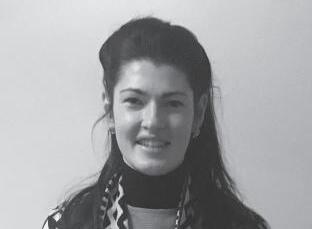
structured Phd in education
I chose this programme as I wanted to enhance my skills as a researcher and as a teacher I wanted to examine my teaching from the perspective of what I was doing and why I was doing it I am working while studying and it does call upon your time management skills, but as I am pursing a field of study I love, I find it is manageable
the structured Phd in education at MIC was recommended to me by students who had previously studied on the programme they could not praise highly enough the support students received and the extensive opportunities given to students to engage with education practitioners from all over the world through winter and summer schools, and conferences.
excellent research supervision and mentoring, funding and career development support schemes, all contributed to my decision to choose this Phd programme at MIC.
duration
4 Years (minimum)
Fees For up-to-date information please see www mic ie/fees
entry requirements applicants will normally hold a Masters degree in education, or a minimum of 2 1 Honours degree in education, a Higher diploma or a graduate diploma in education, or a cognate discipline applicants who hold a 2 2 Honours degree, a Higher diploma, or a graduate diploma in education or a cognate discipline will be considered but will be required to undertake Mr5000 details for potential applicants without these qualifications are outlined at www mic ie/postgraduate
How to Apply
For programme specific application details please go to: www mic ie/postgraduate
closing date for general application deadline is 31 May Applications see www mic ie/postgraduate for programme specific application deadlines
contact details dr emmanuel o’grady
Coordinator taught Postgraduate Programmes
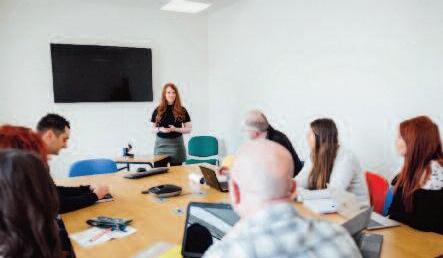
t: +353 61 204 340
e: emmanuel ogrady@mic ul ie
Programme overview
the doctorate in educational and Child Psychology (deCPsy) is a three-year, full-time professional training programme for candidates interested in pursuing a career as an educational psychologist this programme equips candidates with the necessary competencies to work in a range of autonomous and collaborative professional roles that are performed by educational Psychologists (ePs) in a variety of contexts and with a range of client groups
In addition to taught modules delivered over the first two years of the programme, a variety of workshops are organised for students and delivered by experienced practitioners.
Professional placements, totalling over 300 days, are organised in a variety of settings, for example, Hse psychological services and school psychology services. students are required to complete a research thesis.
Assessment Modes
a variety of assessments are utilised on the deCPsy programme these include objective structured Professional assessments (osPas), Video enhanced reflective Practice (VerP), essays, presentations, systematic reviews, reports, portfolios and case-based learning outcomes
special Programme Features the programme utilises approaches to learning that are problem-based and collaborative students will be provided with opportunities to construct knowledge in an active, collaborative manner by working through real-life case studies and examples, linking psychological theory and research to professional practice.
career opportunities graduates develop skills in the application of psychological methods, insights and interventions to work with a variety of clients in diverse contexts. graduates will be eligible to apply for Chartered Membership of the Psychological society of Ireland and for full membership of the division of educational Psychology
duration
3 Years (Full-time)
Fees For up-to-date information please see www mic ie/fees
entry requirements
eoin Harte

My experience on this programme at MIC was a very positive one From the start, it was great to be part of a close-knit group who were supported by dedicated lecturers and the wider MIC community this small group atmosphere allowed for lectures to be delivered in an engaging manner, incorporating methodologies such as problem-based learning and case study analysis In addition to the taught modules, time spent on professional placements with Hse Child disability teams, the National educational Psychological service and Hse Child Psychology settings provided a great learning experience and hands-on training the completion of a doctoral piece of research over the course of the programme afforded an opportunity to develop research skills and greater knowledge in an area of interest I would recommend this programme to anyone interested in pursuing a career as an educational and Child Psychologist
By the closing date, applicants must have:
1 a minimum upper second class honours (2 1) degree in Psychology or an equivalent qualification, recognised by the Psychological society of Ireland or equivalent, as conferring eligibility for graduate membership
2. an equivalent of two years relevant full-time experience working in the field of education or Psychology, or both is required short-listing of applicants for interview normally occurs. the selection panel will pay attention to the academic and personal suitability of applicants
How to Apply For programme specific application details please go to: www mic ie/postgraduate
closing date for application deadline is 31 January Applications
contact details
Caroline Coyne
Coordinator taught Postgraduate Programmes
t: +353 61 204358
e: Caroline Coyne@mic ul ie
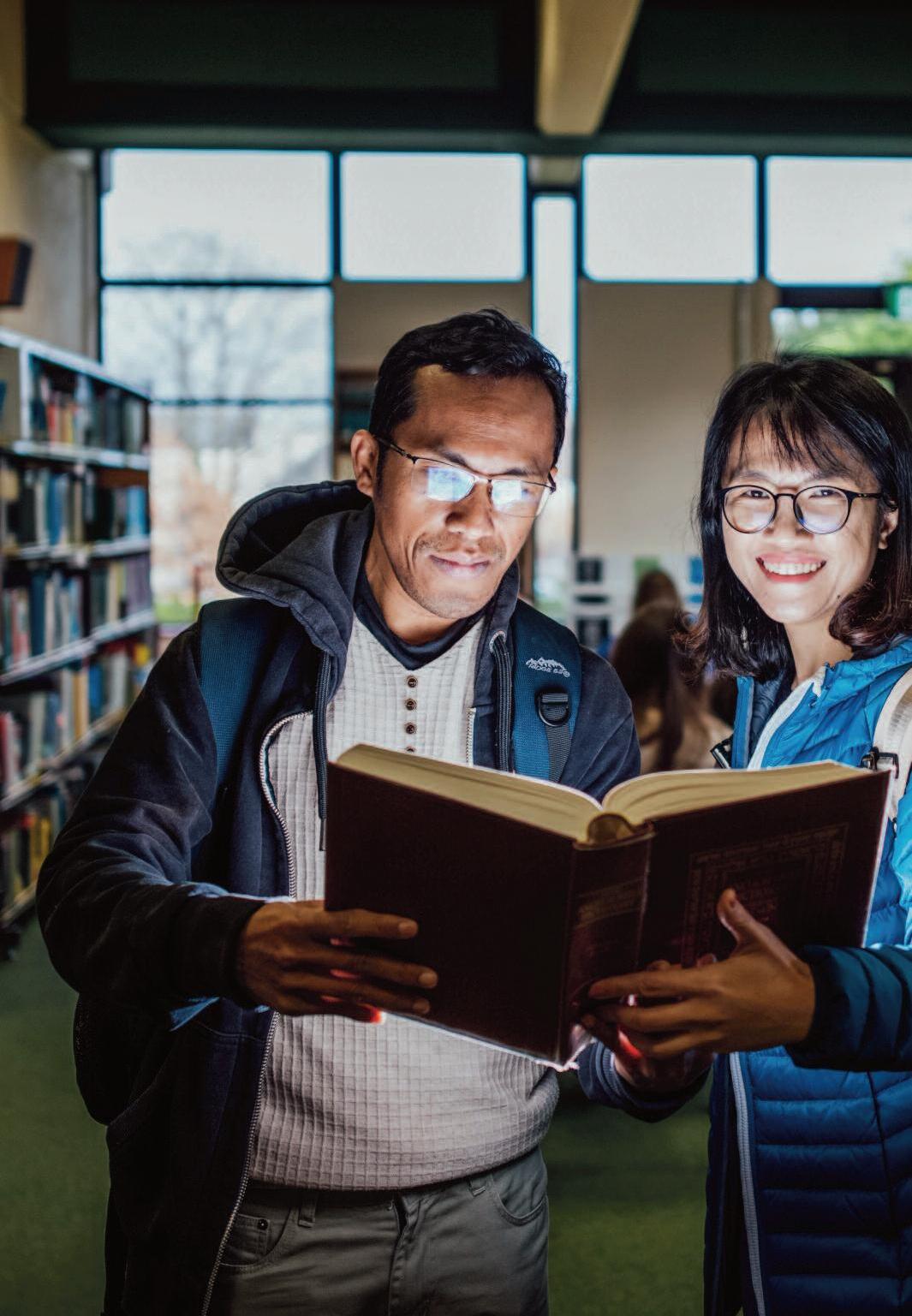
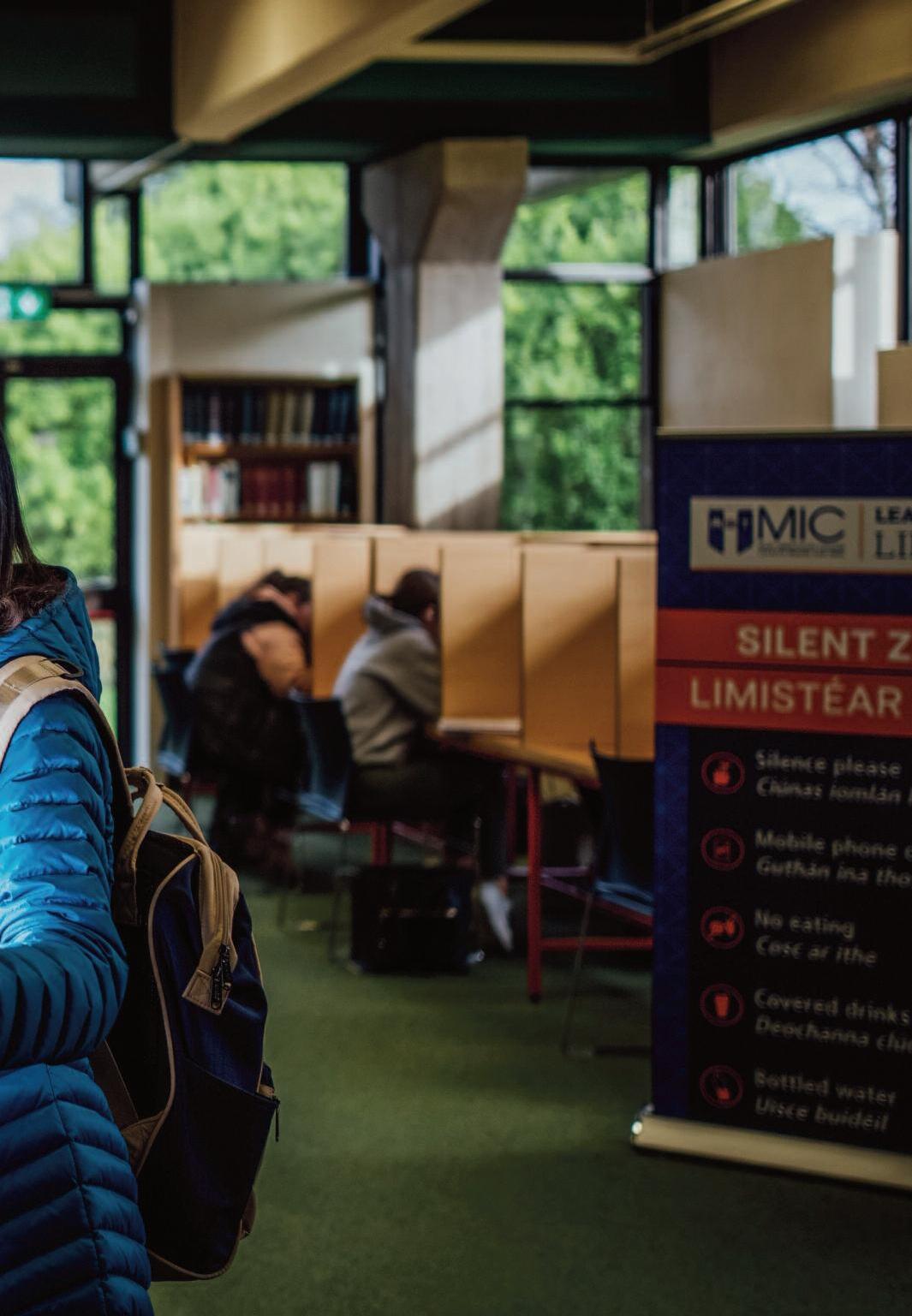
the access and disability office coordinates the services available for access students and student with disabilities
Prospective students from under-represented groups in third-level, including socioeconomically disadvantaged students, students from a minority background, students with a disability, and mature students are encouraged to contact the access/disability officer to become familiar with the supports available. the office is located in g01 on the ground floor of the Foundation Building at MIC Limerick.
overvIeW oF tHe Access
And dIsABILIty servIce:
Pre-entry advice and information for prospective students on access issues.
dAILy droP-In suPPort
Personal support for students facilitated by an open door policy Information, advice and advocacy assistance provided, where appropriate Provision of college related practical supports such as an access Book Library scheme
needs AssessMents
evaluation of students’ needs to determine the supports that may arise because of a disability or significant on-going illness all students with disabilities, regardless of their admission route, are encouraged to meet with the access/disability officer.
tHe QuIet Zone
a number of Quiet Zones have been created around the Limerick Campus to support the health and well-being of students. our sensory room is located in t101B and we have two silent Booths, one outside the su office in the tara Building and the other outside the Library
tHe AssIstIve tecHnoLogy rooM MIC has opened an assistive technology room, complete with technology designed for use by people with a range of disabilities, so that more students can access college programmes without barriers. the assistive technology room has height adjustable desks and desktop computers with software to accommodate students with literacy, processing, physical and sensory difficulties students using the assistive technology room will be assessed to establish their needs and trained to use the right technology to become more independent learners
FInAncIAL AssIstAnce
Information on the student assistance Fund and other sources of financial assistance available to eligible students to help with costs of attending college
Please visit www mic ul ie/study-at-mic/ access-disability for more detailed information or t: +353 61 204927/204510
e: accessoffice@mic ul ie
students at MIC thurles are encouraged to contact Paula Hourigan in the first instance: room P124 (First Floor)
t: +353 504 20535
e: Paula.Hourigan@mic.ul.ie
the College has a full-time Chaplaincy service, which works in close cooperation with other student support services on the College's campuses the Chaplaincy team is here to help any member of the College community to survive, develop their full potential and enjoy their years in college. the Chaplaincy service is available to and welcomes students and staff of all faiths and none If you wish for some help and you ask, the team is willing to help you with the ups and downs of college life
the role of the Chaplaincy service is to provide a supportive and challenging environment that fosters a spirit of inclusiveness on campus: valuing spiritual and cultural diversity and offering a chance to live and think through one’s faith. the service networks with other agencies, which promote holistic development and a sense of justice for all.
the Chaplaincy team strives to promote the spiritual development of the entire College community, staff and students. the team facilitates the discussion of social, spiritual and theological issues. It is possible to discuss issues of concern in confidence
the College Chaplain, Fr Michael Wall, provides religious services, according to the roman Catholic rite, in the College Chapel arrangements are in place to provide services for non-Catholic students
the Chaplaincy service strives to support students during times of bereavement, illness and during occasions of personal or family upheaval We also honour students’ joys and celebrations. We do fun things as well in cooperation with the students' union and various societies. don’t miss our coffee mornings and evenings!
opportunities for faith sharing exist for those who wish to avail of them. the Chaplaincy team will arrange retreats and pilgrimages for students wishing to partake in such spiritual exercises
Mass is celebrated in the MIC Limerick Chapel daily the College Chapel and the Meditation room (behind the Chapel) are always open to students who wish to pray, reflect or just be in a quiet place the Chaplaincy service also provides a symbol free meditation room in g33B. this is available for prayer to those who desire such a space
You are welcome to drop into the Chaplaincy room (t 1.08) at any time. It is a relaxed, comfortable, friendly and social community space. You may come in to socialise, to have a cup of tea or just to meet other students.
In each semester two third year Bachelor of arts students take up work placements with the Chaplaincy team Being students themselves, they can easily empathise with your
needs and concerns. these students are based in the Chaplaincy room
contact details:
MIc Limerick
Fr Michael Wall
t: +353 61 204331
e: Michael.Wall@mic.ul.ie
e: Chaplaincy.team@mic.ul.ie
MIc thurles
MIC thurles also has a vibrant Liturgy team that organises various Liturgical celebrations during the academic year, including programmes for the preparation of extraordinary eucharistic Minister and Lector
Further Information:
Fr Joe Walsh
Chaplain
t: +353 86 7714888
e: Joe Walsh@mic ul ie
Fr Joe Walsh is available on campus on Monday, tuesday, thursday and some Wednesdays from approximately 11 00am to 2.30pm. He is also available for emergency contact
all postgraduate programmes incur a non-refundable application fee of €50
AccePtAnce Fee
Prospective first-year postgraduate students are invited to pay a pre-registration acceptance fee of €500 (eu) / €1,000 (Non eu) as an expression of strong interest this fee will be offset against programme fees for that academic year this fee is only refundable if the programme does not run
Please refer to www mic ie/fees for exact individual programme fees for the current academic year Fees may be subject to change from year to year Fees quoted are all per annum fees. For more information on Noneu fees please visit the ‘eu/Noneu assessment’ section at www mic ie/fees
PAyMent dAtes
Fees may be paid in full at the beginning of each academic year.
alternatively, fees may be paid in two tranches, the first instalment at semester 1 registration and the second instalment at semester 2 registration a Financial Payment Plan is available for eu students who are experiencing financial difficulties a Financial Payment Plan allows for payment of the academic year fees over eight equal monthly instalments from september to
april Financial Payment Plans incur a non-refundable set-up fee to request a payment plan please email studentFees@mic.ul.ie
International students may be required to provide evidence of payment of programme fees as part of a VIsa application so payment dates and amounts may vary from details listed above. Please visit www mic ul ie/international for further information
PAyMent MetHods
the quickest and easiest method of paying your programme fees is through your student Portal alternatively fees can be paid through the automated system or by bank transfer For full payment method details visit the ‘Paying your fees’ section at www mic ie/fees Cash or cheque payments are not accepted
students are advised to familiarise themselves with the Fees regulations Full terms and conditions, including refund information, can be found at the ‘regulations & registration’ section at www.mic.ie/fees
grAnts
Mary Immaculate College has a range of initiatives for incoming and current students to provide financial and academic support to aid students in pursuing further study. For further information on supports available visit:
scholarships: www.mic.ul.ie/scholarships
student Assistance Fund: www.mic.ul.ie/study-atmic/access-disability
state grants: grant applications can be made at www susi ie
tAx reLIeF
Full and part-time students may be entitled to tax relief on tuition fees applications for tax relief on programme fees paid must be made directly by the student to the revenue Commissioners at www revenue ie students can access and print receipts directly from their student Portal account.
Further Information:
e: studentFees@mic.ul.ie
e: studentgrants@mic ul ie
Mary Immaculate College provides a professional counselling service available to all students, free of charge during the academic year. We offer both on-campus and online therapy sessions, tailored to the circumstance and needs of each student. this service provides all students with the opportunity to talk in a confidential setting about any issues which they may not feel comfortable discussing with anyone else a counselling relationship is one of warmth and safety, where a student feels supported and listened to
support is provided for many issues, such as stress, panic/anxiety attacks, crisis pregnancy, eating disorders, bereavement, exam stress, postabortion, depression, relationships, sexual/emotional/ physical abuse, gender issues, bullying, confidence/selfesteem issues, feeling suicidal, family issues, addictive behaviours, and others.
Further Information:
MIc Limerick
dr Paula seth (Mon-Fri)
t: +353 85 8775827
e: Paula.seth@mic.ul.ie
Bríd o'Connell (Mon & tues)
t: +353 89 2342244
e: Brid oConnell@mic ul ie
Nessa Breen (thurs & Fri)
t: +353 86 0664920
e: Nessa Breen@mic ul ie
MIc thurles
Fiona o'dwyer (Mon-Fri)
t: +353 87 9088710
e: Fiona odwyer@mic ul ie
MIC Library, Limerick is situated centrally on campus in the Áras an Phiarsaigh building and is the focus of academic life on campus the o’dwyer Library is situated on the thurles campus. Both libraries provide a comprehensive range of information services and resources to support student learning and research. Library staff members are on hand to provide students with high quality on-demand help, and training in finding and using the information that they need to succeed at college and into their future careers, in a friendly, student centred environment
connect WItH us
MIC Library has a collection of over 170,000 printed books, as well as a growing eBook collection, covering a variety of subjects. It holds over 250 current print journal titles and provides access to more than 50,000 full text journals online. the library on the Limerick campus also houses a primary school textbook collection, an extensive children’s literature collection, and a realia collection in the audio Visual Library, all of which are used by our student teachers while on school placement We also hold a microfilm collection and an extensive collection of box sets and films on dVd all our study spaces are powered, and Wi-Fi is available throughout the libraries
Library facilities and services include:
• Information queries
• Bibliography and reference support
• self-service returns and borrowing
• Information skills programmes
• research skills programmes
• Interlibrary loans
• Photocopying
• group study spaces
the library website is www mic ie/library where you can access all our electronic resources, see our opening hours, check the catalogue for books, check your account and renew loans
Further Information:
W: www mic ie/library
MIc Limerick
t: +353 61 204370
e: Library@mic ul ie
MIc thurles
t: +353 504 20531
e: ruth.talbot@mic.ul.ie
MIC is the first third-level institution in Ireland to be designated a ‘Health Promoting College’ and has had this service in place since 1996. the service aims to promote the health and wellbeing of all members of the College community through policy development, the provision of programmes and activities, and the implementation of specific health promotion strategies. the team includes a student Health Promotion officer and we work together with many of the other services and departments to highlight health-related issues and events
students are welcome to drop in to the office for advice and information on health-related topics, such as healthy eating, physical activity, mental health, quitting smoking, sexual health, and alcohol and other drugs. We stock educational resources that may be useful for students planning for teaching practice and work placement the Health Promotion office is also the campus contact point for the smarter travel Campus national initiative.
examples of services include:
• Meet and train running group; Cookery demonstration;
• Yoga and tai Chi classes;
• safetalk and asIst training (suicide awareness and prevention workshops);
• Physical massage therapy and reflexology;
• Coping with exam pressure activities;
• awareness days/weeks on different health topics throughout the year;
• Mindfulness Meditation classes; and
• 10,000 steps and cycle challenge events
services are provided free or at a low cost to students.
Further Information:
t: +353 61 204922
e: Health.Promotion@mic.ul.ie
the Medical Centre provides an emergency triage service for MIC students We offer a private and confidential service weekdays during term time. It is a triage service for acute illnesses only. students are advised to register with a local gP for the duration of their stay in Limerick or thurles. a list of local gPs is available from the students' union office
Location: room t 307 on the third floor of the tara building opening hours: Monday to thursday 9am to 4pm and Friday 9am to 3pm appointments can be arranged by t: +353 61-204343 or e: Medical.Centre@mic.ul.ie there is a charge of €10 payable by card only
If all the appointments are filled at the MIC Medical Centre, a doctor will see MIC students in the ashdown Medical Centre for a fee of €30 with their MIC student card. Call +353 61 301200 for an appointment
there is no charge for Medical Card/ gP Visit Card and european Health insurance Card holders
Weekend and after-hours service is not provided by the MIC Medical Centre.
However, dr James Fehily, ashdown Medical Centre, will see students out of hours in an emergency t: +353 61 301200
students who need to see a doctor out of hours should contact shannon doc t: +353 1850 212999.
this is a gP service which covers Limerick , North tipperary and surrounding areas.
students who need urgent medical attention should proceed to the accident & emergency department at the university Hospital Limerick which provides 24 hour cover
t: +353 61 301111
MIc thurles
the following gP service is available for students:
dr Liam Collins, Fianna road, thurles
opening Hours: Monday, tuesday, thursday and Friday 9am - 12pm & 3pm - 4 45pm Wednesday 9am - 11 15am
another doctor is on call on Wednesday afternoons
t: +353 504 21155
students should contact shannon doc for out of hours service or in an emergency
t: 1850 212999
the College has a part-time student Parent support service offering practical information, guidance and signposting of services and supports to the following students: students who are parents; expectants students; students experiencing an unexpected or crisis pregnancy.
MIC is the only Irish third-level college with a specific service for this cohort of students, which has been in existence since 2007, supporting expectant students and student parents of all ages and backgrounds. the student Parent support Coordinator (sPsC) provides a confidential and non-judgemental space for students to discuss their queries and concerns, in order to help identify the support(s), guidance or information they require in order to continue and complete their studies. this may include the following:
• academic queries;
• College options (I grades, leave of absence);
• Placement and college related concerns;
• Personal and practical guidance e g financial assistance, social welfare entitlements; childcare issues, unforeseen or changed circumstances;
• signposting and referral to the appropriate student support service or external support, if necessary.
the key objective is to ensure students are aware of, and able to access, all of the supports that are available within MIC and externally. students may access this service throughout their studies. Individual support is available, by appointment, on Monday and tuesday during semester time, and there is a drop-in option on Wednesday mornings for general queries and an informal chat.
Further Information: Nicola Hurley student Parent support Coordinator
t: +353 87 9501160
e: Nicola Hurley@mic ul ie
the Careers service provides information and guidance to undergraduate students and recent graduates in respect of subject choice, postgraduate study and career planning matters services provided include:
• group careers information seminars;
• one-to-one confidential careers advice;
• assistance with postgraduate study applications;
• assistance with employment applications.
Further Information:
Maeve sullivan Careers service Manager
t: +353 61 204307
e: Careers.service@mic.ul.ie
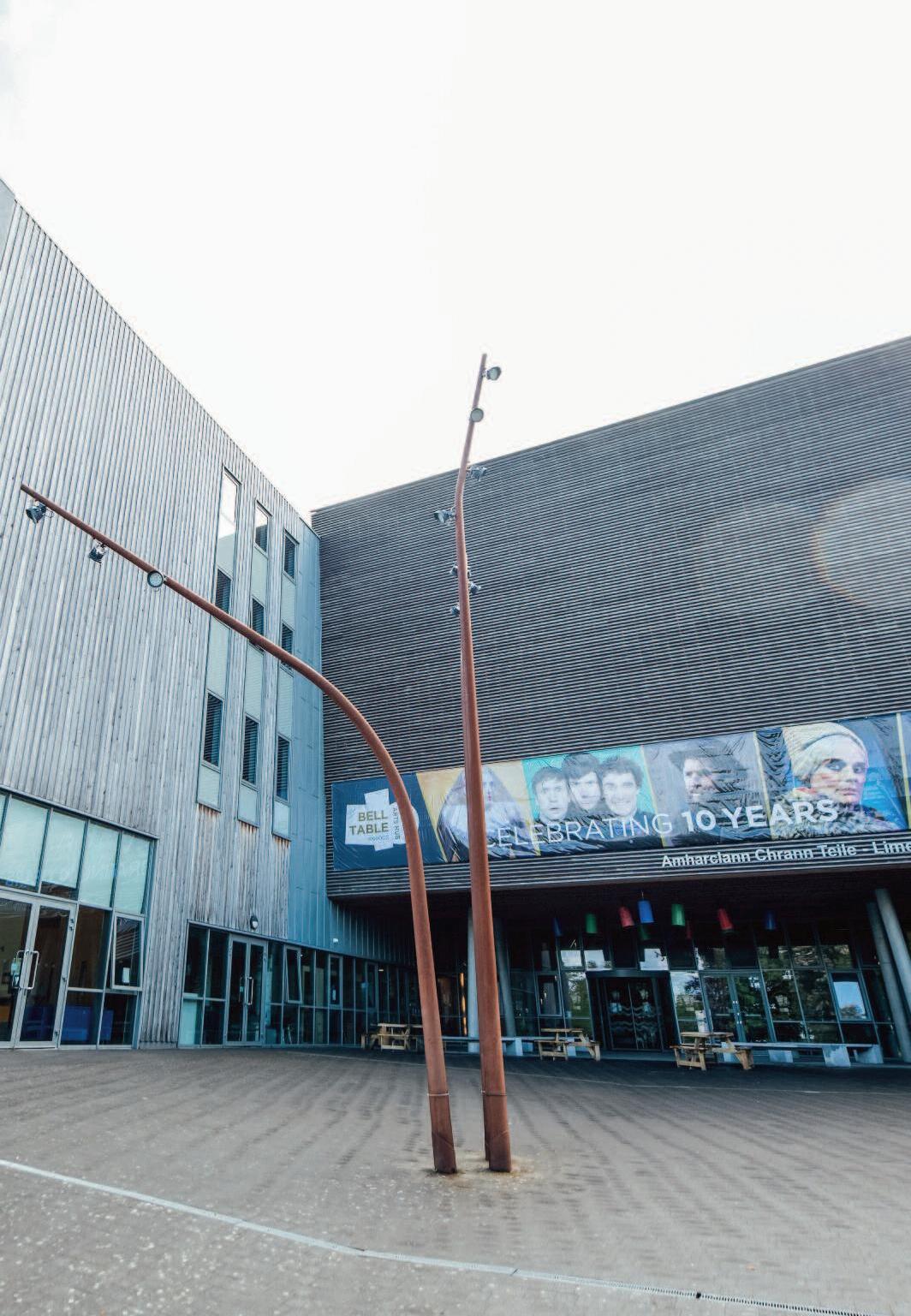
GERARD HOUSE
Ground Floor
M1, M2, M3 Lecture rooms
N1, N5, N6, N7 Lecture rooms
N2 - N4 and N8 Faculty offices
N9 Microscope Lab
N10 & N11 offices
N13 - N14 offices
N15 - N16 geography Laboratories
N17 - N18 offices
N20 - N26 offices
N27 office
N29 - N39 offices
exit to Mount st Vincent’s Building
1st Floor:
N101 research office
N102, N104 and N105 offices
JOHN HENRY NEWMAN CAMPUS
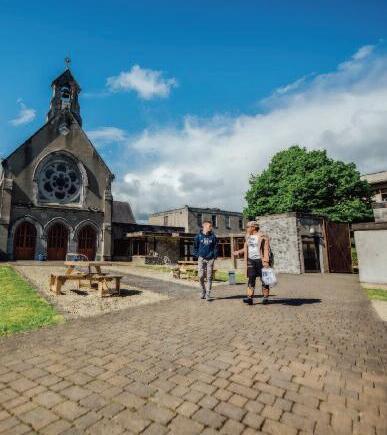
Ground Floor
JHN 16 – JHN 28 rgso
1st Floor
JHN100 – JHN112
LIBRARY BUILDING
Ground Floor: reception/Foyer
Lg1 Library reception
Lg2 Main Library ground Floor
Lg3 Librarian’s office
Lg4 Philosophy/Psychology/ theology room
Lg5 oversize Books/short-term Loan section
Lg6 - Lg8 staff offices
disabled toilets
Lg9 Ceann Córa (Lecture theatre)
1st Floor:
L102 - L111 staff offices
L112 seomra Caidrimh
L113 tV studio
2nd Floor:
L2a storage and office
L203 Main Library 2nd Floor
L203a & b Library offices
L203c & d Library storage Microfilm storage
L204a: 2 Psychology Labs & Focus room
disabled toilet
edit rooms 1 - 4
Viewing rooms
studio
Control room
L205 audio Visual store
L206 office
L207 technician’s office
3rd Floor:
L301 office
L302 Comms room
Library office
4th Floor:
L401 Library acquisitions office
Mount BuildinG
M1, M2, M3 Lecture rooms
TARA
t1
t1
t3.04 Computer Laboratory
t3 05 Computer Laboratory
t3 06 Lecture room
t3.13 Lecture room
t3 14 Lecture room
t3 15 Lecture room
TAILTEANN
First Floor: reception
tN1 teaching gym
staff Changing room (Female)
staff Changing room (Male) toilets (disabled)
Balcony
Kitchenette
aV room
Cleaning store
Weights room
sports offices
Pe office
Ground Floor:
tN2 teaching gym
toilets (disabled) store room
equipment store toilets (disabled)
tN3 sports Hall
tN3 store room
dressing rooms 1-10
sports gear store room
Cleaning store
outdoor equipment store (access from outside the building)
Facilities include:
• Weights room
2 indoor soccer courts
• IBa approved basketball court
• 3 volleyball courts
6 badminton courts
• table tennis tables
• 2 teaching gyms/dance studios
SUMMERVILLE HOUSE
Ground Floor:
sg1 - sg3 Lecture rooms
sg4 storage
sg6 - sg7 Computer rooms
sg8 disabled toilets
sg9 Kitchenette
sg10 Lecture room
sg11 Computer room
sg12 & sg13 Faculty offices
1st Floor:
s101 - s102 offices
s103 - s104 Lecture rooms
s105 office
s106 Postgrad room
s108 Lecture room
s110 disabled toilet
s111 - s114 Lecture rooms
LIME TREE THEATRE
• a 510 seat purpose built theatre
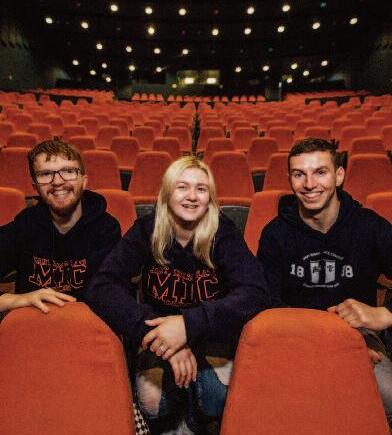
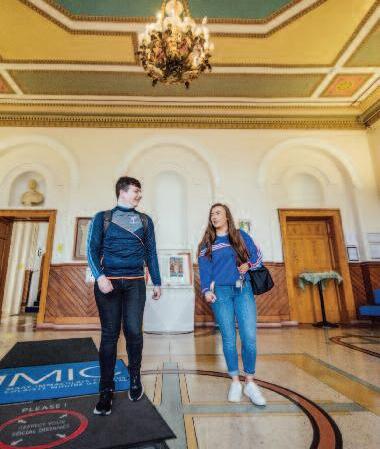

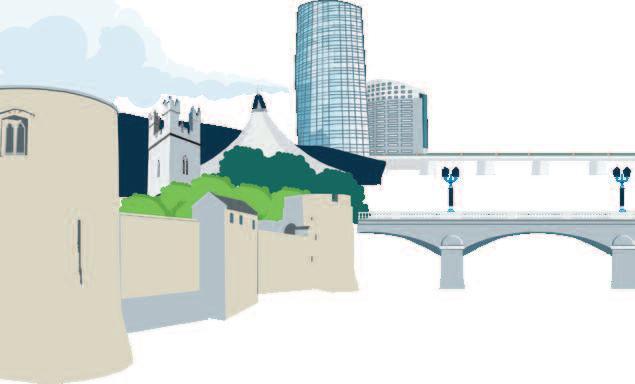
Mary Immaculate College hereby gives notice that the particulars set out in this Postgraduate Prospectus are a general outline intended for the guidance of students and others and do not form part of a legal commitment or a contract all programme descriptions and details are given in good faith and are believed to be correct at the time of printing some changes may be made during the academic Year and may arise as a result of the continuation of Covid-19 students and others should enquire as to the up-to-date position when such information is required While every effort will be made to give due notice of major changes, the College (in conjunction with the university of Limerick), reserves the right to suspend, alter or initiate programmes, examinations and regulations at any time
 THE OFFICIAL GUIDE TO LIMERICK
THE OFFICIAL GUIDE TO LIMERICK